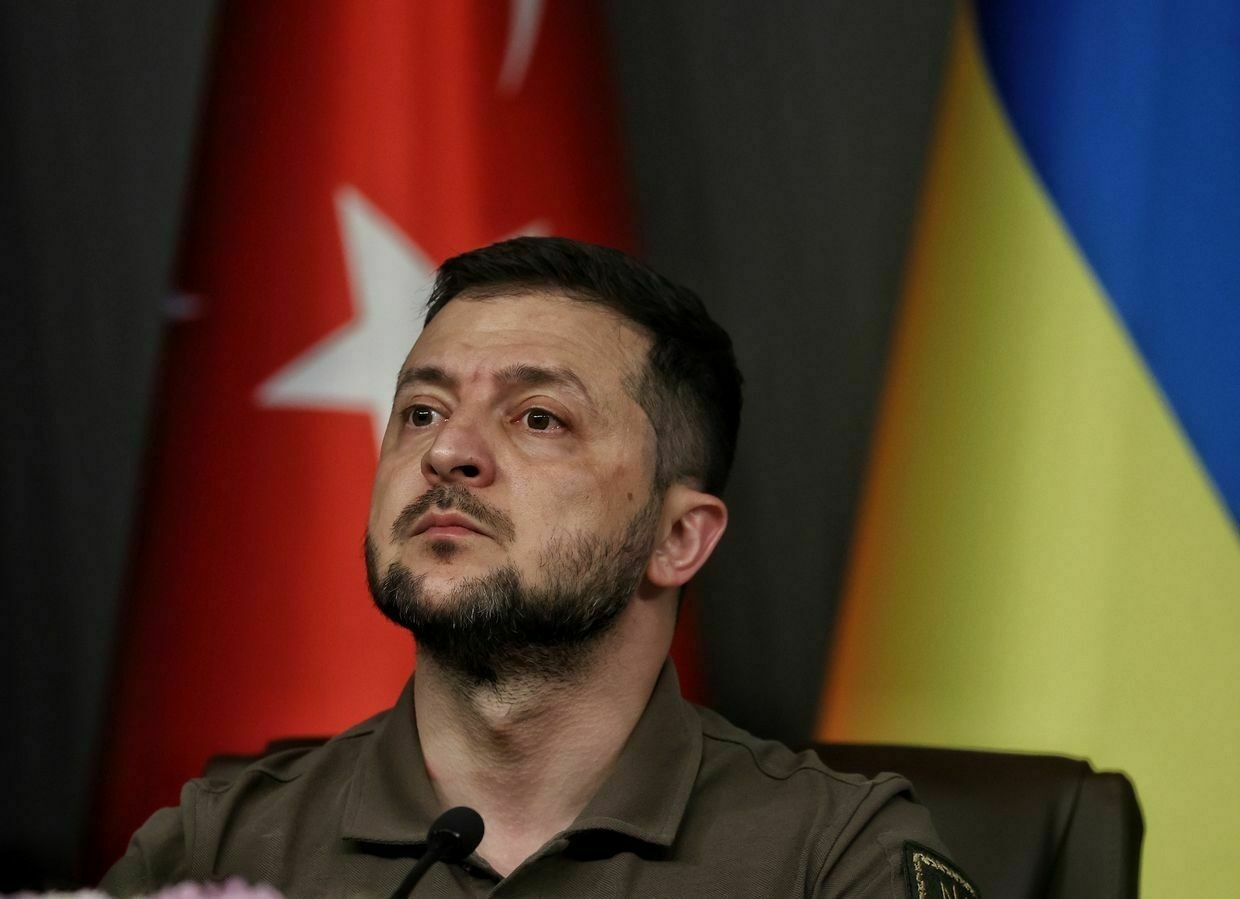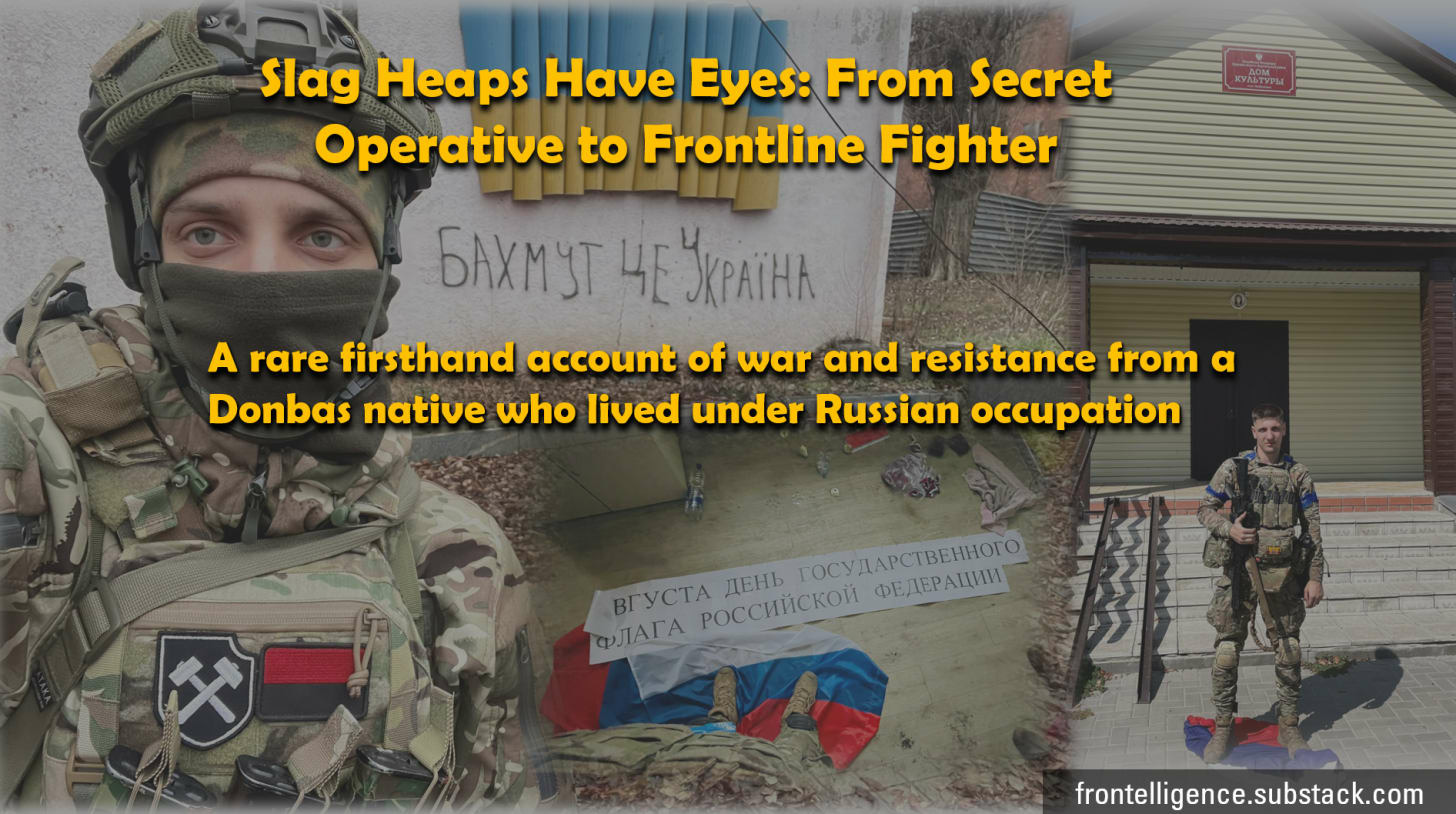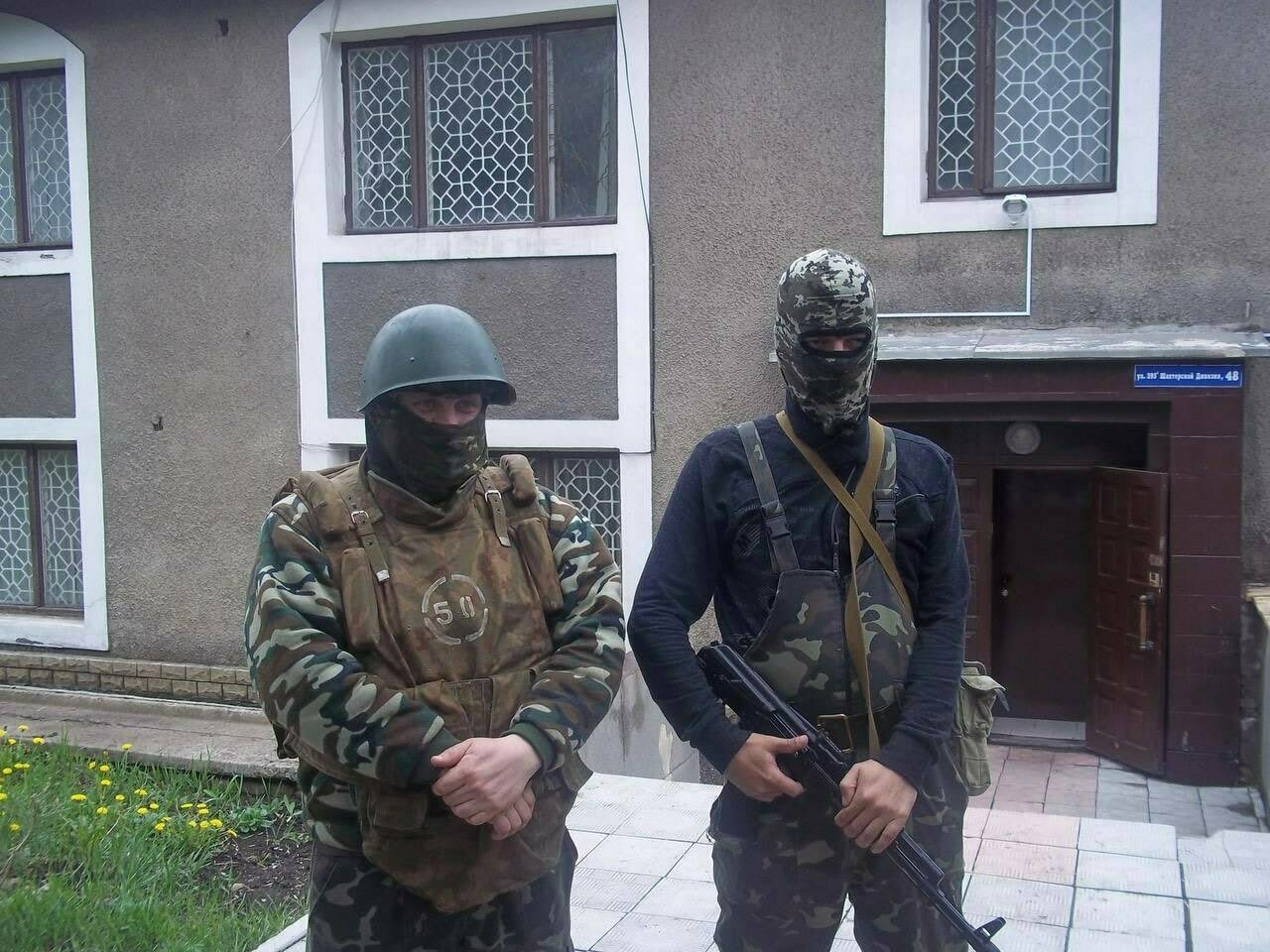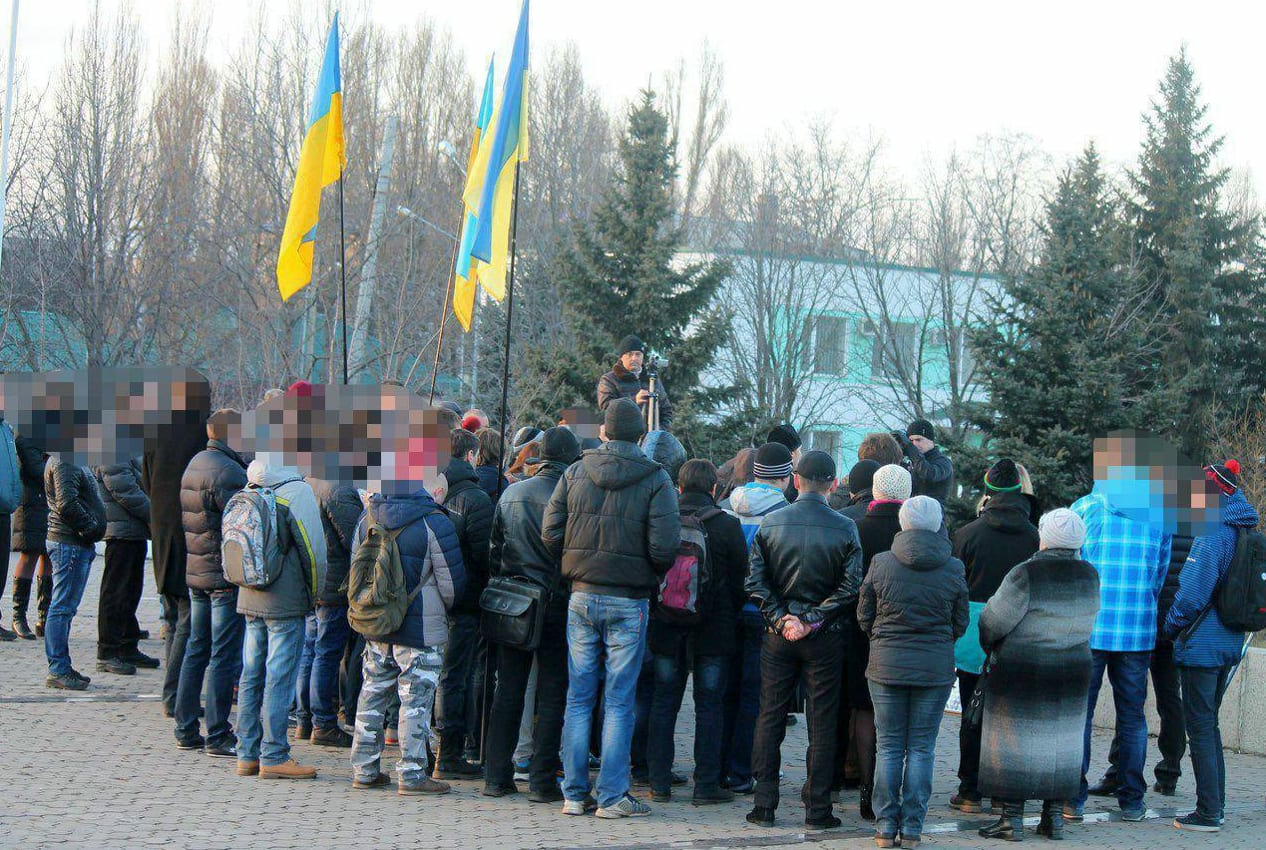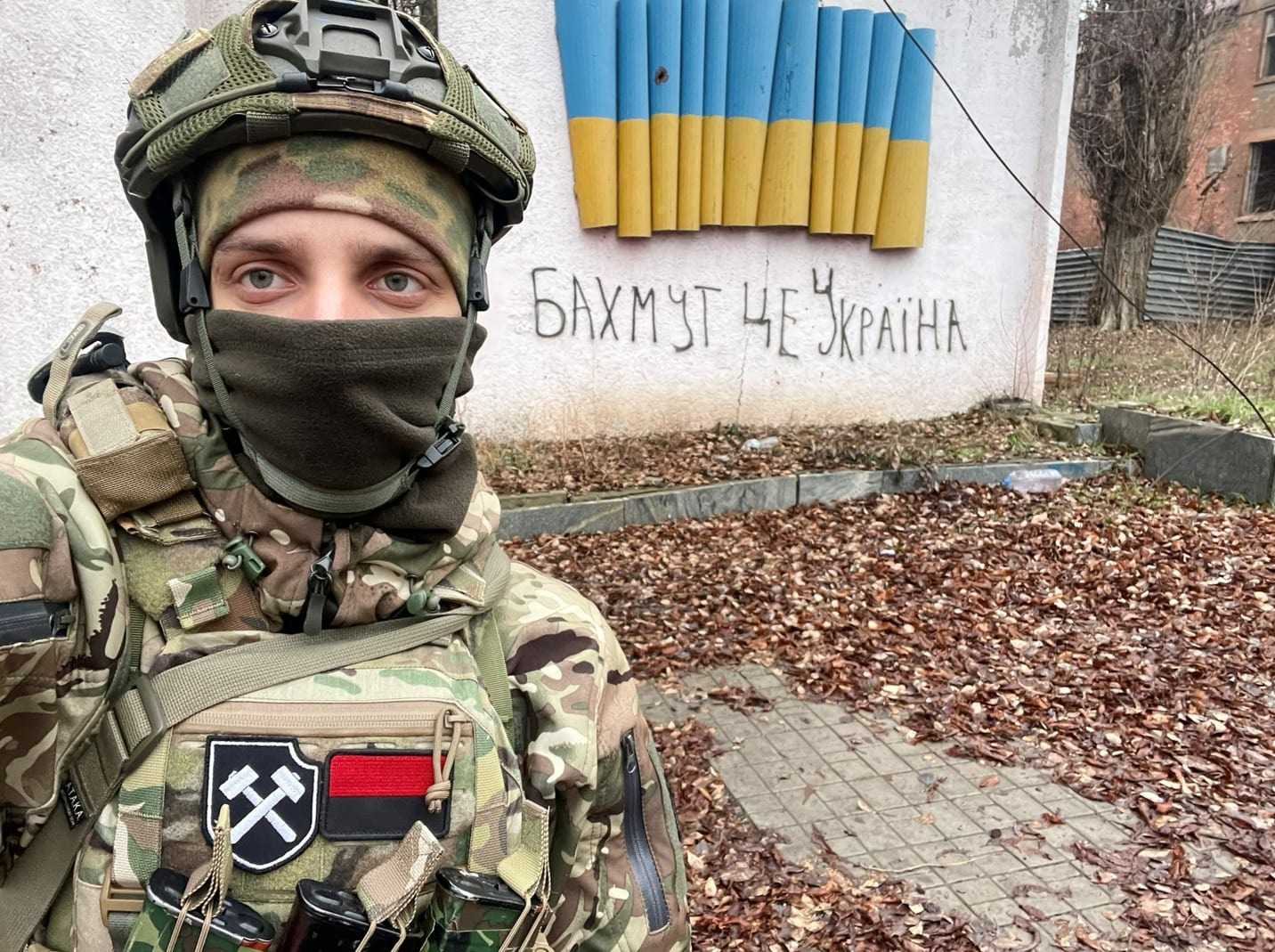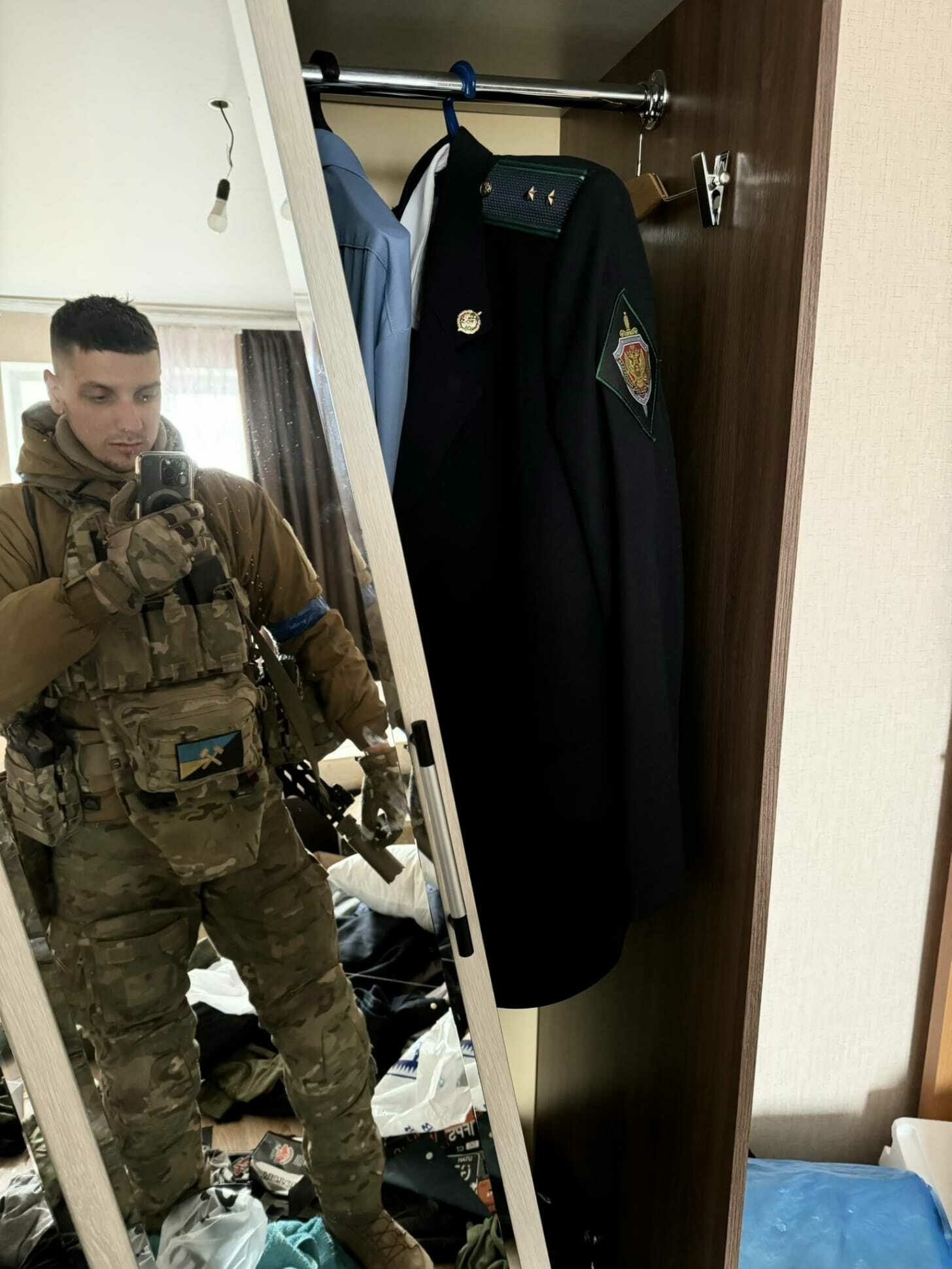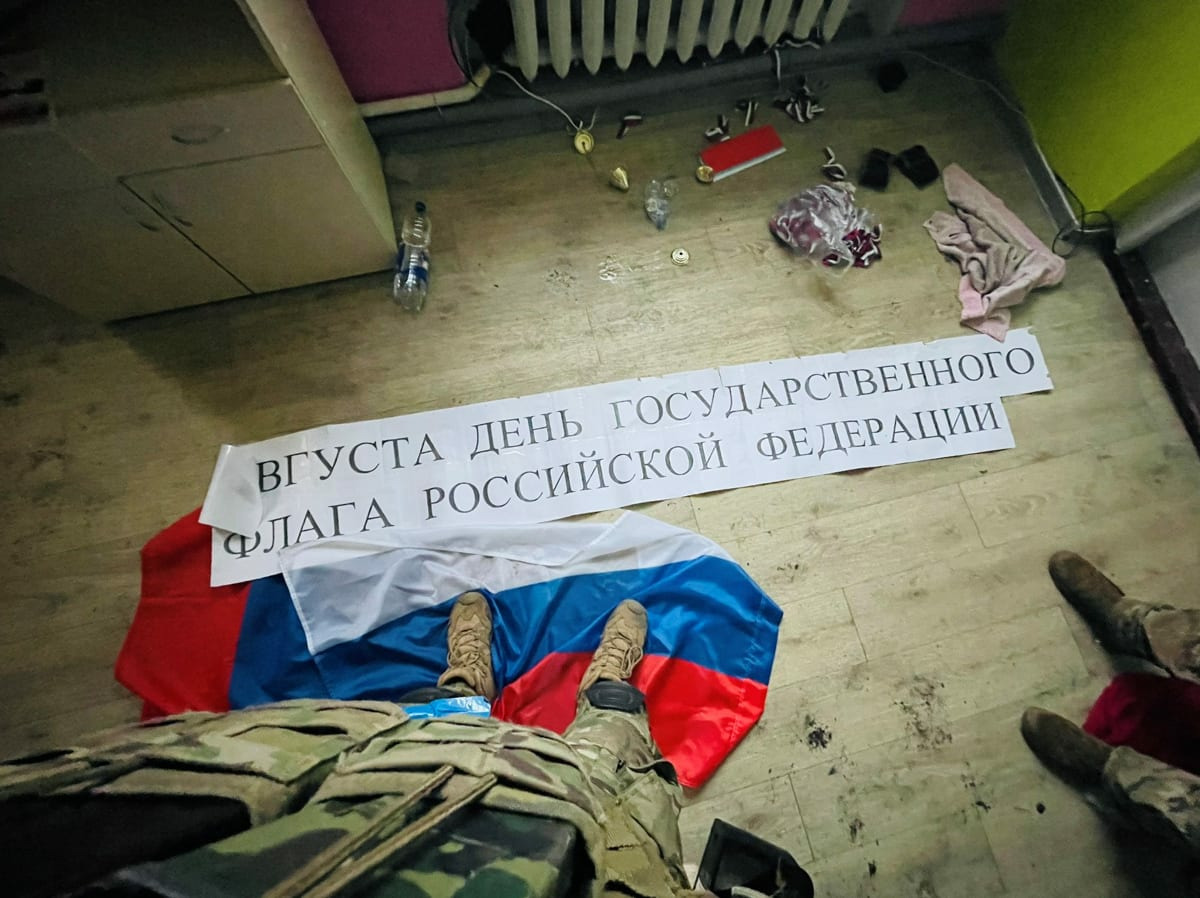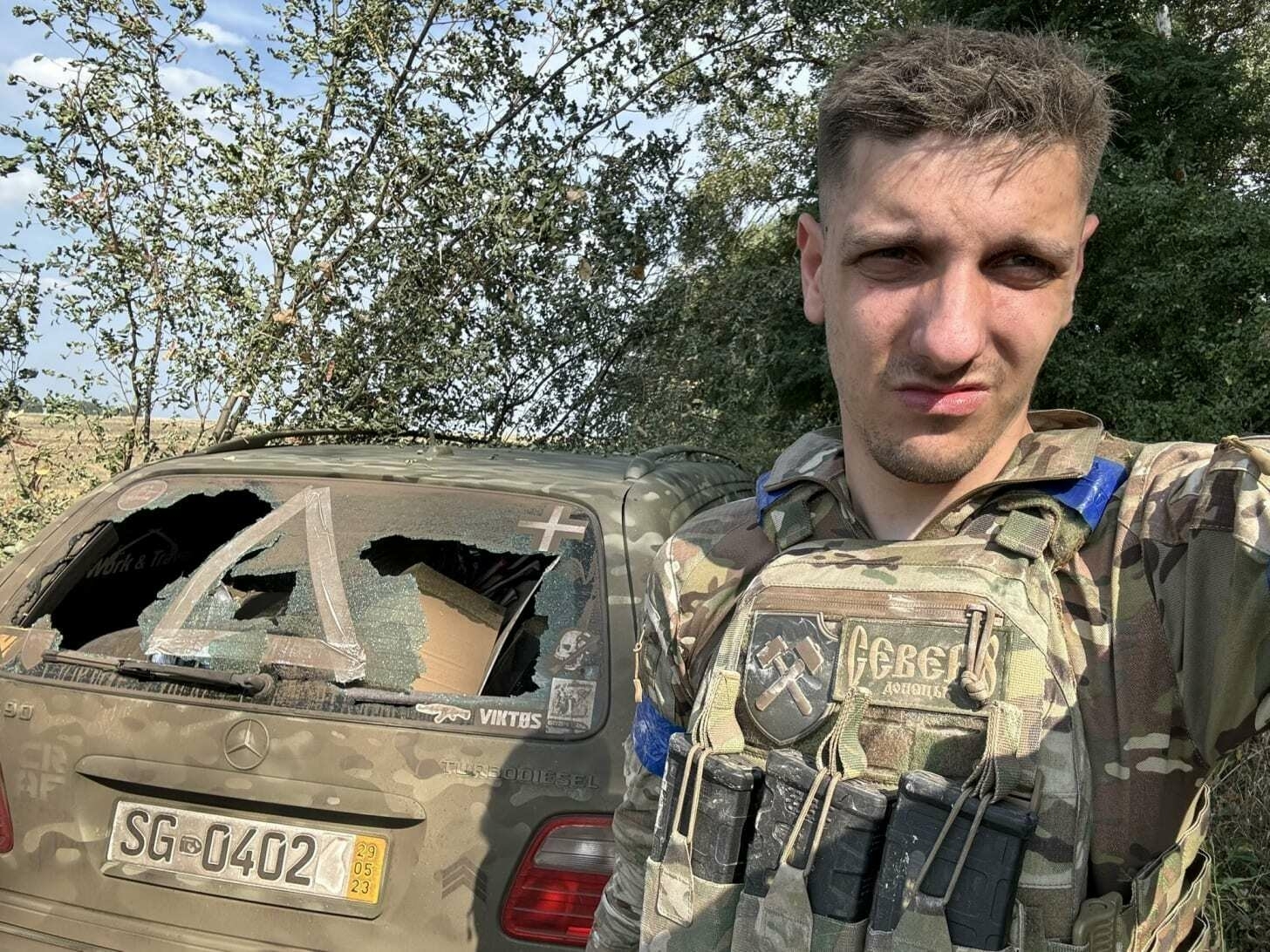-
Serbian police crack down on protestors at mass anti-government rally in Belgrade
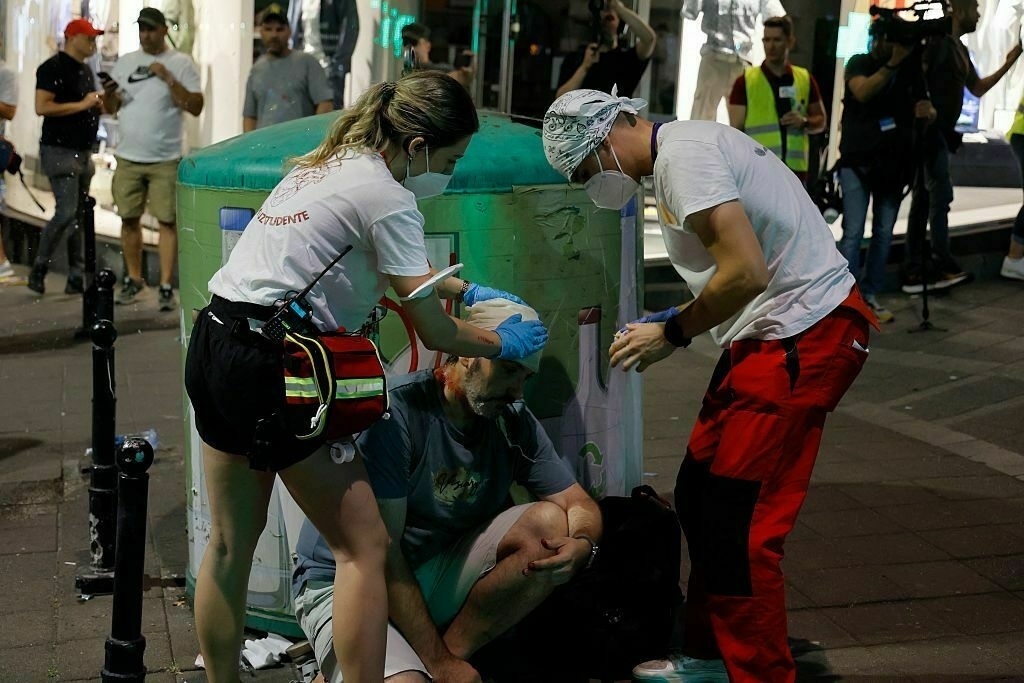
Police aggressively dispersed protestors at an anti-government rally in Belgrade, whereover 100,000 demonstrators gathered on June 28 to demand snap elections.
The rally marks the latest mass action in a protest movement that started last fall, with activists calling for an end to corruption and the 12-year rule of Serbian President Aleksandar Vucic.
Crowds in Belgrade on June 28 chanted “We want elections!” — a key demand of the movement that Vucic has consistently refused. His term ends in 2027, which is also the date of the next scheduled parliamentary elections.
Police officers in riot gear used tear gas, pepper spray, and stun grenades to forcibly dispersed crowds, according to multiple media outlets. Dozens of protestors were detained, though the police did not provide an exat number.
Serbian Interior Minister Ivica Dacic claimed that demonstrators attacked the police.
Protestors reportedly threw eggs, plastic bottles, and other objects at riot officers blocking the crowd from entering a city park where Vucic supporters were staging a counterprotest. Vucic reportedly bused in groups of his own supporters from around the country ahead of the rally.
As protests engulf Serbia, President Vucic looks for support East and WestEditor’s Note: Following a number of attacks against peaceful protestors in Serbia, the Kyiv Independent agreed to not publish the last names of people who gave comments for this story. BELGRADE, Serbia — Thousands of protestors walked 300 kilometers on March 1 from Belgrade to the southern city of Nis toThe Kyiv IndependentCamilla Bell-Davies
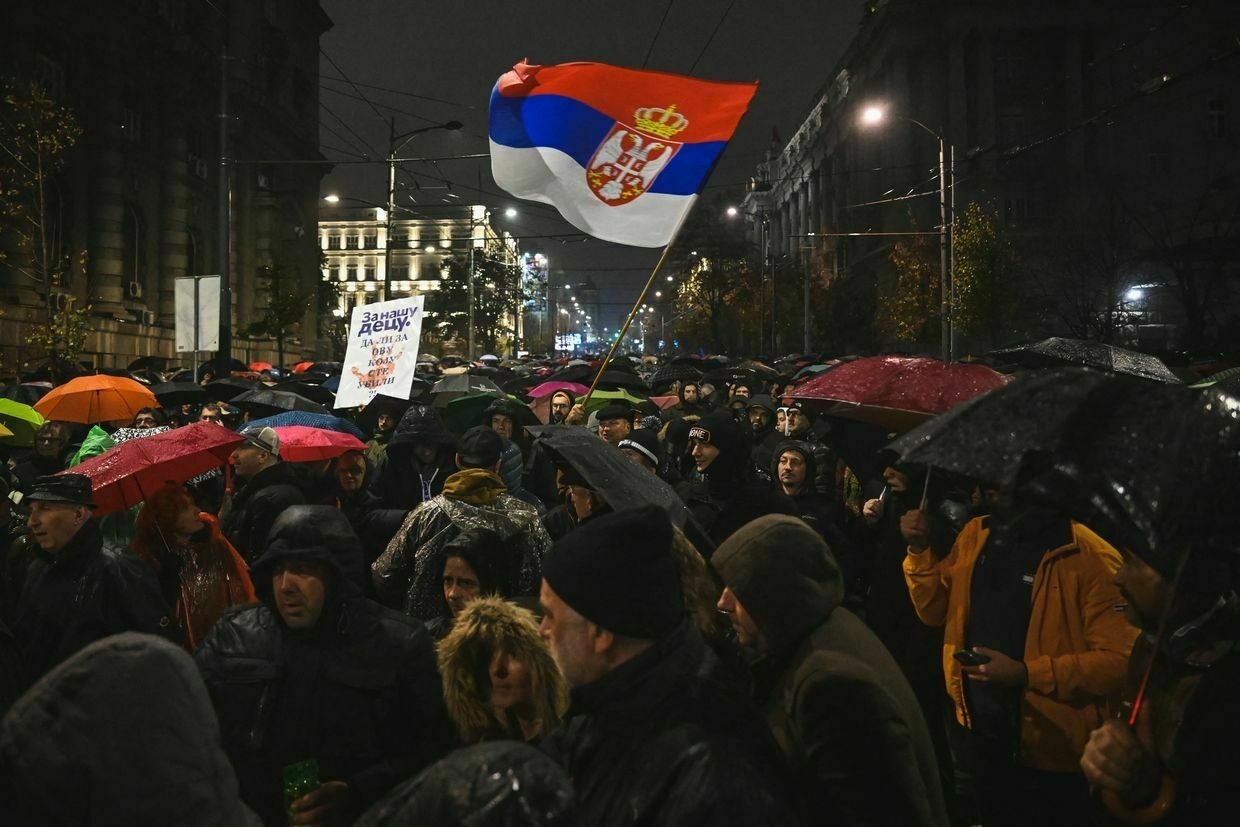
Vucic, a right-wing populist leader with authoritarian tendencies and warm ties with Russia, has repeatedly accused foreign states of inciting the protests in order to topple his government. He is provided no evidence to support these claims.
The current wave of protests in Serbia began in November, when a train station roof in the town of Novi Sad collapsed, killing 15. The disaster was blamed on government corruption.
While Vucic has alleged that Western powers are trying to trigger a “Ukrainian-style revolution in Serbia,” the Serbian protests are not markedly pro-Ukrainian or pro-Russian. Unlike mass demonstrations in Slovakia, where activists explicitly condemned the government’s Kremlin-friendly agenda, the Serbian movement is focused on Vucic’s corrupt leadership.
Since Russia’s full-scale invasion of Ukraine in 2022, Serbia has attempted to navigate a delicate diplomatic path between Moscow and the West. It has positioned itself as neutral in the Russia-Ukraine war and balanced its status as an EU candidate with its longstanding ties to Russia.
Vucic made his first official visit to Ukraine on June 11.
Ukraine’s new top prosecutor known for high-profile cases, seen as Zelensky loyalistLoyalty to the incumbent administration has been the key requirement for prosecutor generals in Ukraine. Ruslan Kravchenko, who was appointed as prosecutor general on June 21, appears to be no exception. Previously he had been appointed as a military governor by President Volodymyr Zelensky and is seen as a presidential loyalist. Kravchenko became Ukraine’s top prosecutor after a lengthy hiatus during which the position of prosecutor general remained vacant. His predecessor, Andriy Kostin, r The Kyiv IndependentOleg Sukhov
The Kyiv IndependentOleg Sukhov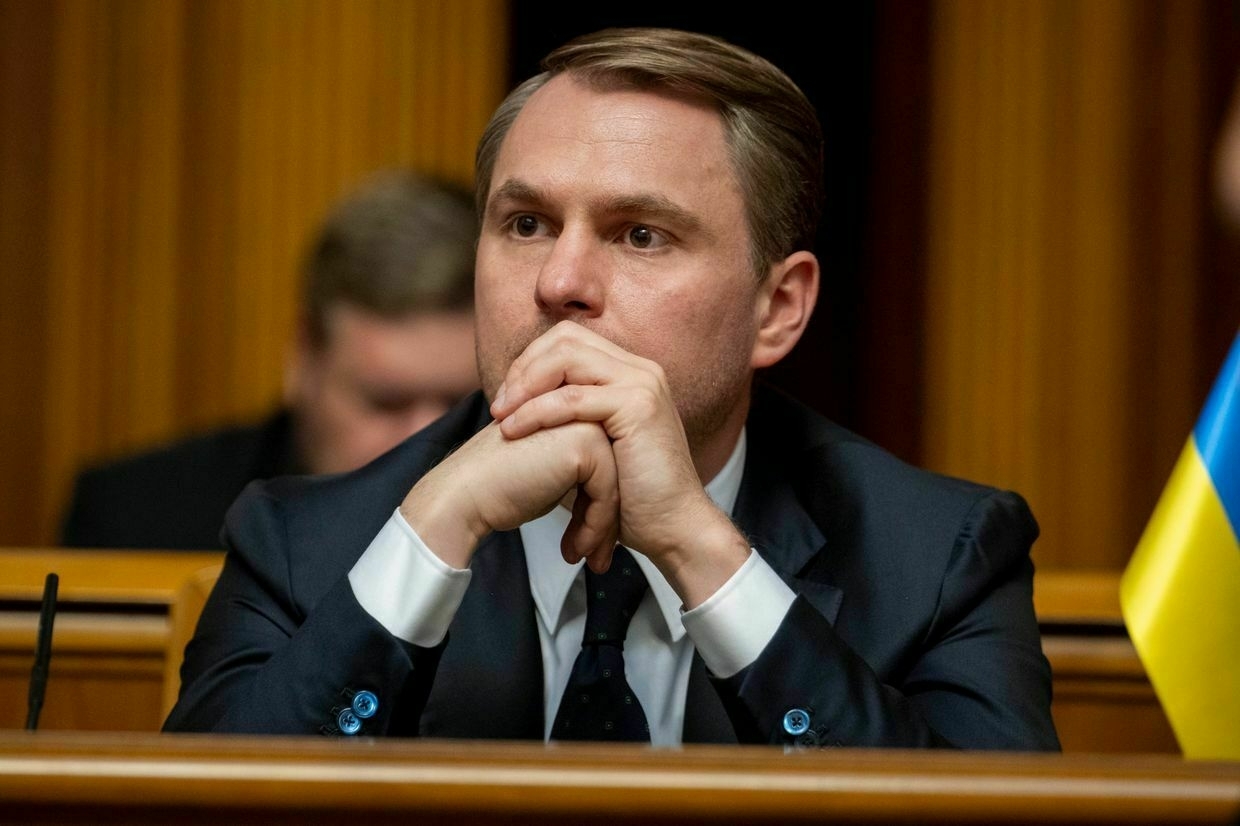
-
Ukraine war latest: Ukrainian drones reportedly strike 4 fighter jets in Russia
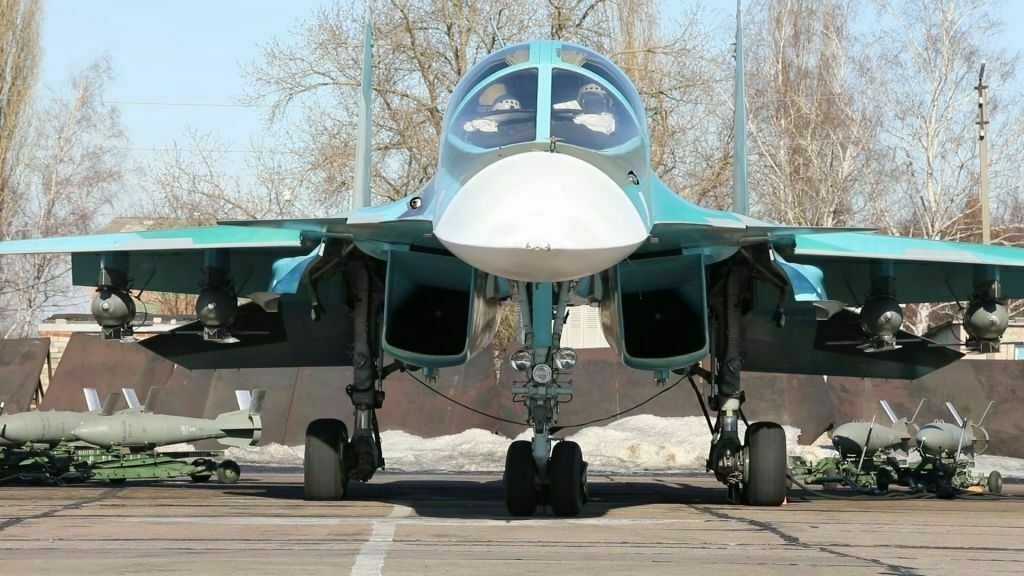
Key developments on June 27:
- Ukraine war latest: Ukrainian drones reportedly strike 4 fighter jets in Russia
- North Korea deployed 20% of Kim’s elite ‘personal reserve’ to fight against Ukraine in Russia, Umerov says
- Pro-Palestinian activists reportedly destroy military equipment intended for Ukraine
- Zelensky signs decree to synchronize Russia sanctions with EU, G7
- Russia’s short-range drone strikes cause over 3,000 civilian casualties in Ukraine, UN reports
Ukrainian drones struck four Su-34 fighter jets at the Marinovka airfield in Russia’s Volgograd Oblast overnight on June 27, Ukraine’s General Staff said.
The operation was carried out by the Special Forces and the Security Service of Ukraine (SBU) in cooperation with other military units, according to the General Staff.
Volgograd Oblast is located some 900 kilometers (560 miles) southeast of Moscow.
According to preliminary data, two Russian fighter jets were destroyed, and the other two were damaged. Russia uses such aircraft to bomb Ukraine, particularly to drop guided aerial bombs, the General Staff said.
The attack also caused a fire in the airfield’s technical and operational unit, a facility where combat aircraft are serviced and repaired, according to the General Staff.
The Kyiv Independent could not independently verify these claims.
As Russia intensifies aerial attacks on Ukraine and the civilian death toll climbs, Ukraine has stepped up its drone attacks on Russian territory. The recent surge in drone strikes aims to disrupt airport operations, overwhelm air defenses, and mount pressure against the Russian population.
Russia pulls its scientists out of Iranian nuclear plant, as Israeli strikes threaten decades of collaborationIsrael’s strikes on Iranian nuclear facilities have alarmed none more than Russia, the country that first brought nuclear power to Iran in defiance of Western objections. We’re “millimeters from catastrophe,” said Kremlin spokeswoman Maria Zakharova on June 18 in response to a bombing campaign that Israel launched against Iran on June 13. Decades of conflict with the West have united Iran and Russia, despite a cultural gulf between the two nations that dwarfs the Caspian Sea that physically di The Kyiv IndependentKollen Post
The Kyiv IndependentKollen Post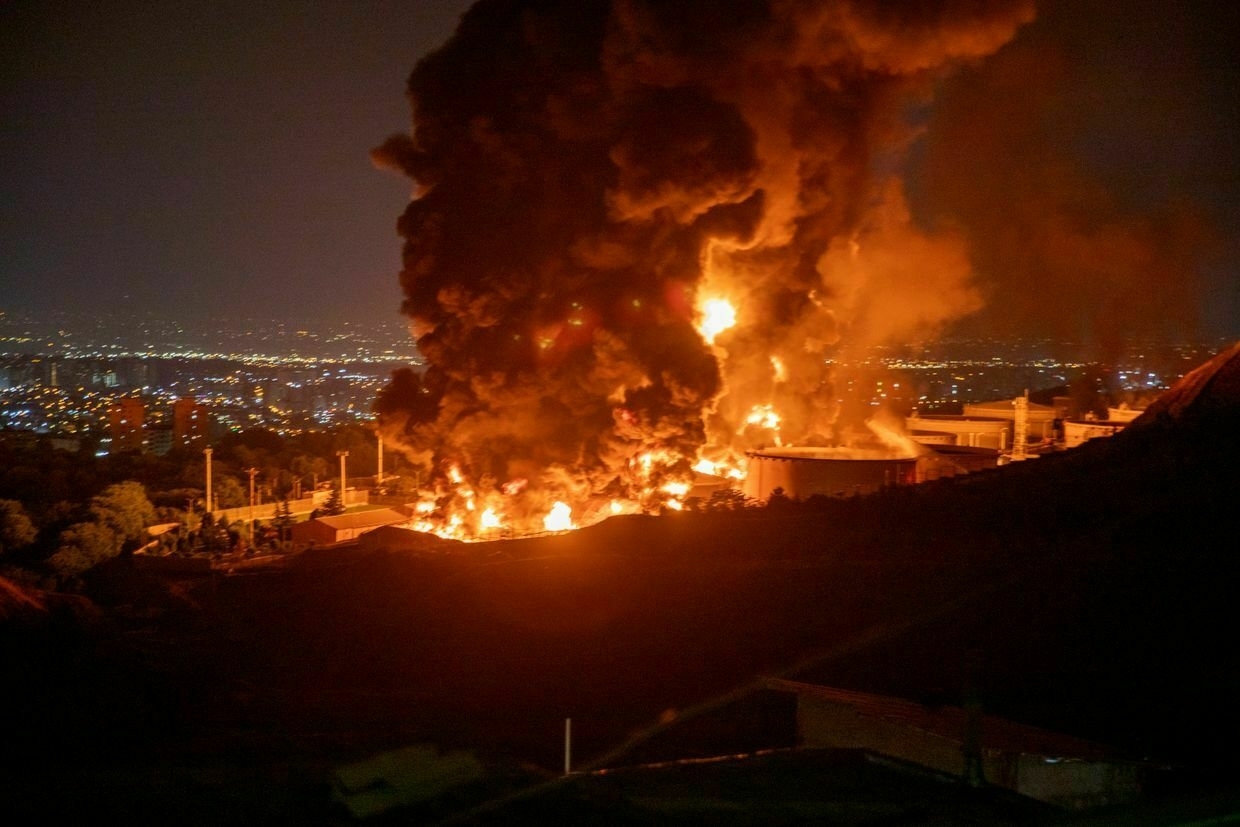
North Korea deployed 20% of Kim’s elite ‘personal reserve’ to fight against Ukraine in Russia, Umerov saysNorth Korea has already deployed around 11,000 elite troops to support Russia’s war against Ukraine, accounting for more than 20% of North Korean leader Kim Jong Un’s elite “personal reserve” force, Defense Minister Rustem Umerov said during a June 26 press briefing.
“These are soldiers specially selected based on physical, psychological, and other criteria,” Umerov said. “These units have already suffered significant losses."
Umerov said intelligence indicates North Korea had considered sending additional forces to fight with Russia. However, according to Umerov, the move would further deplete its strategic reserves and increase risks to regime stability. There have been four known rotations of North Korean units deployed against Ukraine, according to Umerov.
According to a June 15 report from the United Kingdom’s defense intelligence, North Korea has likely sustained more than 6,000 casualties in Russia since the deployment of troops to Kursk Oblast in fall 2024.
U.K. intelligence attributed the high casualty rate to large, highly attritional dismounted assaults.
Russia's growing military partnership with North Korea has raised concerns in Kyiv and among its allies. The two countries signed a Comprehensive Strategic Partnership Agreement in 2024. The treaty commits both countries to provide assistance if either is attacked.
Kim previously described the pact as having a "peaceful and defensive nature," framing it as a formal security guarantee between the longtime partners.
In practice, Umerov said, North Korea is bearing the military burden, while Russia has not upheld its reciprocal obligations, raising concerns within the North Korean regime.
"Russia's use of elite North Korean troops demonstrates not only a growing reliance on totalitarian regimes but also serious problems with its mobilization reserve," Umerov said. "Together with our partners, we are monitoring these threats and will respond accordingly."
Umerov added that Ukraine, working in coordination with its Western partners, is closely tracking the movement and deployment of North Korean units deployed to fight against Ukraine. He said Russia's dependence on foreign forces may signal critical shortages in its own recruitment and mobilization efforts.
According to South Korea's National Intelligence Service, North Korea is likely to send more troops to Russia over the summer. Pyongyang may also send up to 25,000 laborers to Russia to support drone production, according to the report.
The additional troop deployment would come on top of what Seoul estimates is already substantial support from North Korea, which includes the shipment of over 10 million artillery shells and ballistic missiles in exchange for economic and technical assistance from Moscow.
Tired of military aid delays, Ukraine has designed its own ballistic missile — and it’s already in mass-productionUkraine announced on June 13 that its short-range Sapsan ballistic missile would go into mass production, a major development in Kyiv’s ongoing efforts to domestically produce the weapons it needs to fight Russia’s full-scale invasion. As Ukraine faces growing challenges in securing weapons from Western partners, and Russia continues launchingThe Kyiv IndependentYuliia Taradiuk
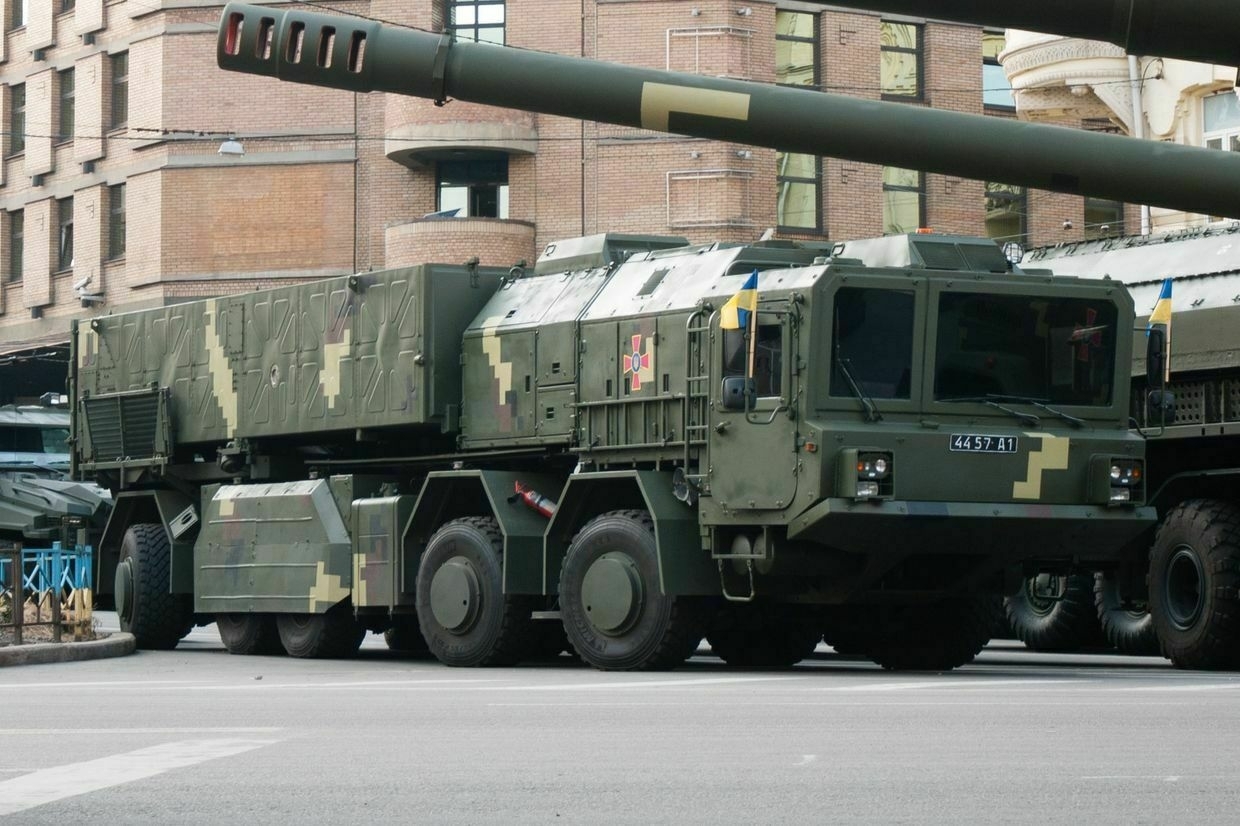
Pro-Palestinian activists reportedly destroy military equipment intended for UkraineAround 150 pro-Palestinian activists have broken into a storage facility and damaged military equipment intended for Ukraine, the Belgian news outlet 7sur7 reported on June 26.
The facility belongs to OIP Land Systems, a company that produces military equipment for Ukraine. The activists reportedly thought the equipment would be supplied to Israel.
The activists, who were wearing white overalls and masks, took part in the Stop Arming Israel campaign. The protests seek to pressure Belgian authorities to maintain the military embargo against Israel and impose sanctions on it.
The protesters, armed with hammers and grinders, first entered the company's offices, where they smashed computers, and then broke into the hangars, where they severely damaged some vehicles, Freddy Versluys, CEO of OIP Land Systems, said.
Since the beginning of the Russian invasion, the company has supplied the Ukrainian army with about 260 armored vehicles. The damage caused by the activists' actions is estimated at $1.1 million, according to 7sur7.
"A further delivery has now been delayed by at least a month. That's all these Hamas sympathizers will have achieved with their action," Versluys said.
The company was reportedly targeted by pro-Palestinian protesters because Elbit Systems, an Israeli defense company, owns it.
Protesters believe that Elbit supplies 85% of the drones and most of the ground military equipment used by the Israel Defense Forces, 7sur7 reported.
Yet, the OIP Land Systems CEO claimed that his company has not produced defense systems for Israel for over 20 years.
OIP Land Systems has provided defense products to Ukraine on several occasions, including Leopard 1 tanks, which are manufactured at the Tournai plant.
Zelensky signs decree to synchronize Russia sanctions with EU, G7President Volodymyr Zelensky signed a decree on June 27 to coordinate sanctions against Russia with international partners, particularly the European Union and the Group of Seven (G7), the President's Office said on its website.
A day earlier, EU member states' leaders gave their political consent to extend the sanctions previously imposed on Russia for its war against Ukraine.
The EU Committee of Permanent Representatives (CORPER) also extended sectoral sanctions against Russia for another six months on June 26, European Pravda reported, citing a diplomatic source. The sanctions include restrictions against entire sectors or industries of the Russian economy or areas of operation of Russian businesses.
Meanwhile, the participants did not approve the new 18th package of sanctions, which targeted Russia's energy and banking sectors, due to Slovakia's veto.
Zelensky's June 27 decree implements a decision by Ukraine's National Security and Defense Council's (NSDC) to synchronize the sanctions against Russia with the EU and G7.
According to the document, sanctions approved by partner states must be submitted to the NSDC for consideration and approval no later than the 15th day after the partner state's decision comes into force.
The Cabinet of Ministers, the Security Service of Ukraine (SBU), and the National Bank of Ukraine must also ensure the implementation of sanctions approved by international partners in Ukraine.
After the 17th package of sanctions against Russia took effect on May 20, Ukraine's allies announced the following day that another round of restrictions was already in the works.
The push for tighter sanctions comes as Russia continues to reject ceasefire proposals and presses forward with military operations.
Russia's short-range drone strikes cause over 3,000 civilian casualties in Ukraine, UN reportsShort-range drone attacks have become one of the deadliest threats to civilians in Ukraine’s front-line regions, killing at least 395 people and injuring 2,635 between February 2022 and April 2025, according to a new bulletin by the UN Human Rights Monitoring Mission in Ukraine.
The report, "Deadly Drones: Civilians at Risk from Short-Range Drones in Frontline Areas of Ukraine," highlights the growing use of first-person-view (FPV) drones by Russian forces and their devastating impact on the civilian population.
The bulletin documents attacks in which drone operators deliberately targeted civilians engaging in daily activities — driving private cars, riding bicycles, walking outdoors, or evacuating others in clearly marked ambulances.
"Although individually less destructive than artillery or missiles, the sheer scale and increasing frequency of short-range drone attacks have made them one of the deadliest weapons in Ukraine," said Danielle Bell, head of the mission.
"Over 3,000 civilian casualties — and the relentless frequency of these attacks — have not only caused immense human suffering but also instilled fear, severely disrupted daily life, and crippled access to essential services in several frontline communities."
The monitoring mission documented, verified, and analyzed 3,030 civilian casualties resulting from short-range drones between 24 February 2022 and 30 April 2025.
The researchers conducted site visits to very high-risk areas, including the southern city of Kherson, Zolochiv in Kharkiv Oblast, and other front-line locations. Investigators interviewed survivors and witnesses of drone attacks, medical personnel, and humanitarian workers to assess the full impact of these strikes on civilian life.
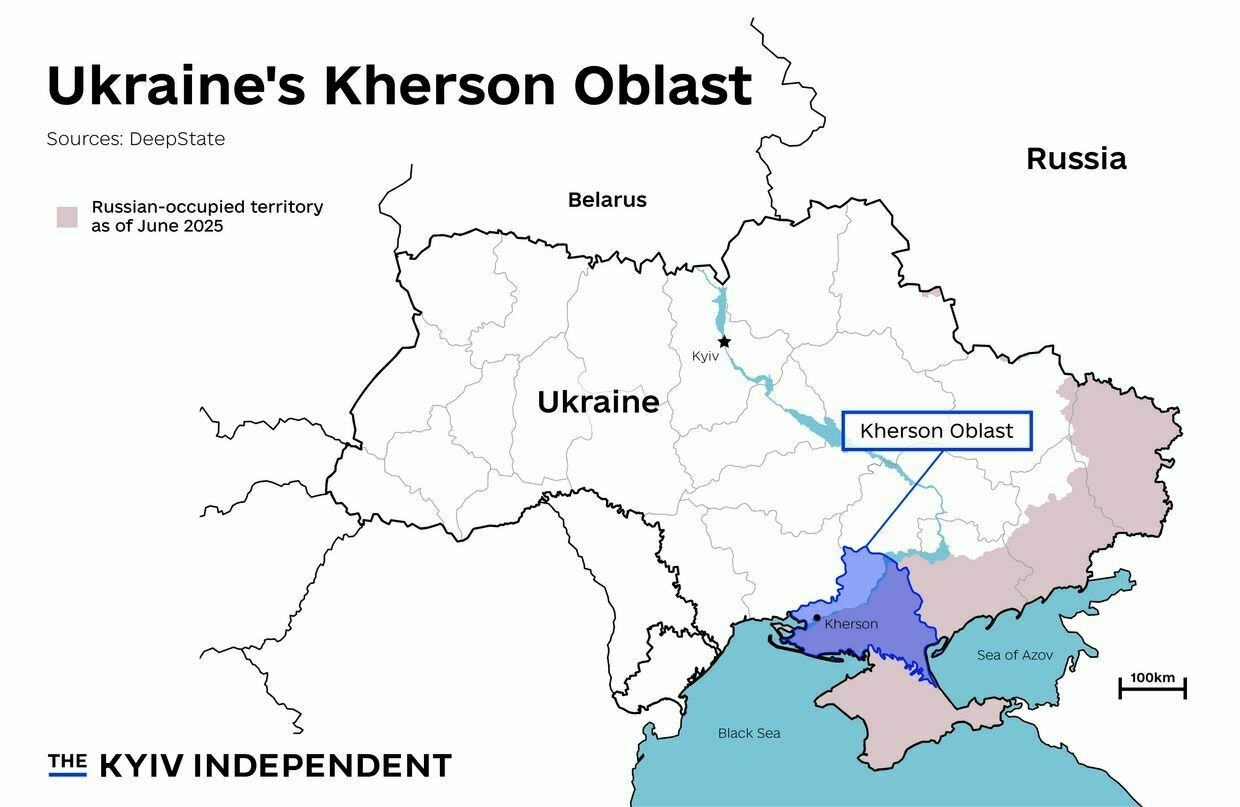
Ukraine's Kherson Oblast (Nizar al-Rifai/The Kyiv Independent) Casualties surged in late 2023 and early 2024, with numbers suddenly doubling in July 2024. April 2025 marked the deadliest month on record, with 42 civilians killed and 283 injured. Drone strikes continued into May and June.
On 23 June, a 65-year-old driver was killed in Kostiantynivka, Donetsk Oblast, when a drone struck a minibus. In Kharkiv region, a 58-year-old volunteer was killed on 22 May when a drone dropped a munition on a residential balcony. On 20 May, six civilians were injured when a drone hit a bus in Kherson Oblast.
The vast majority of casualties — 89% — occurred in territory controlled by the Ukrainian government. The UN says these attacks violate international humanitarian law, particularly the principles of distinction and precaution, and may in some cases constitute war crimes.
Note from the author:
Ukraine War Latest is put together by the Kyiv Independent news desk team, who keep you informed 24 hours a day, seven days a week. If you value our work and want to ensure we have the resources to continue, join the Kyiv Independent community.
-
Pro-Palestinian activists reportedly destroy military equipment intended for Ukraine
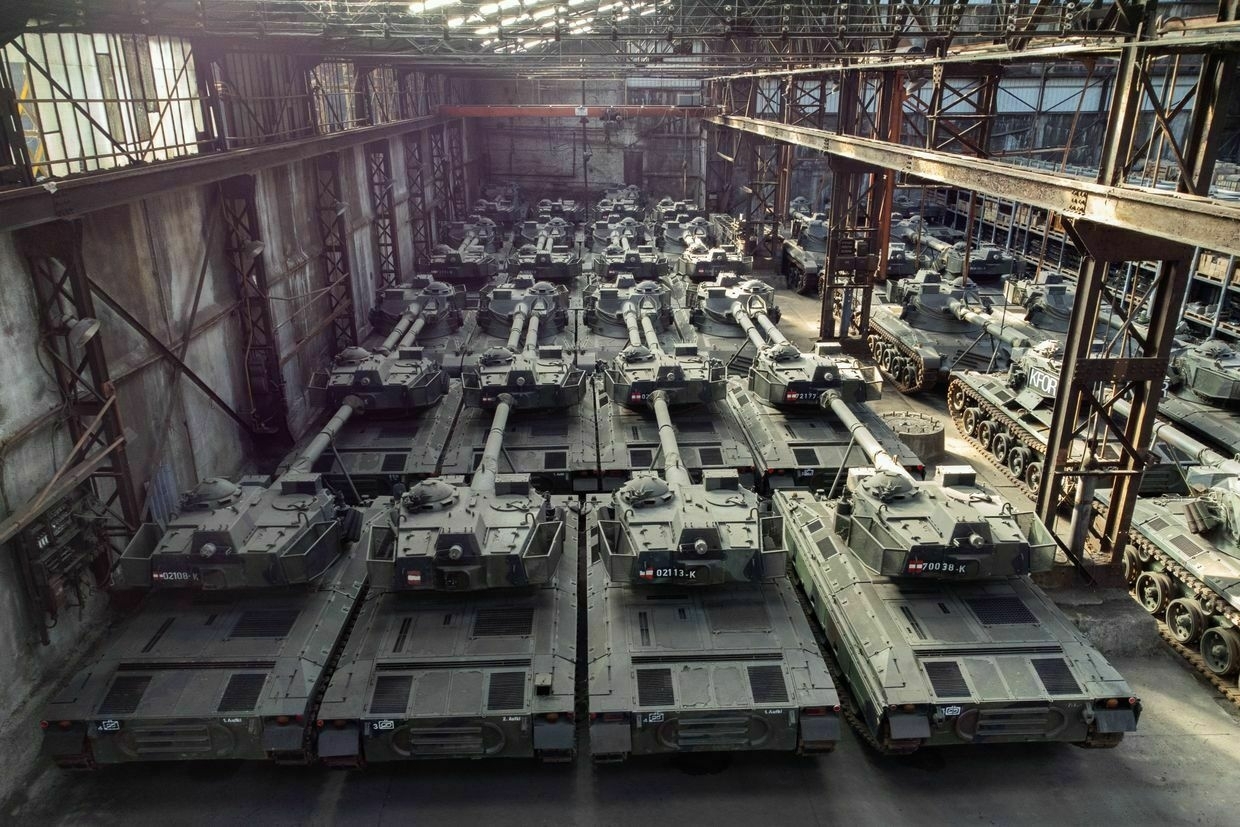
Around 150 pro-Palestinian activists have broken into a storage facility and damaged military equipment intended for Ukraine, the Belgian news outlet 7sur7 reported on June 26.
The facility belongs to OIP Land Systems, a company that produces military equipment for Ukraine. The activists reportedly thought the equipment would be supplied to Israel.
The activists, who were wearing white overalls and masks, took part in the Stop Arming Israel campaign. The protests seek to pressure Belgian authorities to maintain the military embargo against Israel and impose sanctions on it.
The protesters, armed with hammers and grinders, first entered the company’s offices, where they smashed computers, and then broke into the hangars, where they severely damaged some vehicles, Freddy Versluys, CEO of OIP Land Systems, said.
Since the beginning of the Russian invasion, the company has supplied the Ukrainian army with about 260 armored vehicles. The damage caused by the activists' actions is estimated at $1.1 million, according to 7sur7.
“A further delivery has now been delayed by at least a month. That’s all these Hamas sympathizers will have achieved with their action,” Versluys said.
The company was reportedly targeted by pro-Palestinian protesters because Elbit Systems, an Israeli defense company, owns it.
Protesters believe that Elbit supplies 85% of the drones and most of the ground military equipment used by the Israel Defense Forces, 7sur7 reported.
Yet, the OIP Land Systems CEO claimed that his company has not produced defense systems for Israel for over 20 years.
OIP Land Systems has provided defense products to Ukraine on several occasions, including Leopard 1 tanks, which are manufactured at the Tournai plant.
With no new US aid packages on the horizon, can Ukraine continue to fight Russia?The U.S. has not announced any military aid packages for Ukraine in almost five months, pushing Kyiv to seek new alternatives. But time is running out quickly as Russian troops slowly advance on the eastern front line and gear up for a new summer offensive. “While Ukraine’s dependence onThe Kyiv IndependentKateryna Hodunova
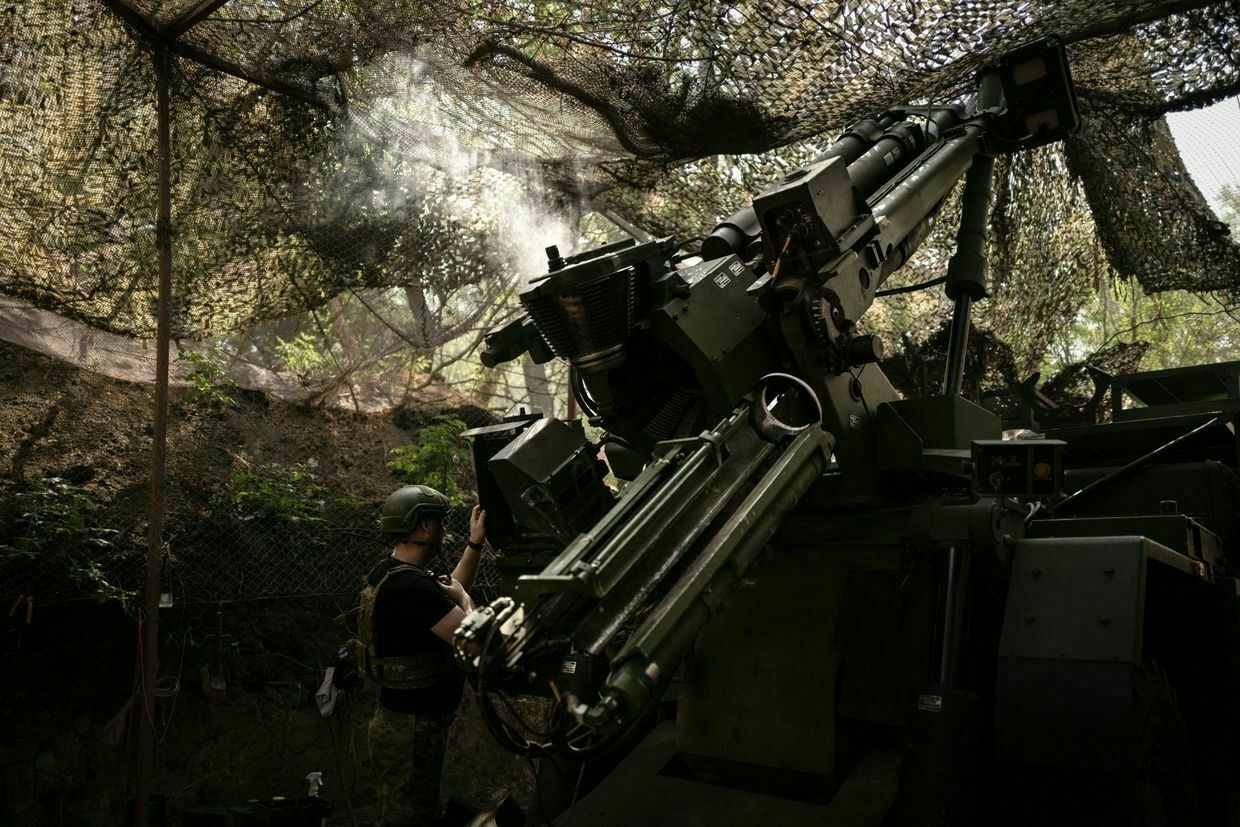
-
Slag Heaps Have Eyes: From Secret Operative to Frontline Fighter
A native of Donbas and veteran of Ukraine’s fiercest battles, Artem Karyakin, better known by his nom de guerre, Skhidnyi, offers his firsthand view from the front lines of the war. For years, he operated in secrecy as a spotter for Ukrainian intelligence deep inside occupied territory. When the full-scale invasion began, he joined the ranks of the Ukrainian forces and has since fought without pause - from the defense of Kyiv to the grinding battle for Bakhmut and the incursion in Kursk.
In this special interview, Artem Karyakin traces the origins of the Russian occupation in Donbas, weighs the prospects for reintegration of lost regions, and recounts what the battle for Kursk truly looked like on the ground. To continue our efforts to document this war and the experiences and opinions of participants at this historic moment, we are publishing the full interview
1. Frontelligence Insight (hereafter FI): You are originally from Donbas and witnessed the unfolding of Russian aggression in the region. How exactly did it happen, and what were you doing in 2014?
Artem “Skhidnyi” Karyakin (hereafter - A): It’s important to note that the Russians began preparing for the seizure of Donbas well before 2014. This was especially evident to us—the residents of the region. For example, in my hometown of Kadiivka (formerly Stakhanov) in Luhansk Oblast, a certain “Don Cossack” organization appeared in the early 2000s. It consisted of marginal figures dressed in red Cossack hats and carrying whips. It looked strange, as our city had always been known for its mining industry and had no historical connection to the Don Cossacks.
This organization attracted people with chauvinistic views, fanatically devoted to the idea of reviving the USSR and uniting the "Slavic peoples." For instance, in 2012, a march commemorating the Ukrainian Insurgent Army was held in our city, in which I also participated. The march was disrupted when we were attacked by the same Don Cossack group, along with paid activists from the “Party of Regions.” Even back then, these “Cossacks” were confiscating our Ukrainian flags. That moment was very telling.
By 2014, the same “Cossacks” in red hats were seizing government buildings in our city - only now they were armed and operating under Russian flags. Many of them weren’t even born in our city - they came from the Russian Federation, as did some of those who helped them seize power by force in the spring of 2014.
We — the pro-Ukrainian residents of the city — were organizing events in support of Ukrainian unity at that time. Our first event was a memorial rally honoring the “Heavenly Hundred” (Editor’s note: The "Heavenly Hundred" refers to those who were killed during the 2014 protests against the Yanukovych regime in Ukraine). That was in late February 2014. Later, we held car rallies for Ukrainian unity, events on the birthday of Taras Shevchenko, and actively distributed pro-Ukrainian leaflets and stickers around the city, and painted Ukrainian flags.
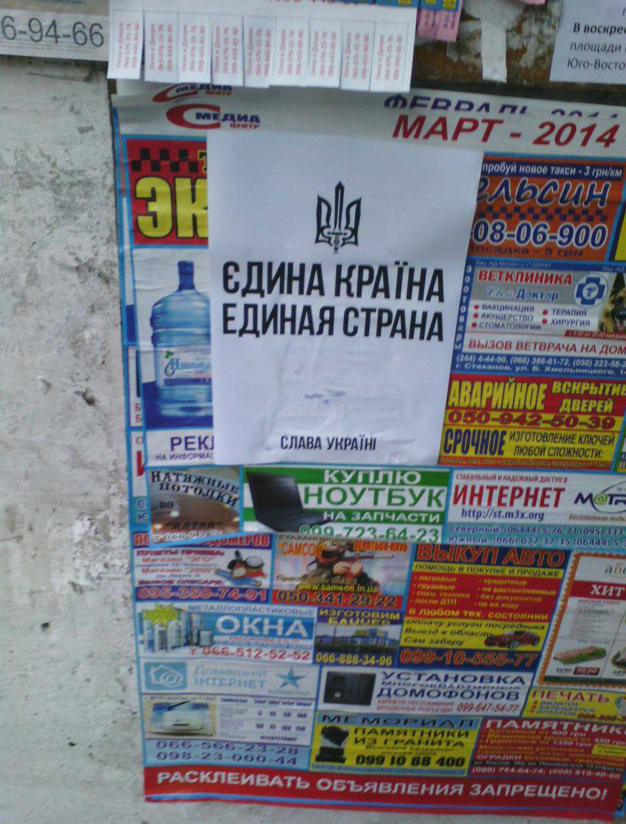
Pro-Ukrainian flyer titled "United Country" pinned to a public notice board, March 2014. Photo shared by Artem “Skhidnyi.” All our activities in the spring of 2014 were dangerous, as there were already armed Russians and local pro-Russian militants in the city.
The point of no return came in late spring 2014, when two young guys — still in school — put up a Ukrainian flag on a slag heap in the center of town. They were fired upon with a handgun for doing so. After that, many pro-Ukrainian residents began leaving the city, as it had become clear that they could simply be killed for their love of Ukraine.
2. FI: What happened to the pro-Ukrainian activists? Are there still people who maintain a pro-Ukrainian stance under occupation?A: I remained in my occupied city until the end of 2021, as did many others who loved Ukraine but, for obvious reasons, could not express it publicly. Today, the situation has worsened for those who support Ukraine in the Russian-occupied cities.
There are still many such people, but they are forced to live in fear, expecting to be arrested at any moment. Russian security services have dedicated significant resources to identifying and detaining pro-Ukrainian residents in the occupied territories. There are constant filtration procedures and ongoing inspections. Special attention is given to public sector workers and even to children. For example, in schools, there are mandatory checks of students’ mobile phones to look for subscriptions to Ukrainian media or messages expressing pro-Ukrainian views.
To love Ukraine under Russian occupation is already an act of courage.
Nevertheless, even today, a large number of true Ukrainians remain in the occupied territories: people who, risking their lives daily, help us in the fight against Russia by sharing intelligence, carrying out sabotage, and participating in other acts of resistance against the Russian army. This is true heroism and further proof that this land is rightfully Ukrainian.
3. FI: You continued to support Ukraine even when your city was already under occupation. What exactly did your activities involve?A: In July 2014, while already living under occupation, I created my first Twitter account. The goal was to shed light on the situation in the occupied territories from the perspective of a pro-Ukrainian resident who hadn’t left their home. At the time, neither people in Ukraine nor the rest of the world fully understood what was actually happening. Many believed that all the locals who had stayed supported Russia. I wanted to show the world that our city was occupied by Russia, and that there were still Ukrainians there who were not happy about it and were waiting for the Ukrainian army.
In addition to general updates, I also posted information about the locations of Russian troops in my city. These were public tweets, sometimes with maps marking where Russian military equipment was stationed. In the fall of 2014, I was contacted via direct message on Twitter by representatives of Ukrainian intelligence services as well as acquaintances from the Ukrainian army. They explained to me that it was better to share intelligence privately rather than posting it publicly on Twitter.
Since then, I began secretly passing on various types of information to the Ukrainian army and intelligence services - details about the movements, positions, and firing points of Russian forces in my city and surrounding occupied areas. Over the years, this also came to include information about factories and enterprises operating under Russian control, the socio-political climate under occupation, local sentiment, and data on collaborators - those who had joined the Russian side in combat or taken positions in the Russian-controlled security services.
4. FI: In 2021, you moved to Ukrainian-controlled territory, and the full-scale invasion began the following year. How did you join the Armed Forces, and what was your first battle?A: From the very first days of Russia’s full-scale invasion, I began looking for a unit where I could fight against Russia. The early days of the big war were chaotic—there was disorganization and confusion everywhere. I was living in Kyiv, and in one of the first days of March, I simply approached some guys with rifles and offered my help. That very same day, I was already standing night watch with Kalashnikov's hand-held machine gun in my hands.
It was one of the Territorial Defense Force units. We took up a defensive position on the outskirts of Kyiv, on the Bucha-Irpin side. In the summer of 2022, I joined the fighters of the 8th Regiment of the Special Operations Forces, where my friend was already serving and had invited me to join his group.
My first combat deployment was in August 2022 in Bakhmut, which at that point was already under assault by Russian forces, including Wagner PMC fighters. Shortly after Bakhmut, we took part in the liberation and clearing of the city of Lyman, in Donetsk Oblast. For me and many of my fellow soldiers, it was our first experience liberating our native land - a moment we will remember forever.
5. FI: You’ve taken part in important operations - both in Ukraine and on Russian territory, specifically in the Kursk region. Did you notice any significant differences between combat operations in Ukraine and in Kursk?
A: The Kursk operation was unique in every sense and differed from my past experiences in Ukraine in many ways. It was in the Kursk region that I first encountered the concept of maneuver warfare, and I can say that, personally, combat along a clear front line is easier for me.
It was also in Kursk where we first faced FPV drones connected via fiber optics and a new Russian tactic—using specialized FPV drone teams to strike our logistics routes from as far as 10–15 km deep. This tactic is now widely used by Russian forces along nearly every front.
In this operation, we also faced the enemy’s best FPV crews, all concentrated in one relatively small sector. These teams had been withdrawn from other areas and redeployed to Kursk specifically.
Another major difference was that, for the first time, we were acting as a “foreign army” in populated areas. Each soldier had their own reaction to that: for some, it felt like justified revenge; others felt a strong pull back toward our own land and a kind of inner resistance to advancing on foreign soil.
I count myself among the former. For me, it was an act of rightful retribution and a way to shift the war onto the aggressor’s territory. Yet I constantly reminded myself that I didn’t want to behave like the Russians did in my hometown. On Russian territory, I acted very differently than they had in ours. To every civilian I encountered in the Kursk region, I explained why we were there, how it all began, and that we simply want to liberate our own cities - not seize theirs.
The Kursk operation was very well planned and executed at the outset, but unfortunately was marred by a series of key mistakes and issues at various levels. These mistakes must be carefully analyzed so they are never repeated. I sincerely hope this experience proves useful in the future—it was unique in many respects.
Regardless, everyone who took part in that operation became part of history. We shattered the myth of the invincibility of a nuclear power and the so-called greatness of the Russian army. We drew significant enemy forces away, slowing their advance on our territory. And we were also the ones who fought against the armies of two different totalitarian states. The experience of facing North Korean forces is also something that sets this apart from the war in Ukraine—even though their tactics in Kursk didn’t differ much from what Wagner used in Bakhmut.
6. FI: Assuming that Russia eventually loses control over Donbas - how do you envision the process of reintegrating these territories? How deeply has Russian propaganda taken root there over the years?A: The most important thing is to drive the Russians out of our land. And with Ukrainians, just like us, we’ll quickly find common ground.
The main issue with those who fell under the influence of Russian propaganda during the occupation is that they know very little about the rest of Ukraine. Many have never been to other regions and know nothing about them. Everything they do know about Ukraine comes from what they’ve seen on Russian TV channels.
Another problem is that Russia created conditions in which every second family in occupied Donbas has lost a relative in the war. This is a direct result of the forced mobilization of men from the occupied territories into the Russian army.
But you have to understand — Donbas, especially the part that’s been under occupation since 2014, is a region where people generally lack any strong civic engagement or passion. Their opinions and actions are shaped entirely by the environment they live in.
If Ukraine returns to these territories, people will quickly adapt to new rules and new flags flying over their homes. And soon, they will realize that life under Ukraine is freer and more breathable. Without the presence of Russian troops, these people would never have fought for the Russian flag. I know them — I lived among them for most of my life.
Even now, many of them no longer see Russia as something positive. After living under the Russian flag long enough, they’ve come to realize that there’s little good there, and that the sacrifices they were forced to make for that flag were not worth it.
7. FI: When the war ends, what do you see your life looking like? Do you have any dreams or plans for peacetime?
A: The most important thing is for the war to end with our victory. We must preserve Ukraine and bring back our land and our people. I’m turning 28 this year, and I’ve spent 11 of those years living through war — it’s hard to imagine myself without it now.
But of course, I have a personal dream as well: to start a family of my own. During the years of occupation, I lost my parents and my grandmother, and since then, the feeling of loneliness has never left me. My dream is a family… my children, who will never know what war is.
============================================================================
Artem “Skhidnyi” Karyakin, in an exclusive interview with Frontelligence Insight. You can follow him on the X platform for firsthand updates from the front.This Substack is reader-supported. To receive new posts and support my work, consider becoming a free or paid subscriber.
-
Russia still hasn't declared war on Ukraine, and doing so could spell Putin's demise, experts say
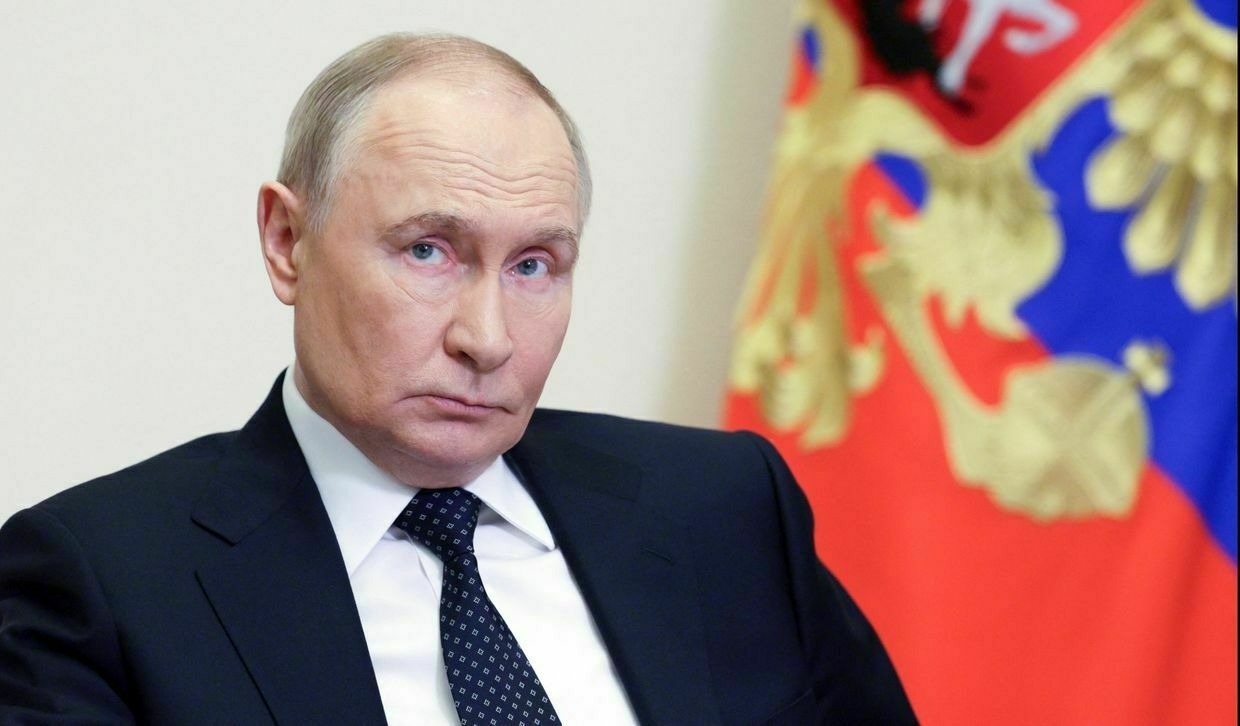
Despite suffering over 1 million casualties, pounding Ukrainian cities nightly with missiles and drones, and committing countless war crimes, one startling fact about Russia’s full-scale invasion remains — Moscow has yet to officially declare war on Ukraine.
In February 2022, Russian President Vladimir Putin described what he believed was going to be a swift victory and the capture of Kyiv within days as a “special military operation."
Nearly three-and-a-half years later, the Kremlin is stuck with the term, caught in a quandary of its own making — waging by what any measure is a war, while being unable to call it one for fear of a domestic backlash.
“Putin has protected himself in this war by separating the direct effects of the war from the majority of the Russian population.”
A formal declaration of war would have far-reaching implications for the country's industry and economy, as well as allowing the Kremlin to launch a full mobilization.
But partial mobilization announced in September 2022 led to the only widespread protests against the war inside Russia, making clear to Putin that announcing anything more would cause him serious political problems.
"Putin has protected himself in this war by separating the direct effects of the war from the majority of the Russian population," Karolina Hird, Russia deputy team lead at the Institute for the Study of War, told the Kyiv Independent.
"But as soon as that starts to spill over and actually be felt by more of the Russian domestic population, that's when he gets into more trouble."
According to reports, there has recently been unrest within the Kremlin after Ukraine's audacious Operation Spiderweb, with hardliners reportedly pressuring Putin to make a formal war declaration that would permit true retaliation and escalation, and give the Russian government sweeping authority to shift the country fully onto a wartime footing.
But experts who spoke to the Kyiv Independent say this is unlikely, arguing that for all intents and purposes, Russia's industry and economy are already on a wartime footing even if Kremlin officials deny this, and that Putin simply can't risk his hold on power by launching what would be a deeply unpopular mobilization.
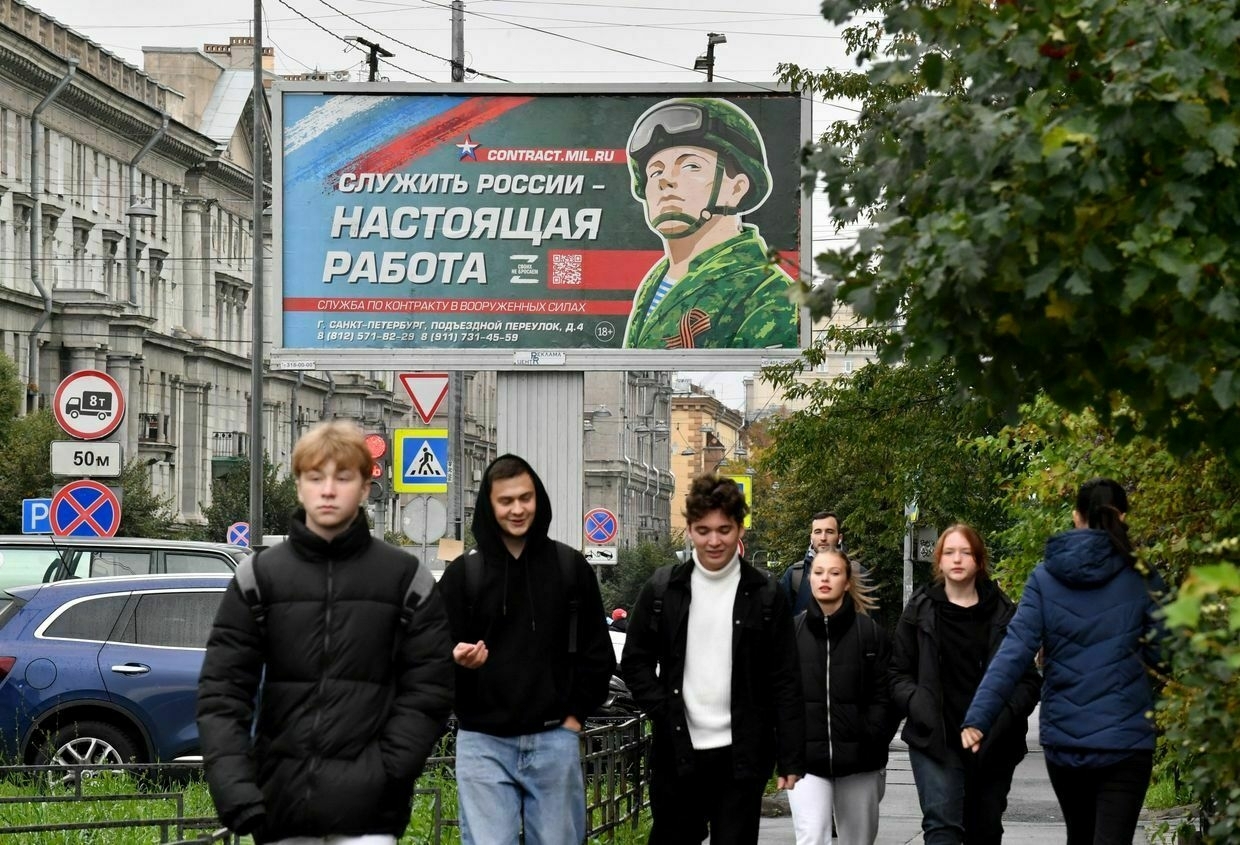
Youths walk past a billboard promoting contract army service with an image of a serviceman and the slogan “Serving Russia is a real job” in Saint Petersburg, Russia, on Sept. 29, 2022. (Olga Maltseva / AFP via Getty Images) 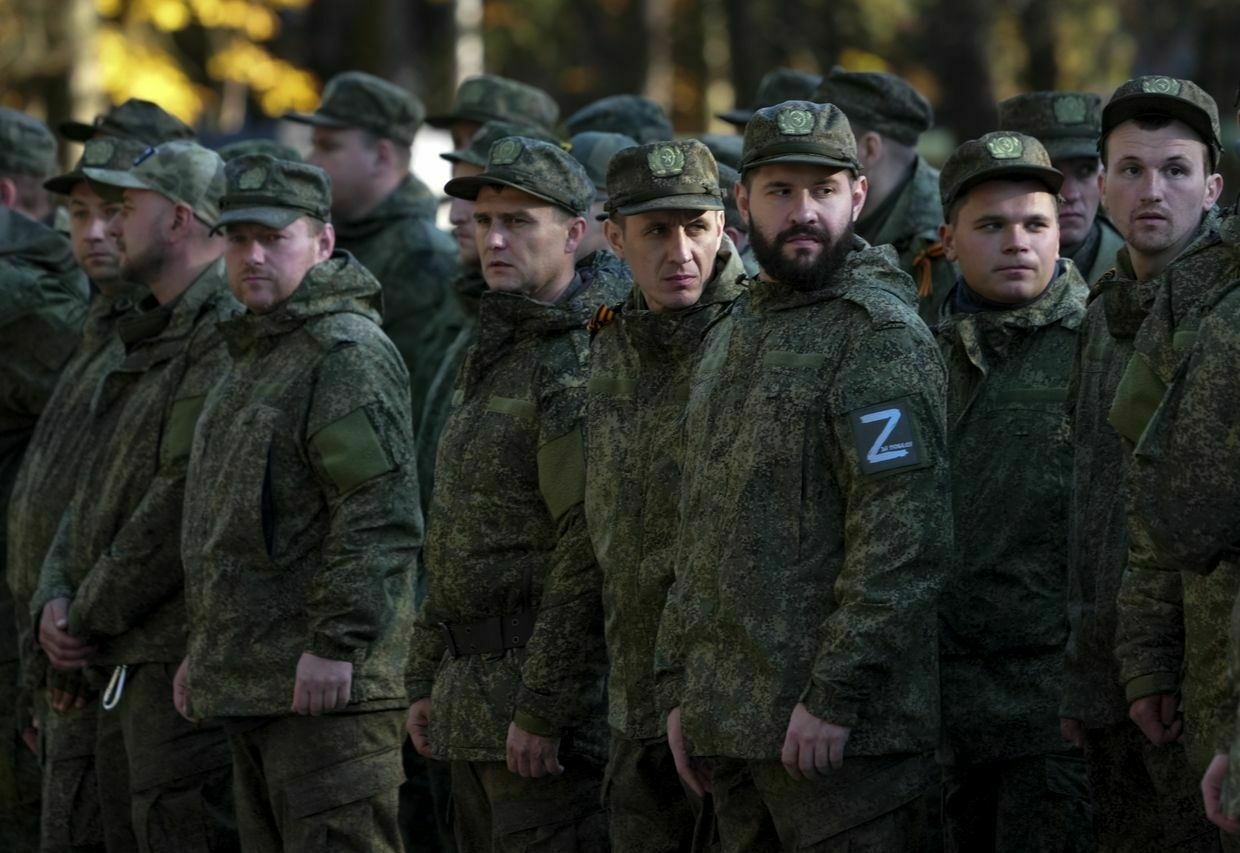
Russian citizens drafted during the partial mobilization are seen being dispatched to combat coordination areas after a military call-up for the Russian invasion of Ukraine in Moscow, Russia, on Oct. 10, 2022. (Stringer / Anadolu Agency via Getty Images) What would a Russian declaration of war mean?The two major factors that would come into play are the Russian economy and the Russian people.
A full war footing would be a complete pivot of the economy and its workers towards defense and the production of weapons, and allow for a full mobilization to conscript the necessary manpower to use them.
The Kremlin is projected to allocate 6.3% of its GDP to defense this year — the highest level since the Cold War — yet still far below what would typically indicate a country fully mobilized for war.
By contrast, Ukraine spent 34% of its GDP on defense last year, while British military spending surpassed 50% of GDP during the Second World War.
These same figures were cited by Russian Ambassador to the U.K. Andrey Kelin in an interview with CNN last week as evidence that Russia was in fact still fighting a "special military operation," and not a war.
Experts are not convinced.
"The Russian economy is already on a war footing, and the 6.5% of GDP spent on defense for 2025 is likely an underestimation," Federico Borsari, a defense expert at the D.C.-based Center for European Policy Analysis, told the Kyiv Independent.
"Defense production in key capability segments such as drones, missiles, and armored vehicles is at full steam, with up to three worker shifts per day."
Russia has drastically upped weapons production in recent months as it drains its stockpiles.
According to data from Ukraine's military intelligence (HUR) shared with the Kyiv Independent earlier this month, production of ballistic missiles, for example, has increased by at least 66% over the past year.
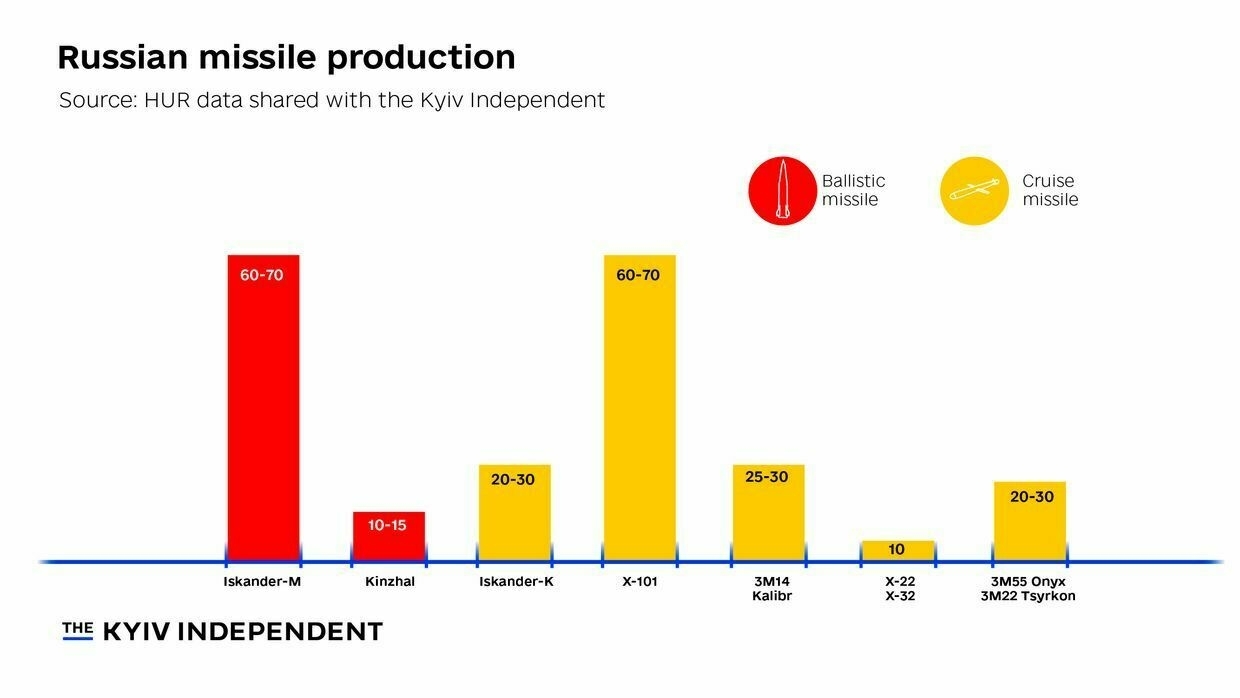
Russian missile production per month. (The Kyiv Independent) Hird agrees with Borsari's analysis, saying the massive boost in defense manufacturing is a sign that, despite Russia's claims that it isn't at war, its depleted stockpiles are a pretty clear sign they are.
"It's not like Russia has a secret reserve of weapons in the background that it can somehow kind of unlock and unleash on Ukraine," she said.
"Russia is already fighting an all-out war in Ukraine, so there's actually not much more that can be done on their side."
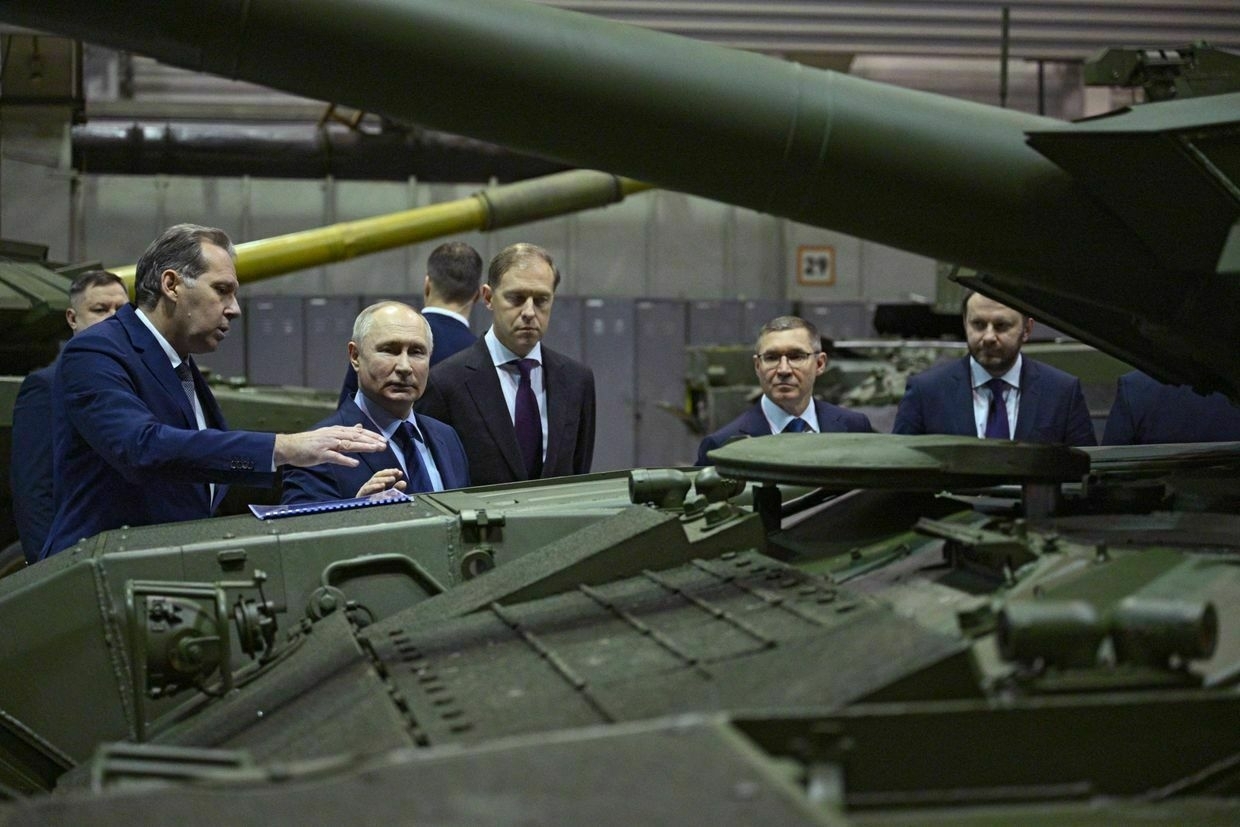
Russia’s President Vladimir Putin visits Uralvagonzavod, the country’s main tank factory in the Urals, in Nizhny Tagil, Russia, on Feb. 15, 2024. (Ramil Sitdikov / Pool / AFP via Getty Images) 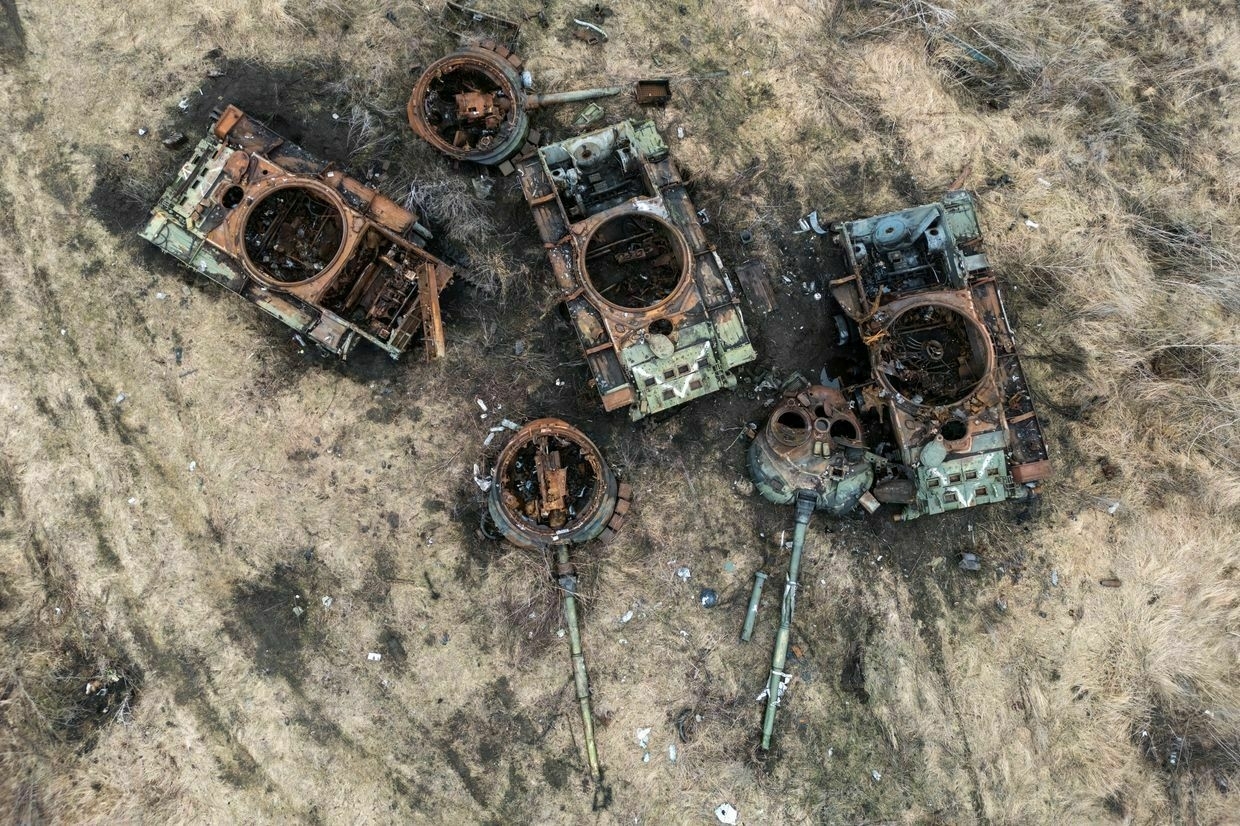
Destroyed Russian tanks lie in a field near the village of Bohorodychne in Donetsk Oblast, Ukraine, on Feb. 13, 2024. (Maxym Marusenko / NurPhoto via Getty Images) The manpower issueThe one crucial area in which a declaration of all-out war against Ukraine could significantly boost Russia's ability to wage war is manpower.
Throughout the full-scale invasion of Ukraine, Putin has steered clear of a full mobilization, conscious of the domestic backlash it would create.
Instead, the Kremlin has simply paid people to fight, offering huge sign-up bonuses to encourage people to volunteer, a method which, up to now has managed to replenish the huge losses the army has incurred, but which many experts think is unsustainable.
"In terms of manpower, Russia still has a sizeable population pool it can draw from, at least in the near term, especially in peripheral regions," Borsari said.
"However, this pool may not be sufficient to sustain the current pace of losses, with thousands of casualties each week, beyond the first half of 2026."
With no end to the war in sight, that looming deadline will likely pose a huge dilemma for Putin — how to find enough men to fight, without losing his hold on power?
"They are aware of the massive risks involved and Putin is rather risk-aversive," Ryhor Nizhnikau, a Russia expert at the Finnish Institute of International Affairs, told the Kyiv Independent.
"Full mobilization is expected to have a destabilizing effect on Putin’s regime, the already ailing Russian economy, and it will certainly unbalance the current public consensus on the war."
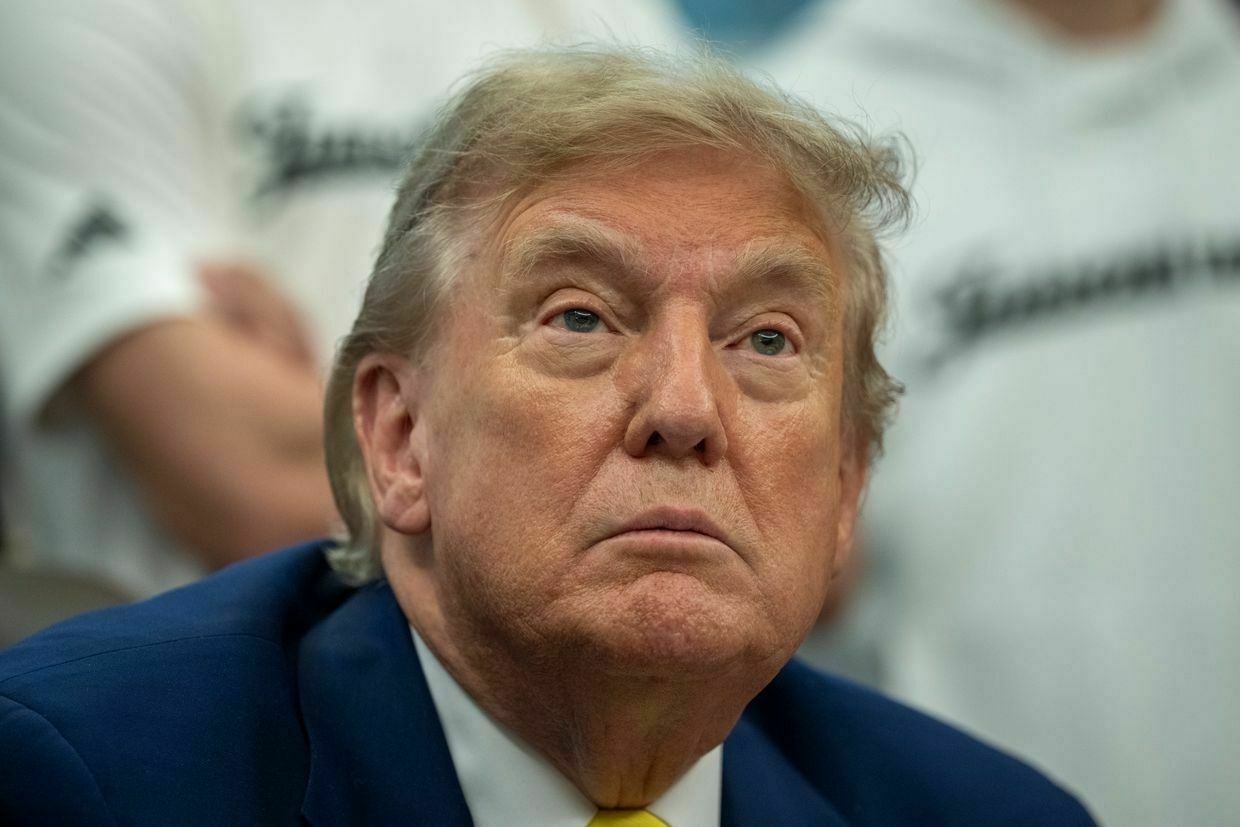
US President Donald Trump in the Oval Office of the White House in Washington, DC, U.S., on June 18, 2025. (Ken Cedeno / UPI / Bloomberg via Getty Images) The geopolitical aspectDeclaring war on Ukraine would also have international ramifications for Putin, Shea said.
"He will no longer be able to pretend to (U.S. President Donald Trump and (U.S. Special Envoy Steve) Witkoff that he is interested primarily in a partial victory by taking only the Donetsk region and Crimea," he said.
"He also said in St Petersburg last week that Russia posed no threat to NATO and that NATO was rearming for nothing. But a formal Russian declaration of war will convey the entirely opposite message."
Putin insists the Russian economy is fine, but Kremlin officials say otherwiseIn a rare public sign that all is not well in Russia, two high-ranking Moscow officials last week issued separate warnings about the state of the country’s economy. Russian Central Bank Governor Elvira Nabiullina and Economy Minister Maxim Reshetnikov both highlighted that amid the Kremlin’s full-scale war against Ukraine, the tools Moscow once relied on to maintain wartime growth are nearly exhausted. Almost immediately, Russian President Vladimir Putin on June 20 dismissed the concerns, clai The Kyiv IndependentTim Zadorozhnyy
The Kyiv IndependentTim Zadorozhnyy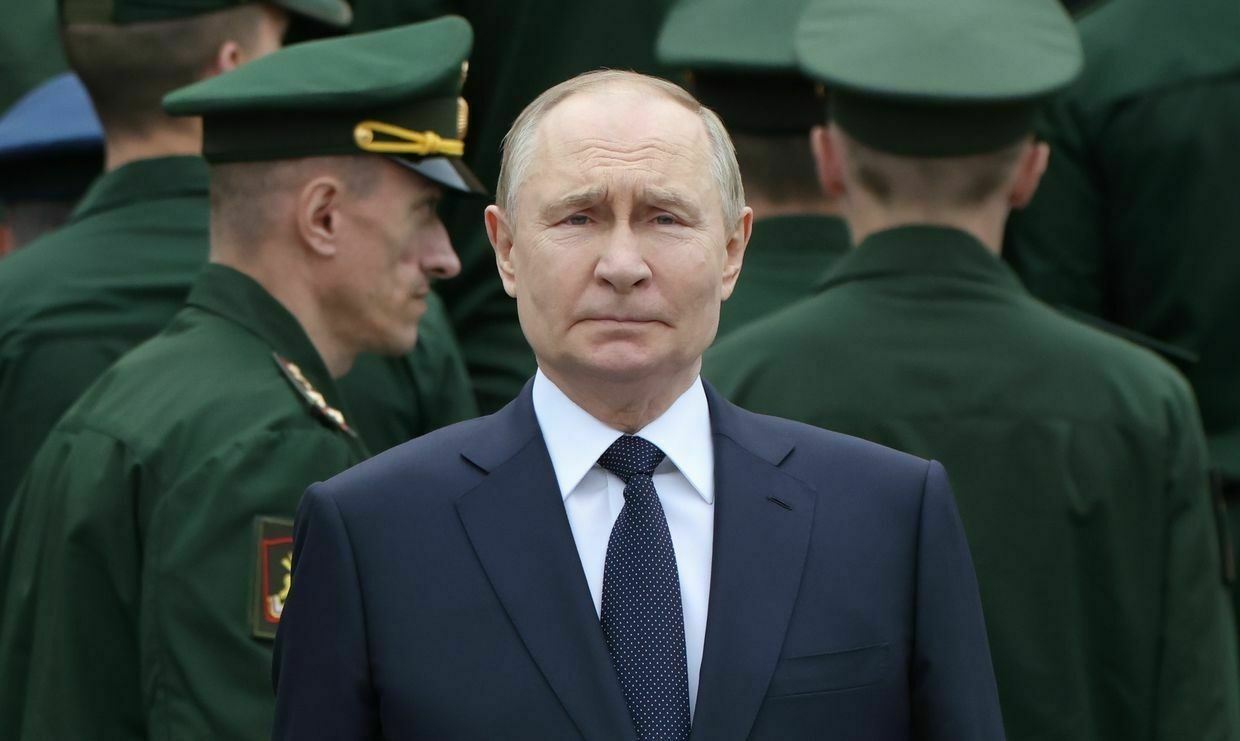
-
Trump gets king’s treatment at NATO summit while Ukraine sits on the sidelines
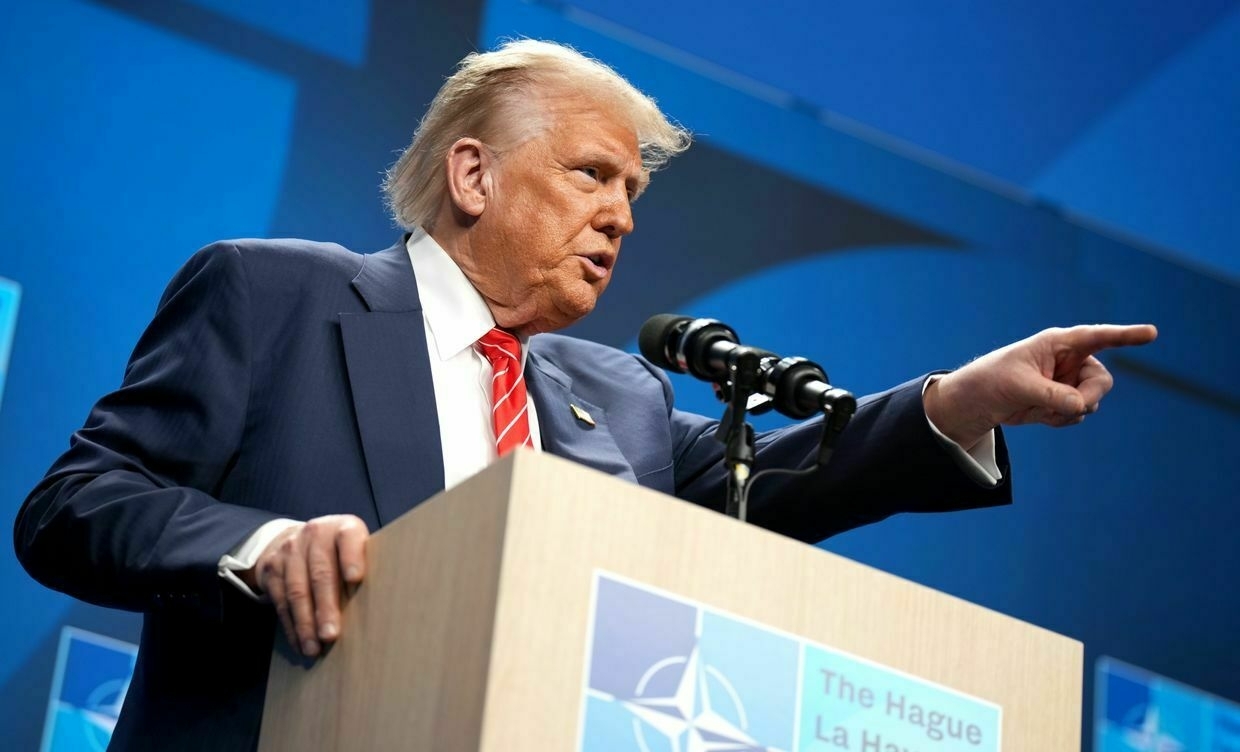
THE HAGUE, Netherlands — As NATO leaders convened in The Hague for a two-day summit on June 24–25, allies and Kyiv braced for the first annual meeting since U.S. President Donald Trump’s return to office.
With the Israel-Iranian conflict dominating the news and the summit agenda focused on the new 5% defense spending target, Ukraine no longer took center stage.
This was chiefly because of one man: Trump has shown little appetite for ramping up military assistance for Ukraine, and there are growing fears he might disengage from the war altogether.
He has also ruffled the feathers of his NATO allies by publicly doubting the U.S. commitment to Article 5.
NATO Secretary General Mark Rutte set out to demonstrate that transatlantic unity remains strong — even if that meant appeasing Trump with flattery and deprioritizing potentially divisive topics like Ukraine.
This shift was underscored by the summit’s final statement, which offered little more than stale words of comfort to the war-torn country, even as Russia launched new large-scale attacks against its cities.
President Volodymyr Zelensky did not leave the summit empty-handed, however. He got his much-desired meeting with Trump, which seemed to have gone smoothly.
Rutte also sought to reassure Kyiv that support for Ukraine holds, stressing that allies have committed some 35 billion euros ($40 billion) in aid to Ukraine this year so far, about 10 billion euros more than in the first half of last year.
But it hasn’t dispelled the sense that an era is ending — one in which Ukraine’s struggle against Russia held an unquestioned place at the center of NATO’s agenda.
Ukraine’s small victoriesThe NATO summit wasn’t a complete failure for Ukraine. In fact, the most pessimistic rumors swirling around in the lead-up to the event did not come true.
Zelensky did, after all, receive an invitation to the summit, dispelling speculation that Ukraine would be left out due to opposition from the U.S. He also managed to have a face-to-face meeting with Trump for the first time since their brief talk in the Vatican in April, rectifying the missed opportunity at the G7 summit.
“Everybody understands that the attack against Ukraine is an attack against us as well. Ukraine belongs to Europe.”
Though details of the meeting are scarce, Trump left the talk uncharacteristically critical of Russian leader Vladimir Putin.
Responding to a journalist during a press conference, the U.S. president acknowledged it is “possible” Putin may have territorial ambitions beyond Ukraine – a rare admission for Trump, who always professed his trust in the Russian leader.
"I consider him (Putin) a person I think is misguided," Trump said.
"I think it’s a great time to end it (war). I’m going to speak to Vladimir Putin, see if we can get it ended," Trump added. "He (Zelensky) is fighting a brave battle, it's a tough battle."
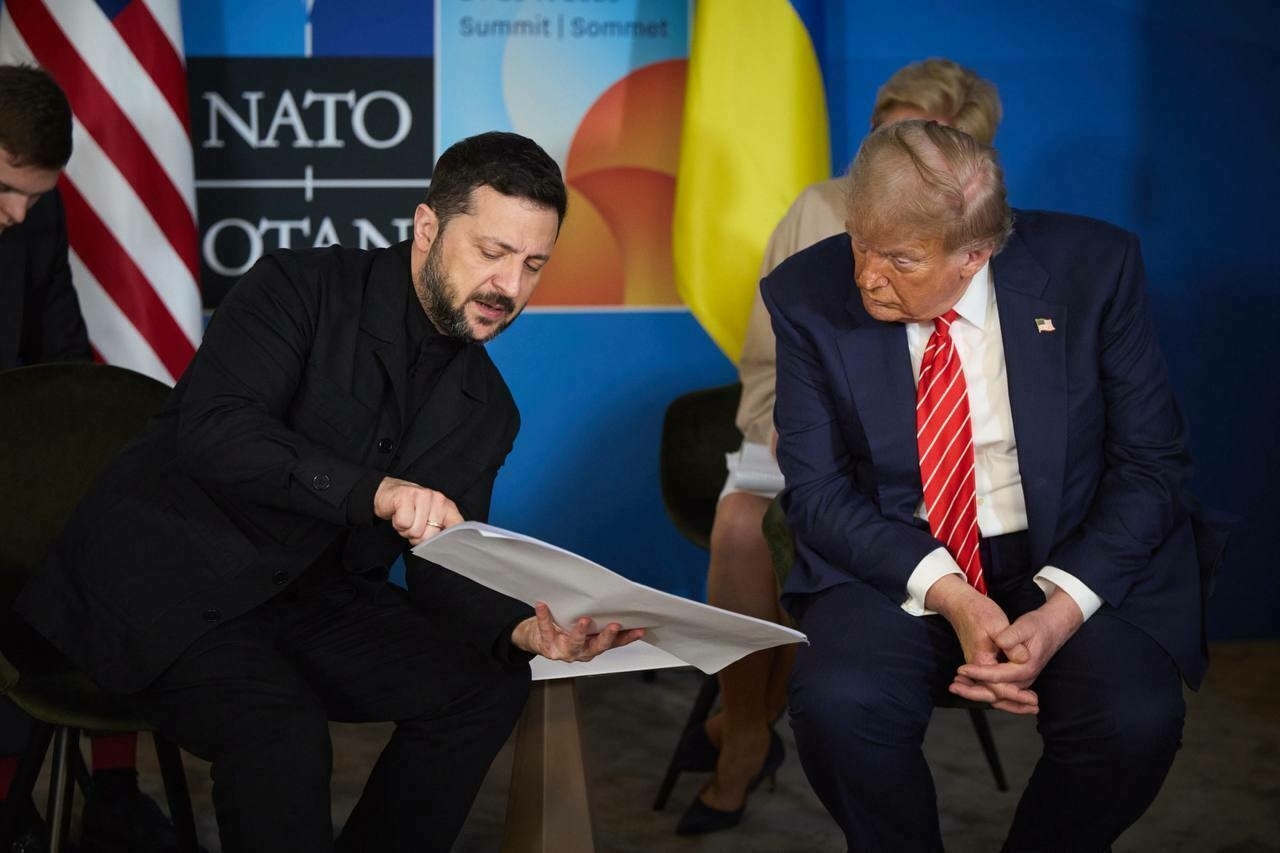
President Volodymyr Zelensky (L) and U.S. President Donald Trump (R) meet during the NATO Summit in The Hague, Netherlands, on June 25, 2025. (Zelenskiy / Official Telegram Account / Handout / Anadolu via Getty Images) Trump also carefully signaled support for sending Ukraine additional missiles for Patriot air defense systems, though no concrete commitment was made. Asked about further air defense assistance by a Ukrainian journalist whose husband is a soldier fighting in Ukraine, Trump, in a rare show of sympathy toward Ukrainians, acknowledged her distress over Russia’s escalating aerial attacks.
"They (Ukraine) do want to have the anti-missile missiles, as they call them, the Patriots, and we're going to see if we can make some available," Trump said.
Other NATO leaders reaffirmed their steadfast support for Ukraine as it continues to resist Russia’s full-scale invasion, now in its fourth year.
“Everybody understands that the attack against Ukraine is an attack against us as well. Ukraine belongs to Europe,” Estonian Foreign Minister Margus Tsakhna told the Kyiv Independent during an interview at the summit.
Zelensky’s rhetoric was focused on pressuring Russia to accept a just peace and on raising more international funding for the Ukrainian defense industry.
Individual countries and other partners responded. The Netherlands and Norway pledged hundreds of millions to the Ukrainian defense industry, while the EU confirmed that its new, ambitious $175-billion SAFE defense spending program will be open to Kyiv.
But as the summit unfolded, it became increasingly clear that the spotlight is on Trump.
Putin insists the Russian economy is fine, but Kremlin officials say otherwiseIn a rare public sign that all is not well in Russia, two high-ranking Moscow officials last week issued separate warnings about the state of the country’s economy. Russian Central Bank Governor Elvira Nabiullina and Economy Minister Maxim Reshetnikov both highlighted that amid the Kremlin’s full-scale war against Ukraine, the tools Moscow once relied on to maintain wartime growth are nearly exhausted. Almost immediately, Russian President Vladimir Putin on June 20 dismissed the concerns, clai The Kyiv IndependentTim Zadorozhnyy
The Kyiv IndependentTim Zadorozhnyy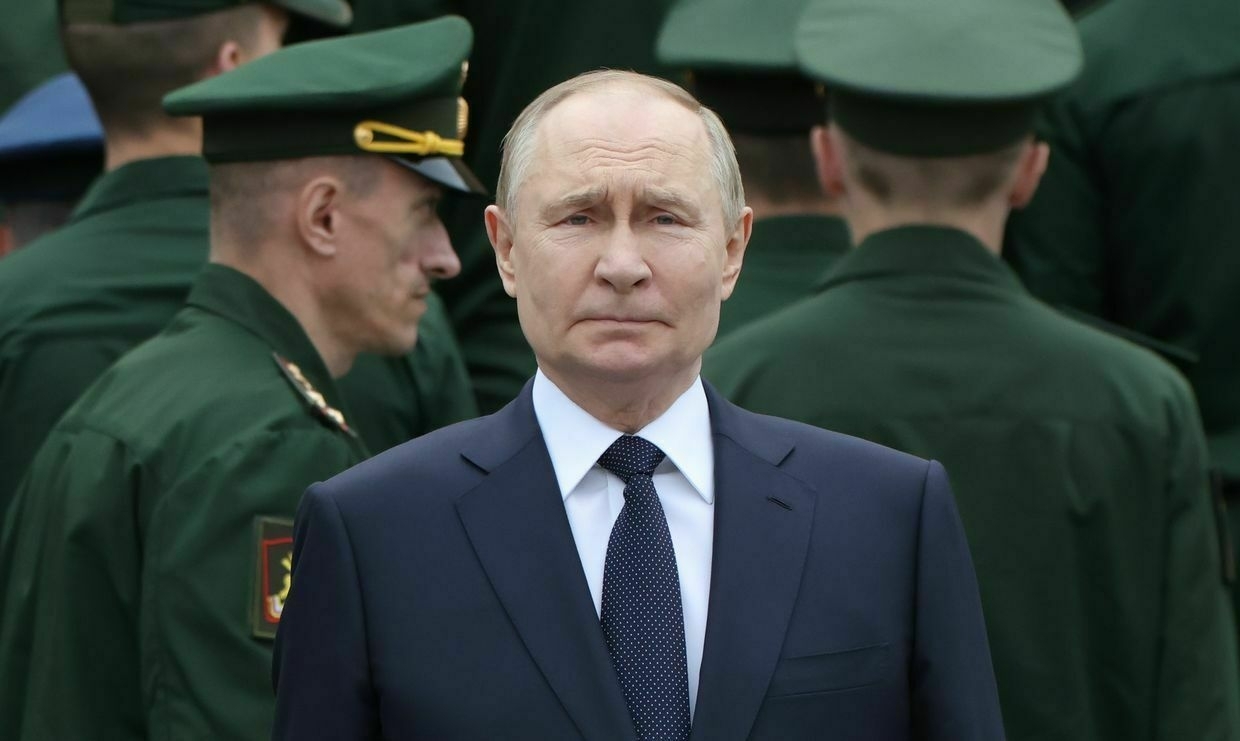
Charm offensive, aimed at TrumpTo say that The Hague summit took place at a precarious moment would be an understatement.
NATO is gripped by what is arguably its greatest existential crisis yet, and the most challenging security situation since the Cold War.tes
Since taking office, Trump has signaled plans to reduce military presence in Europe and cast doubt on his commitment to Article 5 – including just before his trip to the summit.
As Trump’s attention wanders away from Europe and Ukraine to the Israel-Iran conflict and other regions, Europeans are left to grapple with the fears that they might have to face Russian aggression on their own.
“Mr President, dear Donald, Congratulations and thank you for your decisive action in Iran, that was truly extraordinary, and something no one else dared to do. It makes us all safer.”
Perhaps that is why NATO leaders were so dead set on bringing Trump to the summit.
As the Kyiv Independent learned from a Ukrainian official, member countries pulled out all the stops to get Trump to attend, giving him a king’s treatment during the dinner and keeping the summit deliberately short.
Leading this charm offensive was the secretary general himself.
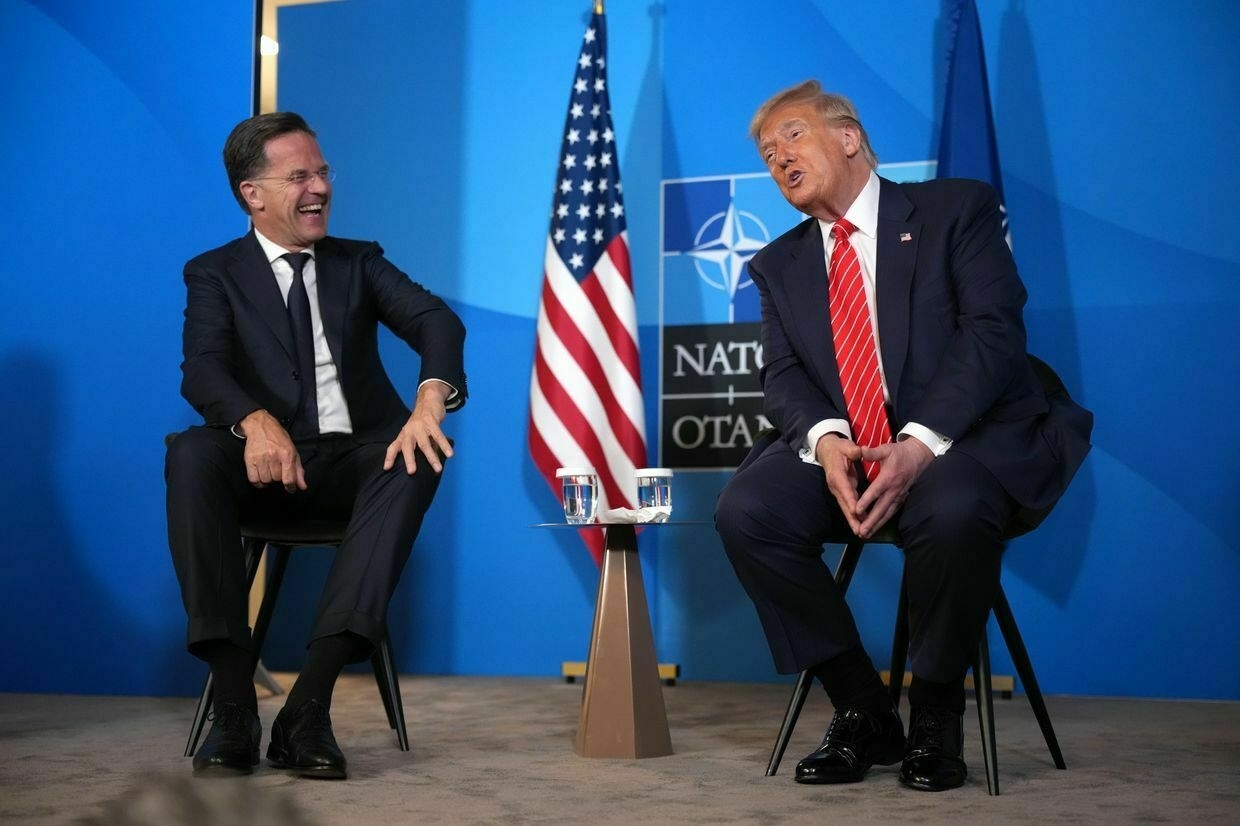
U.S. President Donald Trump (R) and NATO Secretary General Mark Rutte (L) speak to media at the start of the second day of the 2025 NATO Summit in The Hague, Netherlands, on June 25, 2025. (Andrew Harnik / Getty Images) 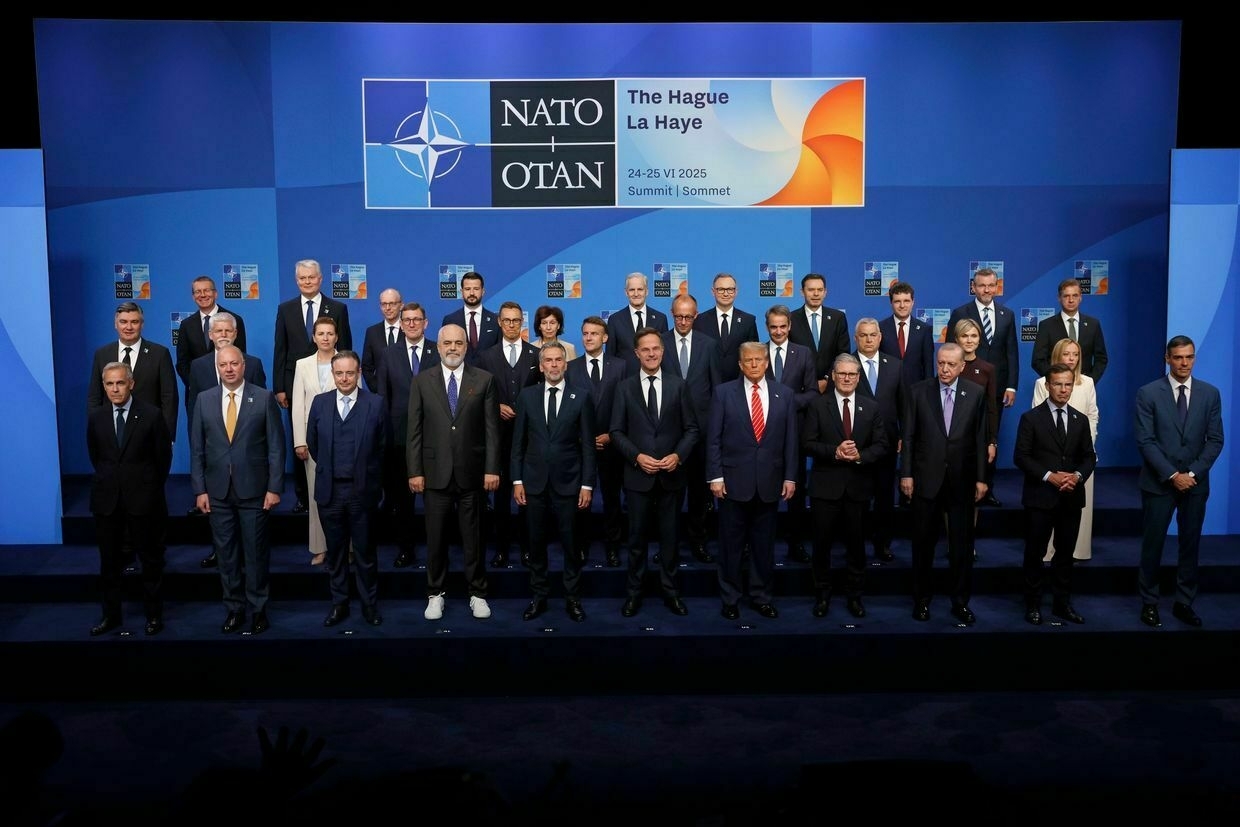
NATO heads of state and government pose for an official photo on the second day of the 2025 NATO Summit in The Hague, Netherlands, on June 25, 2025. (Omar Havana / Getty Images) “Mr President, dear Donald, Congratulations and thank you for your decisive action in Iran, that was truly extraordinary, and something no one else dared to do. It makes us all safer,” Rutte wrote in a message to Trump ahead of the summit, which the U.S. president promptly published.
“Europe is going to pay in a BIG way, as they should, and it will be your win,” he continued, referring to an agreement to raise the defense spending benchmark to 5% of GDP in a style strikingly similar to Trump’s.
Asked by a journalist whether the revelation of this text was not embarrassing for him, Rutte only doubled down, jokingly referring to Trump as a “daddy” during a briefing.
The summit’s focus on defense spending was likely a deliberate offering to Trump, who has lambasted European allies as underpaying freeloaders. When Rutte managed to get a unanimous agreement on the new spending target despite protests from Spain, he had a big win to present to Trump.
"Your leadership on this has already produced $1 trillion in extra spending from European allies since 2016. And decisions today will produce trillions more for common defense,” Rutte told Trump during the summit.
Trump has not been alone in this criticism. NATO’s eastern members, who devote considerably more to defense than their western and southern partners, echoed the sentiment.
“I totally agree with President Trump… Europe must pay more, Europe must take more responsibility for its own defense,” Tsakhna said.
“Europe has been like an old, lazy cat who was just waiting for something bad to happen, and the U.S. would come and solve the problems.”
Rutte's strategy seemed to have paid off. Trump appeared in good spirits, praising the new defense pledge while enjoying a flurry of questions from journalists that, in the absolute majority, focused on recent U.S. strikes on Iran.
Trump also signed off on the final statement that reaffirmed commitment to Article 5, mollifying his earlier comments.
Ukraine sidelinedWhile the final communique of the NATO summit in Washington last year was 38 paragraphs long, with six devoted to support for Ukraine, this year’s joint declaration was a mere five paragraphs.
The document did name Russia as a threat to the Euro-Atlantic security and reaffirmed support for Kyiv, but stopped short of condemning Moscow, mentioning Ukraine’s NATO aspirations, or offering any concrete new assistance.
This did not come as a surprise. Already in the runup to the summit, Bloomberg reported that the joint communique would omit these topics to avert friction with the U.S. president, who has been averse to offending Russia.
Rutte used the summit to repeat the familiar pledge that Ukraine’s path toward NATO is “irreversible,” but it was obvious that Kyiv’s accession, openly opposed by Trump, would not see any development in the near future.
Even as Russia launched a brutal aerial attack against Dnipro during the summit, which killed 19 people and injured 300, NATO offered Ukraine little but words.
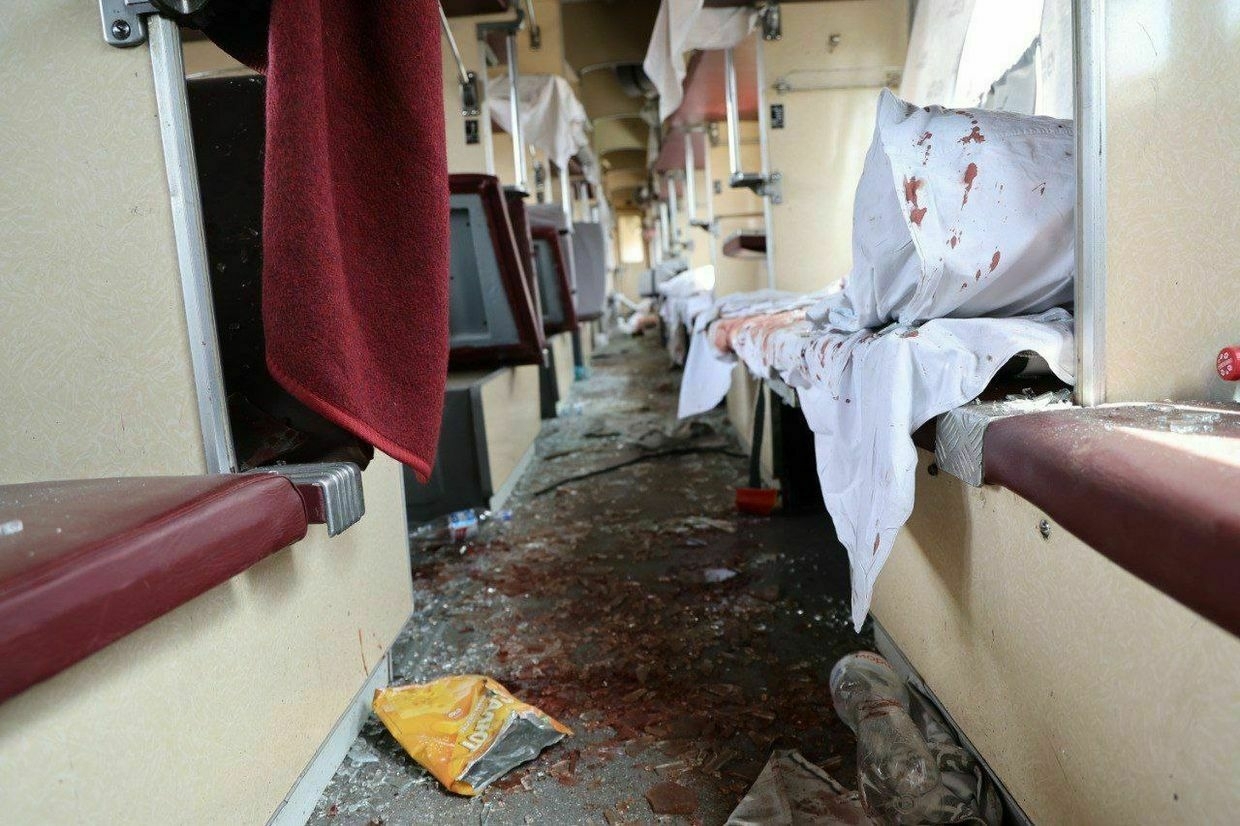
The aftermath of a Russian ballistic missile attack damaged a passenger train in Dnipro, Ukraine, on June 24, 2025. (Serhii Lysak / Telegram) What Ukraine received at this year’s NATO summit was a far cry from the bold pledges made last year in Washington.
But the meeting passed without any visible friction between Trump and his Ukrainian and European partners, with Ukraine even grabbing a few modest wins.
In the era of Trump, that might be a success of itself.
Asami Terajima contributed to reporting.Note from the author:
Hi, this is Martin Fornusek. I hope you enjoyed this article. If you want to help us continue covering crucial events like the NATO summit in The Hague, please consider becoming our member.
Thank you very much.
-
Diplomacy or deal-making? Unpacking the U.S.-Belarus prisoner deal
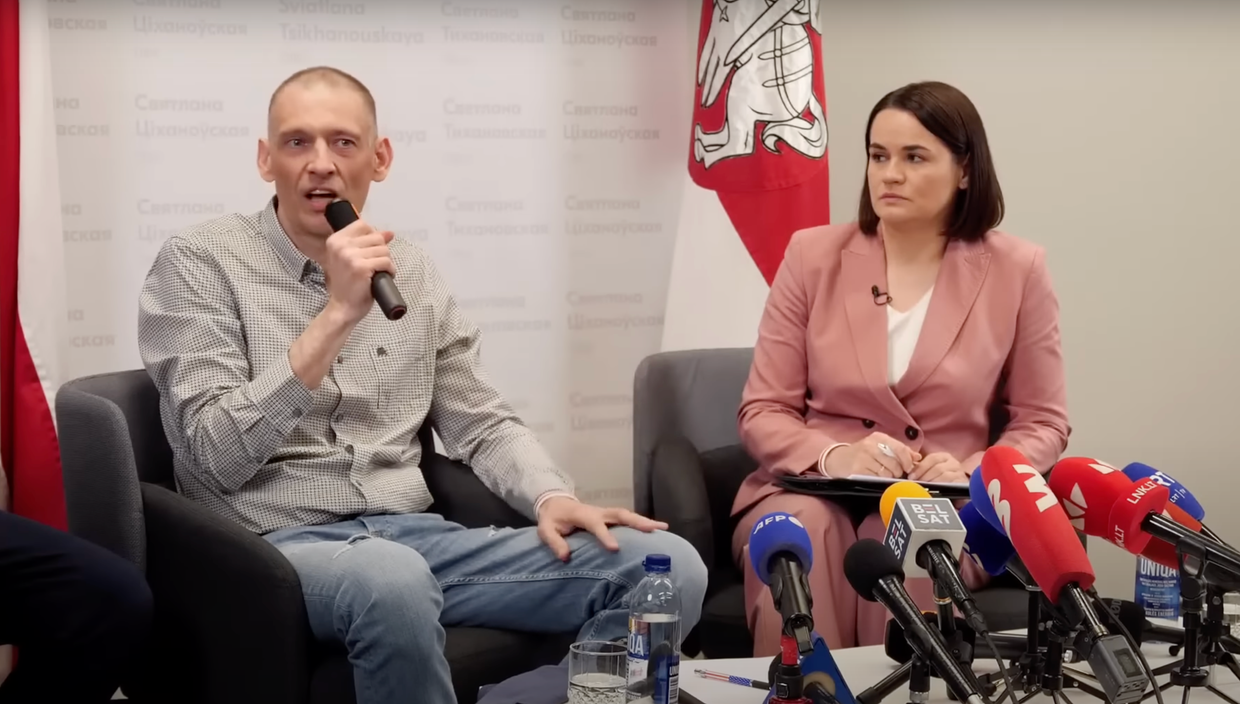
After a high-level U.S. visit to Belarus led to the release of 14 prisoners, observers have been left wondering what autocrat Alexander Lukashenko may have secured in return.
U.S. President Donald Trump’s special envoy to Ukraine and Russia Keith Kellogg’s visit to Minsk on June 21 marked the highest-level diplomatic contact the isolated regime of Alexander Lukashenko had with the U.S. in years.
The trip was also marked by the freeing by the Lukashenko regime of 14 prisoners, including one of the most notable of Lukashenko’s political opponents — Siarhei Tsikhanouski.
With the released prisoners in the spotlight, both parties to the negotiations were vague regarding the results of the meeting. But members of the Belarusian opposition in exile and political analysts all agreed Lukashenko was seeking some form of international legitimacy, as well as sanctions relief.
“For Lukashenko, the visit is a fairly strong legitimizing step,” said Lesia Rudnik, the director of an exiled independent Belarusian think tank, the Center for New Ideas.
“I believe we’re at the beginning of a dialogue … but I think we’ll see a rather slow development of the situation.”
Lukashenko has been ostracized by the West over his support for Russia’s war against Ukraine and brutal suppression of freedoms in Belarus. His international contacts have been limited to China, Vietnam, Iran, and African states that have minimal trade turnover with Belarus, and, increasingly, local Russian officials. The only Western nations that have thus far broken the diplomatic freeze are Russia-sympathetic EU states Hungary and Slovakia.
As for the U.S., analysts suggest Washington could have been looking to deter deeper Belarusian involvement in the war, while also possibly securing a foreign policy win for Trump amid stalled peace negotiations between Kyiv and Moscow.
Carefully choreographed breakthroughThe trail to Kellogg’s top-level meeting in Minsk was blazed nearly a year ago under the administration of former U.S. President Joe Biden, with low-profile behind-the-scenes meetings and occasional prisoner releases.
The most tangible result of Kellogg’s mission was the sudden freeing of 14 prisoners, including Tsikhanouski, former RFE/RL journalist Ihar Karnei, and citizens of Estonia, Latvia, and Poland, who were released from prisons in Belarus and delivered to neighboring Lithuania. U.S. President Donald Trump marked the release with a celebratory post on his social media platform, Truth Social.
“President Trump now has the power and opportunity to free all political prisoners in Belarus just like that. And I ask him to do so.”
Once seen as an unlikely candidate for early release, Tsikhanouski was freed after serving five years of a nearly 20-year sentence. Jailed ahead of Belarus’s 2020 presidential election, his arrest prompted his wife, Sviatlana Tsikhanouskaya, to run in his place. Despite election observers finding she had won the election, Lukashenko claimed victory, sparking mass protests in Belarus that lasted for months.
At a press conference in Vilnius following his release, Tsikhanouski appealed to Trump to help free other political prisoners in Belarus.
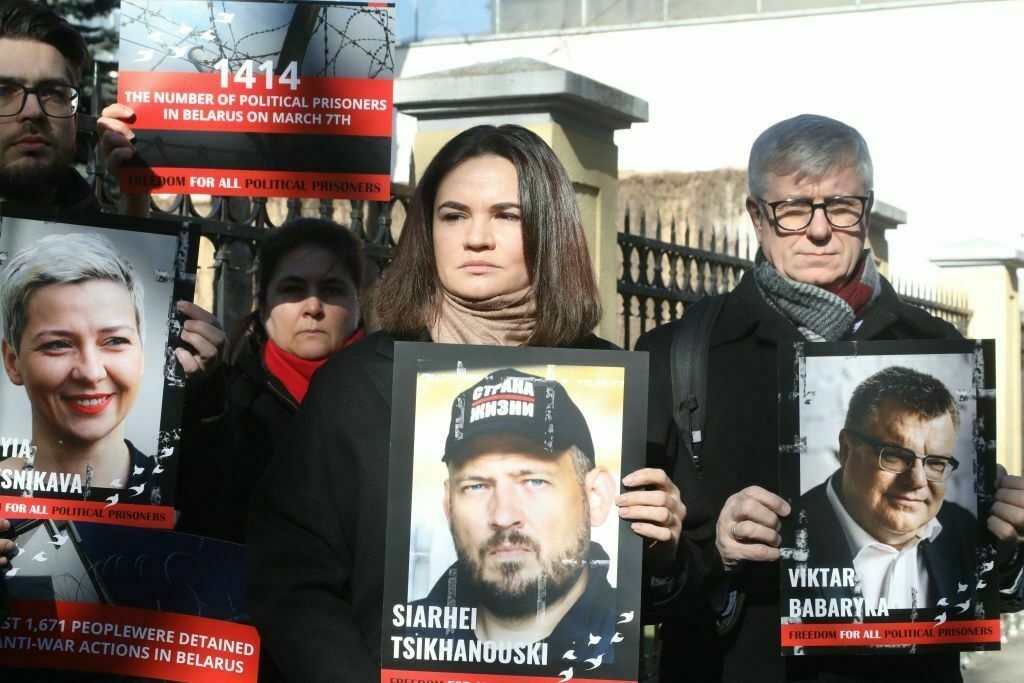
Sviatlana Tsikhanouskaya holds a photo of her jailed husband Siarhei Tsikhanouski as other demonstrators display images of Belarusian opposition figures Maria Kalesnikava and Viktar Babaryka during a protest in front of the Belarusian Embassy in Vilnius, Lithuania, on March 8, 2024. (Petras Malukas / AFP via Getty Images) “President Trump now has the power and opportunity to free all political prisoners in Belarus just like that. And I ask him to do so,” Tsikhanouski said.
Sviatlana Tsikhanouskaya, who, since being forced into exile, has led the Belarusian opposition, hailed the releases, pledging to “continue to work closely with President Trump’s administration and with all our allies on both sides of the Atlantic to achieve the freedom of every political prisoner.”
European leaders, including EU Commission President Ursula von der Leyen, European Parliament President Roberta Metsola, Polish Foreign Minister Radoslaw Sikorski, and others, also welcomed the U.S. diplomatic efforts and the freeing of the political prisoners.
Following four years of continuous, harsh repression, Lukashenko suddenly pardoned 18 political prisoners in July 2024, then continued to release small batches of political prisoners every month for half a year. Tsikhanouski said he had heard talk of his potential release in August 2024.
In February, U.S. Deputy Assistant Secretary of State Christopher W. Smith made an unannounced visit to Belarus, securing the release of a U.S. citizen and two Belarusian political prisoners.
John Coale, Kellogg’s deputy, during a low-profile visit to Minsk in May facilitated the release of dual U.S.-Belarusian citizen Yuras Ziankovich. The earlier contacts paved the way for Kellogg’s high-profile visit, accompanied by Smith and Coale.
The publicity surrounding the visit indicates that the parties “have reached a minimum level of mutual trust,” commented Valery Kavaleuski, a former Belarusian diplomat and ex-member of Tsikhanouskaya’s shadow cabinet. He is currently advocating for the release of political prisoners as the head of the Euro-Atlantic Affairs Agency.
Restoring ties?One thing Belarusian officials did signal was that they expect more in return, including full restoration of bilateral ties and sanctions relief.
Belarus’s permanent representative to the United Nations, Valentin Rybakov, on state-owned Belarusian television after the Kellogg meeting, said that Minsk seeks to “normalize” bilateral relations with the U.S., which would entail the full resumption of embassy operations in both countries and exchanges of visits by officials.
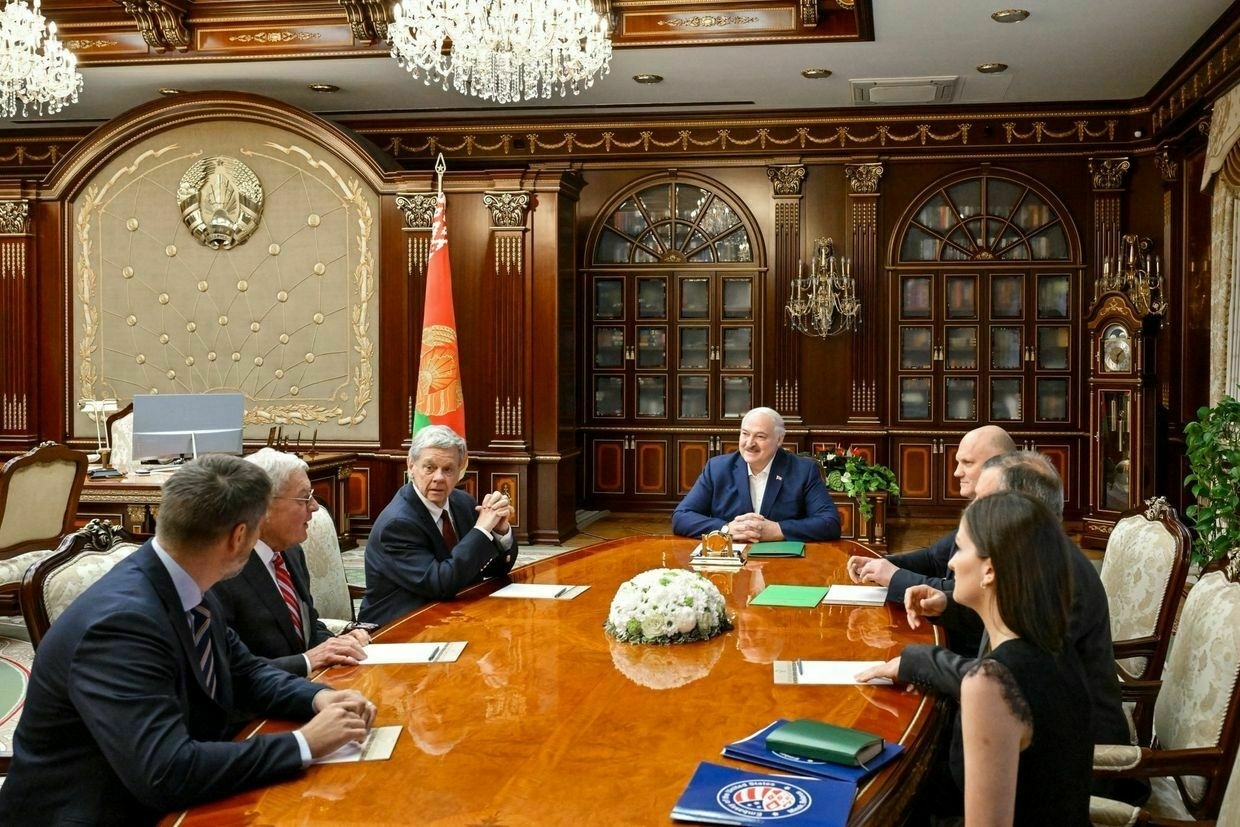
Alexander Lukashenko (C) meets with U.S. presidential envoy Keith Kellogg and members of the American delegation in Minsk, Belarus, on June 21, 2025. (X/Keith Kellogg) The U.S. withdrew its diplomats and shut down embassy operations in Minsk in February 2022, following Russia’s full-scale invasion of Ukraine, which involved the use by the Russian military of Belarusian territory. According to Kavaleuski, the reopening of the embassy lies within U.S. interests in observing and gathering information on the ground. Reopening at the Charge d'Affaires level, as opposed to the ambassadorial level, does not imply any formal recognition of Lukashenko’s legitimacy.
“Without Europe's participation, the ‘de-isolation’ of the Belarusian regime will not be as effective.”
On sanctions relief, Rybakov and Natallia Esismant, Lukashenko’s press secretary, noted that this had been among the priority topics of the discussion. The New York Times also reported that the matter was discussed during Khristopher Smith’s visit to Belarus in February.
“According to our information, Lukashenko is setting a condition for the lifting of the American sanctions on (potash producer) Belaruskali,” opposition activist and leader of the People’s Anti-Crisis Management initiative, Pavel Latushka, told the Kyiv Independent.
“The second is the financial sector, which enables financial payments,” he added. “The third is the Belavia (…) aircraft fleet, which includes (Lukashenko’s) planes.”
In 2019, before Belarus spiraled into political turmoil, potash, its top export, brought in approximately $2.9 billion in export revenues. After the EU and U.S. export restrictions were put in place, Belarus’s share of the global potash market dropped from 18% in 2021 to 8% in 2023, according to the International Food Policy Research Institute. Around 5% of the market was lost in the United States.
“But without Europe's participation, the ‘de-isolation’ of the Belarusian regime will not be as effective,” Rudnik from the Center for New Ideas told the Kyiv Independent, noting that while the U.S. can cancel its own sanctions, Washington would have to lobby for their relief in Europe.
Analysts agree that to restore the flow of this crucial export, Belarus needs to ease European sanctions and overcome opposition from Lithuania, home to Klaipeda seaport, formerly the chief transit hub for Belarusian potash.
Initially introduced in 2021 for human rights abuses, European sanctions on Belarusian potash were re-qualified as sanctions for Minsk’s support for Russia’s war against Ukraine, making them impossible to cancel until the war ends, former diplomat Kavaleuski says, citing his recent exchanges in Brussels.
Belarus, in contrast, expects reciprocal steps and a "good-neighborly approach” after releasing citizens of Estonia, Latvia, and Poland, said Belarus’s KGB Chief Ivan Tsertsel on state-run media, in an apparent reference to European opposition to sanctions relief. Notably, no Lithuanian citizens were included in the release.
But the European Union has so far shown no inclination to reduce restrictions on Lukashenko. Quite the opposite: the 18th sanctions package, recently blocked by Hungary and Slovakia, proposes to ban all transactions with Belarusian banks, further tightening restrictions against Belarus.
"It’s Lukashenko who pushes Belarus closer to Russia because it’s comfortable for him."
And Lithuania, one of the EU member states with the strongest voice on the Belarusian issue, sees no grounds for reconsidering sanctions yet, according to Lithuanian Foreign Minister Kęstutis Budrys. Aware of the potential for a veto by Hungary or Slovakia on Europe-wide sanctions, the Baltic state is developing legislation for national economic sanctions that would provide for the introduction of personal and sectoral restrictions.
While thankful for the release and hopeful for more good news, the Belarusian opposition is cautious about rewarding the regime too soon.
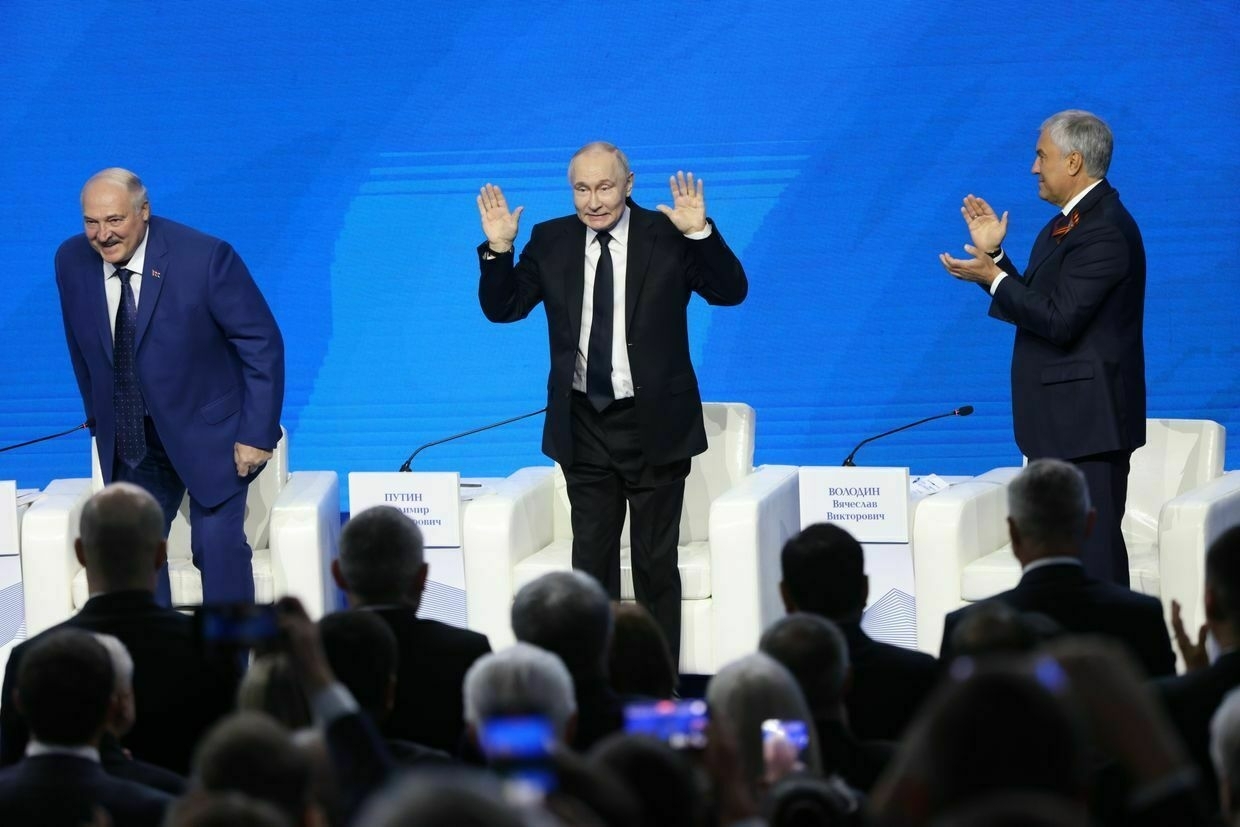
Russian President Vladimir Putin (C), Belarusian President Alexander Lukashenko (L), and State Duma Chairman Vyacheslav Volodin (R) attend the Great Heritage – Common Future Forum in Volgograd, Russia, on April 29, 2025. (Contributor / Getty Images) “Naturally, if the repression stops, and all the prisoners are released, it would open new possibilities, and one could talk about certain relief from the American sanctions,” Tsikhanouskaya’s advisor Viachorka says, adding that at this point, only 1.5% of the country’s 1,100 political prisoners have been released through U.S. mediation.
“There’s no trust in Lukashenko,” said exiled activist Latushka, who is known for his more hawkish approach to contacts with the Lukashenko regime.
“Over the 30 years of his rule, Lukashenko has repeatedly used this scheme of easing sanctions by making cosmetic concessions to the West.”
Latushka argues that sanctions should be eased only after the release of all political prisoners, a halt to repression, and the decriminalization of political life within the country. Even after that, restrictions should be suspended but not cancelled to ensure the possibility of swift reinstatement in case of backsliding by Minsk, he said.
But having released 14 prisoners, Belarusian KGB Chief Tsertsel reported that another 14 foreign and Belarusian citizens had been arrested in Belarus on charges of espionage and high treason in 2025 — in a sign the regime's "conveyor belt" of repression has far from slowed down.
Washington's interest in MinskFollowing his visit to Minsk, Kellogg shared that while his deputy John Coale led discussions on the release of prisoners, he had focused on the Russia-Ukraine War.
“We know Trump is, first and foremost, a dealmaker, and secondly, that success is important to him,” Rudnik said of the interest of the Trump administration in dealing with Belarus.
“And when this does not happen for a long time, especially when he promised so much in his election campaign, it becomes necessary to compensate for the lack of these victories with smaller victories, perhaps even a lot of them,” she said.
Observers interviewed by the Kyiv Independent do not believe Belarus could serve as a credible platform for the stalled Russian-Ukrainian peace negotiations — an idea that has been floated by the Kremlin, but flatly rejected by Ukrainian President Volodymyr Zelensky over Belarus's complicity in the war.
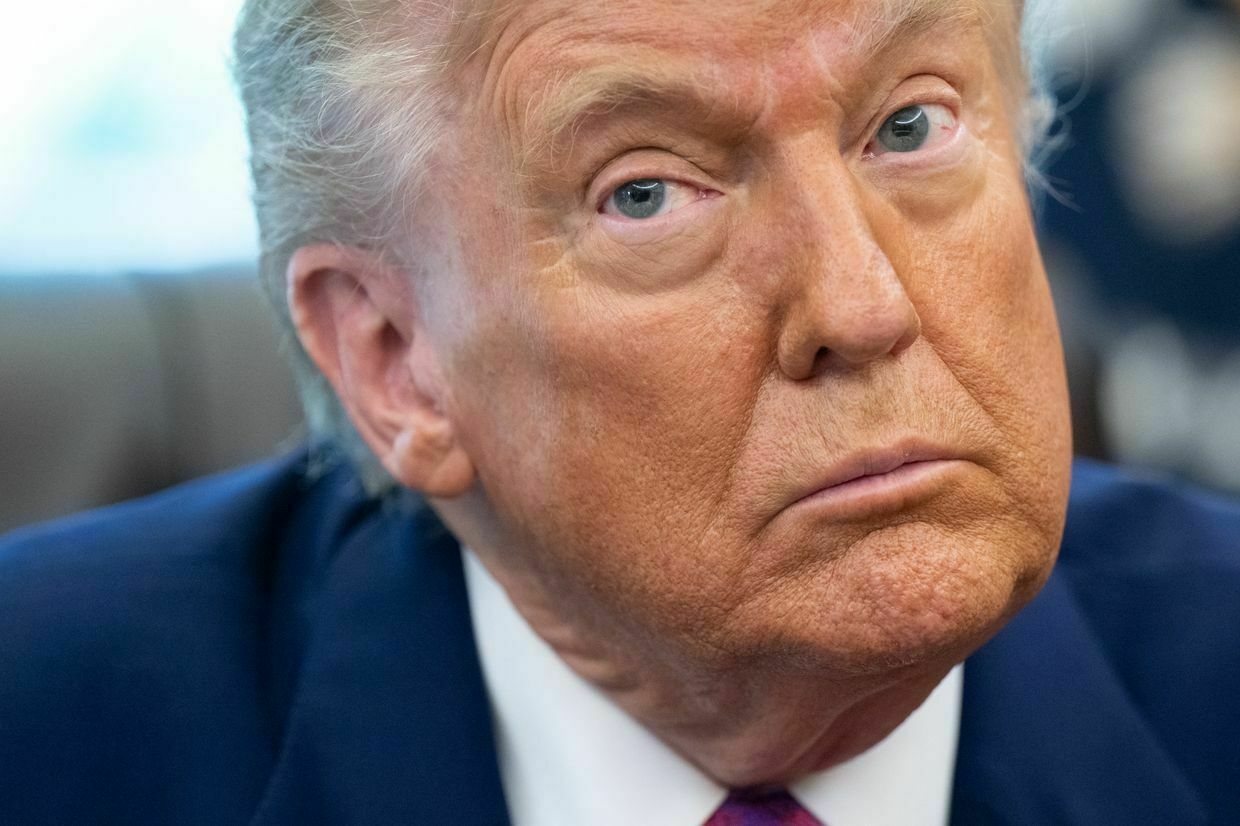
U.S. President Donald Trump at the White House in Washington, DC, on June 10, 2025. (Saul Loeb / AFP via Getty Images) While not having sent his troops into battle in Ukraine, Lukashenko let the Russian army use Belarusian territory to mount attacks on Ukraine at the start of the invasion. He also reoriented the Belarusian military-industrial complex to serve Russian defense contracts, according to a recent report by the Belarusian opposition group Belpol.
Aside from “scoring a win” easier than stopping Russia’s war, Washington may have warned Belarus against becoming more deeply engaged in the Kremlin’s war against Ukraine, or escalating tensions with the NATO and EU member states bordering Belarus, analysts suggest.
“Belarus is strategically placed on NATO’s eastern flank between Russia and western states,” Tsikhanouskaya’s advisor Viachorka says. “The less of a threat Belarus is, the less defense spending for America.”
Belarus is set to host the Zapad-2025 (West 2025) joint military drills with Russia in September. After the Russia-Belarus Union Resolve 2021 drills were used to disguise the buildup of Russian troops ahead of an all-out invasion, any joint drills in Belarus are now seen as a serious cause for concern among its neighbors.
In an apparent effort to assuage those fears, in May, Belarusian Defense Minister Viktar Khrenin announced the drills would involve fewer troops and would be held at a location further from the border.
The Kellogg visit, Latushka believes, also had the aim of determining whether Lukashenko is capable of altering his domestic or foreign policy, and the extent of the Kremlin’s influence over him.
Americanist and advisor to the Euro-Atlantic Affairs Agency Anton Penkovski told the Kyiv Independent that the Trump administration might be considering the possibilities for the “Finlandisation” of Belarus, a term that implies Minsk would loosen its military ties with Moscow without fully breaking off ties.
And while having nothing to lose in the event of negotiations failing, U.S. diplomats might also have been investigating Lukashenko’s ability to act independently and engage in separate negotiations in the event of Russia being weakened.
Indeed, Washington has a history of engaging with Minsk at times when tensions with Moscow heighten.
Viachorka, however, is not so sure.
“We often hear the message that we need to save Lukashenko from Russia, including from Belarusian propaganda,” he says. “But it’s Lukashenko who pushes Belarus closer to Russia because it’s comfortable for him.”
Subscribe to the NewsletterBelarus Weekly<span data-sanitized-id="belarus-weekly-info" data-sanitized-class="belarusWeekly__info"></span> <button data-sanitized-id="belarus-weekly-subscribe-btn" data-sanitized-class="belarusWeekly__form_button"> <span data-sanitized-class="belarusWeekly__form_label">Join us</span> <path d="M4.45953 12.8114H7.90953C8.00052 12.8127 8.09085 12.7958 8.17517 12.7616C8.25949 12.7274 8.3361 12.6766 8.40044 12.6123C8.46478 12.548 8.51556 12.4714 8.54975 12.387C8.58395 12.3027 8.60088 12.2124 8.59953 12.1214C8.58173 11.9269 8.48974 11.7467 8.34265 11.6183C8.19555 11.4898 8.00465 11.4229 7.80953 11.4314H4.45953C4.27653 11.4314 4.10103 11.5041 3.97163 11.6335C3.84223 11.7629 3.76953 11.9384 3.76953 12.1214C3.76953 12.3044 3.84223 12.4799 3.97163 12.6093C4.10103 12.7387 4.27653 12.8114 4.45953 12.8114Z" fill="white"></path> <path d="M8.6 15.0114C8.60135 14.9204 8.58442 14.83 8.55022 14.7457C8.51603 14.6614 8.46525 14.5848 8.40091 14.5205C8.33656 14.4561 8.25996 14.4053 8.17564 14.3711C8.09131 14.3369 8.00098 14.32 7.91 14.3214H2.69C2.507 14.3214 2.3315 14.3941 2.2021 14.5235C2.0727 14.6529 2 14.8284 2 15.0114C2 15.1944 2.0727 15.3699 2.2021 15.4993C2.3315 15.6287 2.507 15.7014 2.69 15.7014H7.81C8.00511 15.7099 8.19602 15.643 8.34311 15.5145C8.49021 15.386 8.5822 15.2058 8.6 15.0114Z" fill="white"></path> <path d="M24.4202 6.01122H7.55022C7.43403 5.99626 7.31641 5.99626 7.20022 6.01122L7.08022 6.06122C6.85578 6.16602 6.66595 6.33276 6.53308 6.54181C6.4002 6.75086 6.32982 6.99352 6.33022 7.24122C6.32744 7.43266 6.36832 7.62222 6.44976 7.79549C6.5312 7.96876 6.65105 8.1212 6.80022 8.24122L12.5802 13.4512L6.89022 18.7112C6.71923 18.8375 6.57973 19.0016 6.4826 19.1907C6.38546 19.3797 6.33331 19.5887 6.33022 19.8012C6.32652 20.0535 6.3952 20.3015 6.52812 20.516C6.66105 20.7304 6.85264 20.9023 7.08022 21.0112C7.14691 21.0484 7.21729 21.0786 7.29022 21.1012C7.46476 21.1609 7.64625 21.1979 7.83022 21.2112H24.5102C24.8263 21.2048 25.1378 21.1355 25.4268 21.0074C25.7158 20.8792 25.9763 20.6948 26.1932 20.4648C26.4101 20.2349 26.579 19.9641 26.6901 19.6681C26.8012 19.3722 26.8522 19.0571 26.8402 18.7412V8.47122C26.8278 7.82952 26.5701 7.21694 26.12 6.7594C25.6699 6.30185 25.0616 6.03412 24.4202 6.01122ZM8.57022 8.08122L7.92022 7.49122H24.4202L16.4902 14.6812C16.407 14.7305 16.312 14.7565 16.2152 14.7565C16.1185 14.7565 16.0235 14.7305 15.9402 14.6812L8.57022 8.08122ZM7.73022 19.7912L8.48022 19.1112L13.4802 14.5812L14.8802 15.8612C15.1804 16.157 15.5793 16.3315 16.0002 16.3512C16.4212 16.3315 16.82 16.157 17.1202 15.8612L18.5202 14.5812L24.2002 19.8012H7.73022V19.7912ZM25.3502 18.7112L19.6602 13.5912L25.3502 8.37122V18.7112Z" fill="white"></path> </button> </div>Why Russian economy warnings might be the only thing out of Moscow you can actually believeIn a rare public sign that all is not well in Russia, two high-ranking Moscow officials last week issued separate warnings about the state of the country’s economy. Russian Central Bank Governor Elvira Nabiullina and Economy Minister Maxim Reshetnikov both highlighted that amid the Kremlin’s full-scale war against Ukraine, the tools Moscow once relied on to maintain wartime growth are nearly exhausted. Almost immediately, Russian President Vladimir Putin on June 20 dismissed the concerns, clai The Kyiv IndependentTim Zadorozhnyy
The Kyiv IndependentTim Zadorozhnyy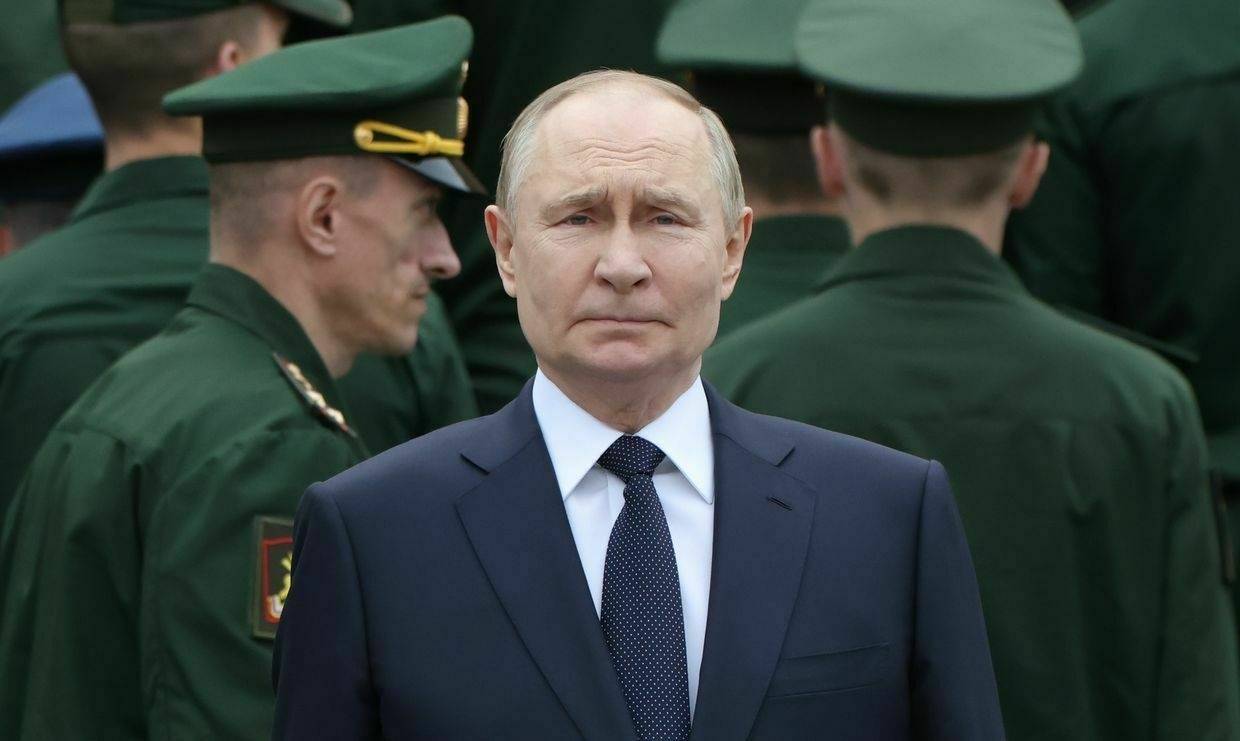
As Ukraine bleeds, Western opera welcomes back pro-Putin Russian singer Anna Netrebko
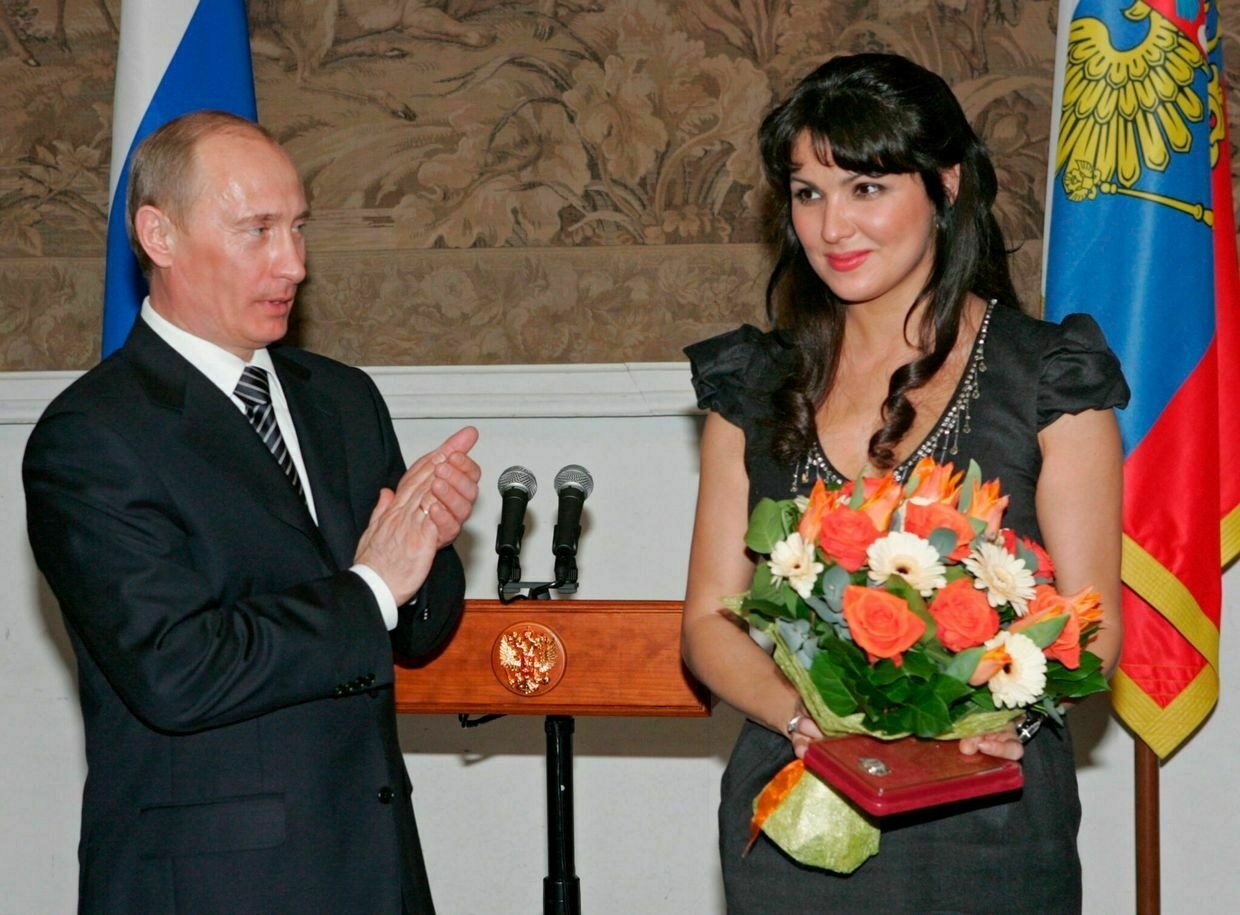
More than three years into Russia’s full-scale war against Ukraine, many Western cultural institutions that had distanced themselves from Russian artists as a gesture of solidarity with Ukraine are now reversing course.
The U.K.’s Royal Ballet and Opera House announced on June 23 that its 2025-2026 cinema season, which is screened across 1,500 cinemas around the world, will kick off in early October with a performance of “Tosca” starring Russian soprano opera singer Anna Netrebko.
Once a leading figure in the opera world, Netrebko saw her performances canceled after 2022, following a history of remarks where she praised Russian President Vladimir Putin and defended Russian imperialism.
Though she issued a statement condemning the full-scale invasion that year, Netrebko has stopped short of ever directly criticizing Putin, who granted her Russia’s highest artistic honor — the title of People’s Artist — in 2008.Since the start of the full-scale invasion, many Ukrainians have argued that Russian culture can’t be separated from the country’s history of imperialism — a worldview they say is deeply embedded in its literature, music and art, and continues to fuel its aggression toward Ukraine and beyond.
What’s wrong with NetrebkoFollowing Russia’s full-scale invasion of Ukraine in 2022, the Metropolitan Opera in New York canceled a series of scheduled performances by Netrebko, reportedly expecting her to publicly denounce Putin.
In response, Netrebko filed a lawsuit in 2023 seeking at least $360,000 in damages and accusing the Met of defamation and breach of contract.
While she spoke out against the full-scale war in a statement from May 2022, Netrebko also declared “I love my homeland of Russia and only seek peace and unity through my art.”
Netrebko has repeatedly expressed views and took actions prior to 2022 that signaled admiration — even support — for the Russian authoritarian regime.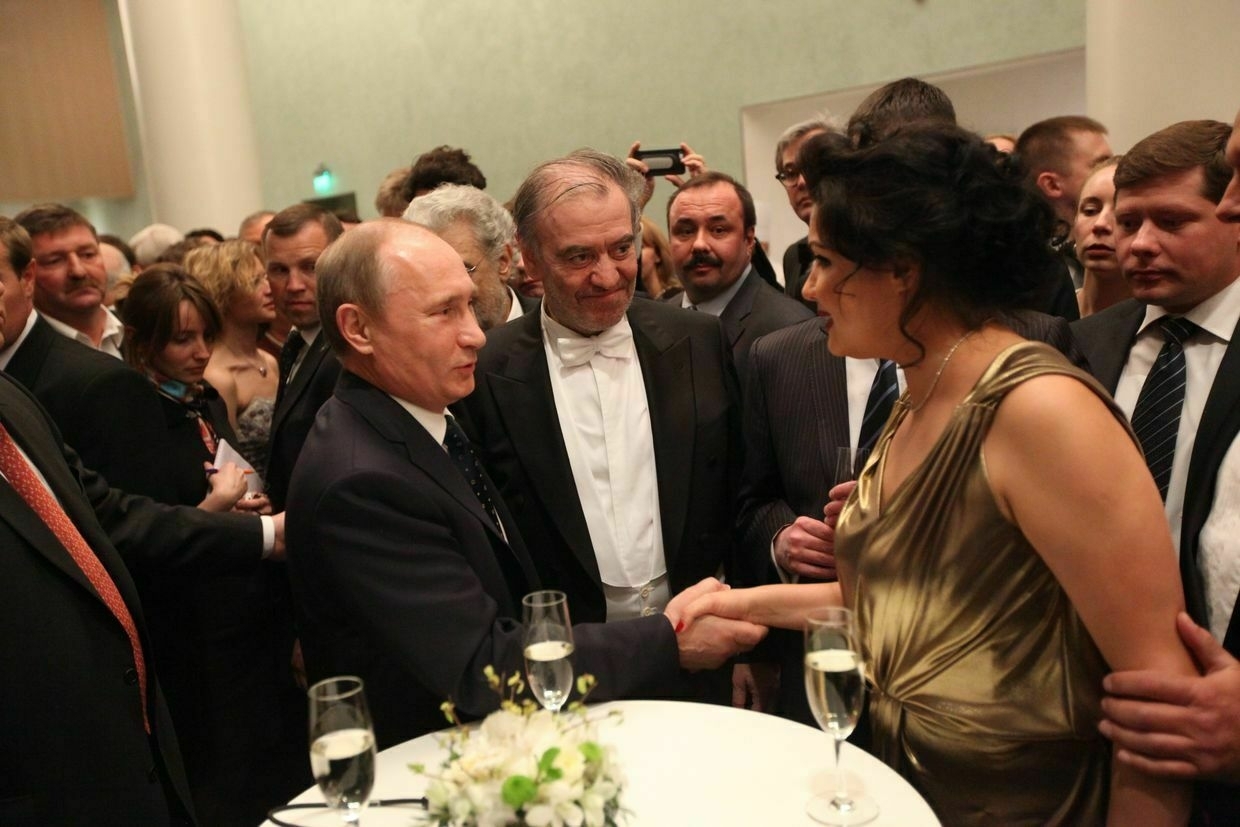
Russian President Vladimir Putin, conductor Valery Gergiev, and singer Anna Netrebko attend the opening of the new Mariinsky II Theatre in St. Petersburg, Russia, on May 2, 2013. (Sasha Mordovets / Getty Images) “I think she is always doing what benefits her career. Until 2022, being Putin’s ‘court soprano’ and a protege of conductor Valery Gergiev — another pillar of the Kremlin’s influence in the world, who was sanctioned by the government of Canada just few days ago — was very good for her,” Ukrainian classical pianist Pavlo Gintov, who lives and performs in the West, told the Kyiv Independent.
“Since 2022, Netrebko has been trying to balance two worlds: continuing her performances in the West while avoiding an open break with Putin’s regime. And, as you can see, so far she has been quite successful.”
After Russia’s invasion of Georgia, Netrebko told Russian state media in 2009, “I am always unambiguously for Russia,” dismissing international coverage of the war as “extremely negative” attacks on her country.
While Western cultural institutions rekindle ties with Russian artists, Ukrainian artists continue to be killed.
In a Newsweek profile from 2011, Netrebko laughed off rumors from the Russian tabloids claiming she had been Putin’s lover, adding “I’d love to have been” and that “he’s a very attractive man” with “strong, male energy.”
In 2014, Netrebko made a donation of one million rubles to an opera house in Russian-occupied Donetsk, claiming it was an act of solidarity for her fellow artists suffering from the war and that there was nothing political about it.
However, she was photographed alongside Oleg Tsaryov, a pro-Russian Ukrainian politician, at the event in St. Petersburg where she made the donation. Both were seen holding the flag of the Russian occupation forces in Donetsk.
Putin praised Netrebko's "life-affirming spirit" and "clear civic stance" in a public tribute marking her 50th birthday in 2021 that was published on the Kremlin's website.
“Only a photo with the bandits and their Moscow handlers could be a better illustration of the global disgrace of the Royal Opera House,” wrote Ukrainian Foreign Minister Sergiy Kyslytsya on June 24 on X, formerly known as Twitter, referencing the notorious photo in response to the Royal Opera House’s lineup announcement.
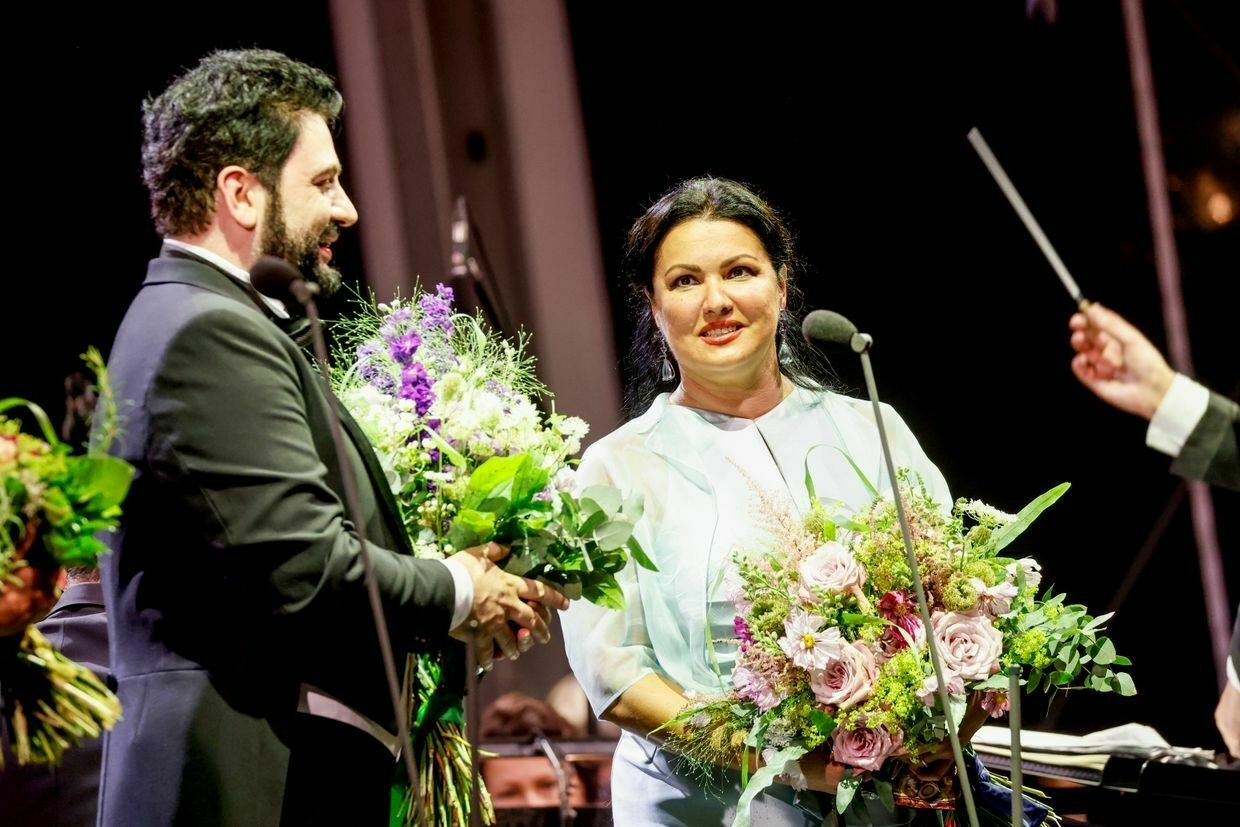
Azerbaijani opera singer Yusif Eyvazov and Russian opera singer Anna Netrebko, perform on stage at the Thurn & Taxis Castle Festival in Regensburg, Germany, on July 23, 2022. (Isa Foltin / Getty Images) 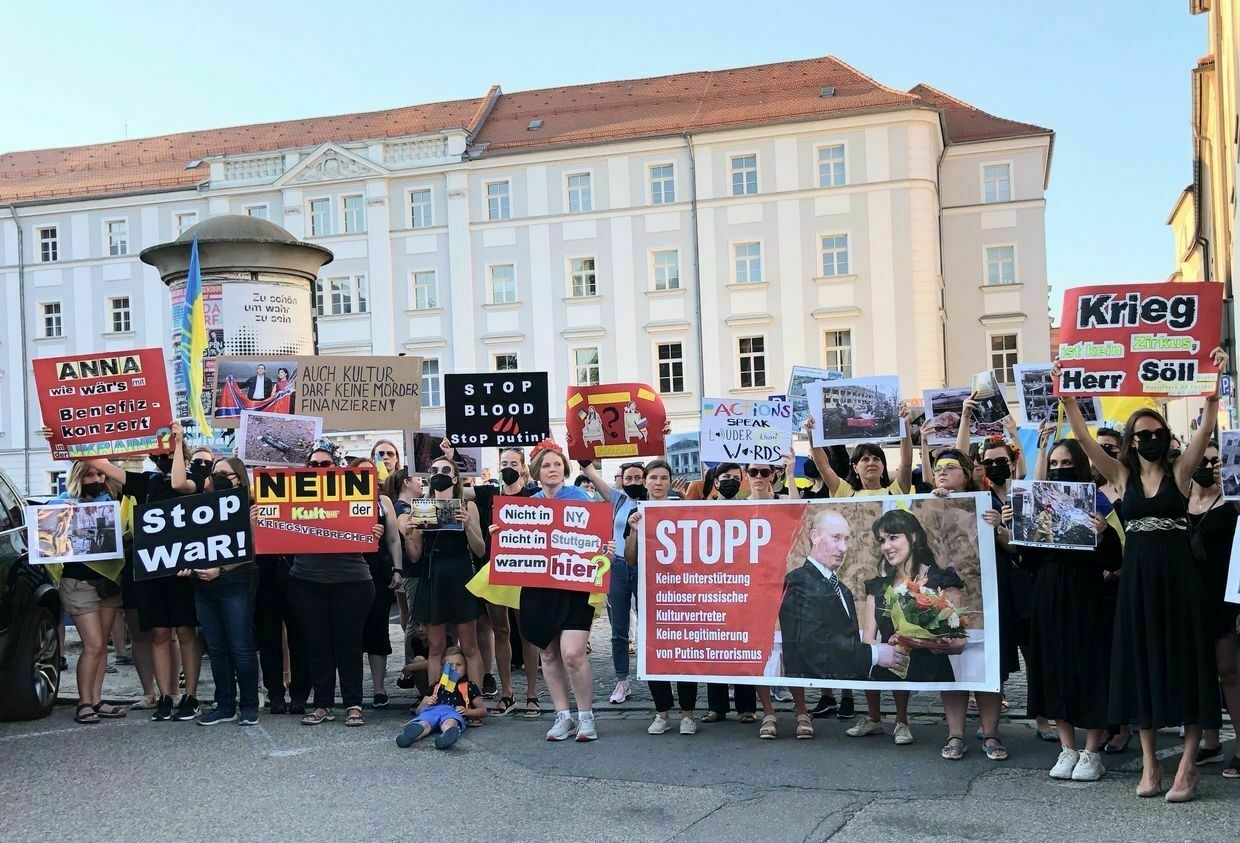
People protest against opera singer Anna Netrebko's appearance at the Schlossfestspiele in Regensburg, Bavaria, Germany, on July 22, 2022. (Ute Wessels / Picture Alliance via Getty Images) Larger trendNetrebko’s return to Western opera marks a tentative shift in the West’s cultural landscape, as institutions begin to welcome Russian artists back more than three years after their country’s full-scale war against Ukraine cast a long shadow over their global standing.
Among these cultural figures are those who support Putin outright, those who oppose the war, or those who are deliberately trying to blur the line between the two.
As Western institutions move toward reintegrating Russian cultural figures into their cultural programs, Moscow has intensified its military campaign against Ukraine, launching record numbers of drones and missiles with increasing frequency, causing greater casualties.
This thaw raises ethical questions about complicity and accountability, such as when Russian actor Yura Borisov’s 2024 Oscar nomination for best supporting actor in the film “Anora.”Previously, Borisov starred in a Russian propaganda biopic about Mikhail Kalashnikov, the inventor of the AK-47, which was filmed in Russian-occupied Crimea and released in 2020.
Though Borisov’s name appeared on a 2022 statement by a Russian film actors’ union opposing the full-scale war, he didn’t mention it once during his major press tour for “Anora.”
(L-R) Russian actor Yura Borisov, Mikey Madison, and Mark Eydelshteyn speak onstage during the 31st Annual Screen Actors Guild Awards at Shrine Auditorium and Expo Hall in Los Angeles, California, U.S. on Feb. 23, 2025. (Matt Winkelmeyer / Getty Images) Russian journalist Anastasia Trofimova also stirred outrage for her documentary “Russians at War,” which she claimed was meant to “humanize” Russian soldiers fighting in Ukraine “beyond the fog of war.”
Ukrainians and their supporters sought to have the film removed from several international film festivals due to Trofimova’s previous involvement with Russian state media and the documentary’s attempt to dissociate Russian soldiers from war crimes committed in Ukraine. Despite these efforts, a number of screenings have taken place.
The film was screened at three festivals in Canada, and although it was pulled from a number of other international festivals over protests, it remained in competition at the Athens International Film Festival in 2024.At the 2025 Photo London Festival, Russian fashion designer and photographer Gosha Rubchinsky presented his new photo book, “Victory Day,” which romanticizes Soviet army imagery that has been used to rally support amid Russians for the war against Ukraine.
While Western cultural institutions rekindle ties with Russian artists, Ukrainian artists continue to be killed — whether in Russia’s daily strikes on cities or while serving on the front line — underscoring the war’s unrelenting toll on Ukraine’s cultural life.For many Ukrainians, the inclusion of Russian cultural figures in the West is extremely painful, Gintov said — an oversight that ignores the painful reality of a nation still fighting for its survival.
“All this is happening while Russian artists like Netrebko — who openly and vocally supported Putin’s policies for many years, including his invasion of Ukraine in 2014 — are gaining applause in Berlin and in London. Something is fundamentally wrong about it.”Note from the author:
Hi there, it's Kate Tsurkan, thanks for reading my latest article. On the same day I wrote this article, I also wrote another about my friend Victoria Amelina, a Ukrainian author who was killed by Russia, posthumously winning a prestigious literary award. It's bitter and surreal to see the world begin to move on from caring about the ways Russian culture and Russian aggression are connected. Of course, this is not to say that every Russian artist is supportive of the war — but in Netrebko's case, there's a lot of past statements that raise troubling questions. If you like reading this sort of thing, please consider supporting us and becoming a member of the Kyiv Independent today.
‘Everyone says culture has nothing to do with it. It does’ — Ukrainian writer Volodymyr Rafeyenko on Russia’s warUkrainian author Volodymyr Rafeyenko never thought he would write a novel in Ukrainian. He was a native of Donetsk, an eastern Ukrainian city where he grew up speaking Russian and completed a degree in Russian philology. Early on in his career, he was the winner of some of Russia’sThe Kyiv IndependentLiliane Bivings
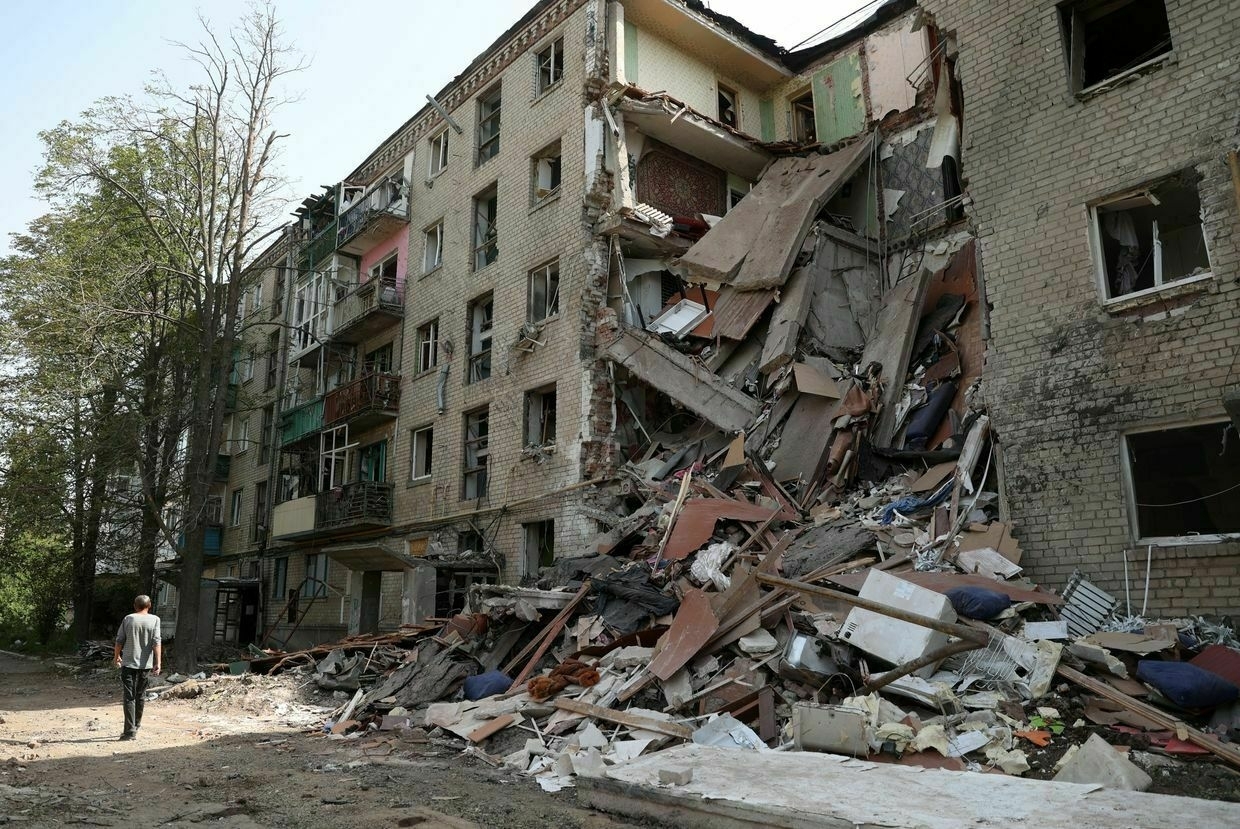
Trump could free all Belarus's political prisoners 'with a single word,' released oppositionist Tsikhanouski says
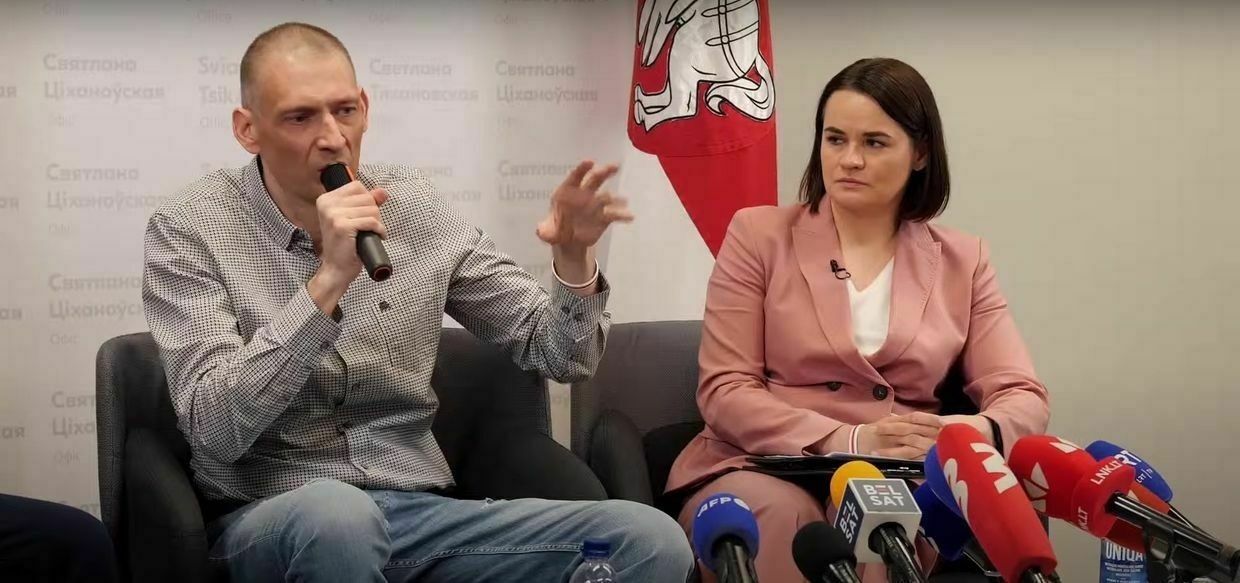
Siarhei Tsikhanouski, a Belarusian oppositionist recently released from prison, thanked the U.S. on June 22 for brokering his release and appealed to President Donald Trump to help free other political prisoners in Belarus.
“President Trump now has the power and opportunity to free all political prisoners in Belarus with a single word. And I ask him to do so, to say that word,” Tsikhanouski said in Vilnius during his first press conference after the release.
Tsikhanouski, a popular blogger who planned to challenge Belarusian dictator Alexander Lukashenko in the 2020 presidential election, was arrested shortly before the vote and later sentenced to 18 years in prison on politically motivated charges.
The opposition leader and at least 13 other detainees were released from Belarusian prisons on June 21 after Lukashenko met U.S. Special Envoy for Ukraine, Keith Kellogg, in Minsk.
Speaking at the press conference alongside his wife and opposition leader, Sviatlana Tsikhanouskaya, Tsikhanouski affirmed that both of them “will continue to support Ukraine and call all of the perpetrators accountable."
Tsikhanouski confirmed that he used to do business both in Ukraine and in Russia but refuted allegations of pro-Russian sympathies, affirming his support for Ukraine and President Volodymyr Zelensky.
“I believe Crimea is Ukrainian. Zelensky has the hardest fate and a heavy load that no other president has. Zelensky is my hero,” Tsikhanouski said.
He also said that Sviatlana Tsikhanouskaya remains the leader of the Belarusian opposition, and he will not challenge that.
Tsikhanouskaya stepped in as the opposition candidate in 2020 after her husband’s arrest, but was forced into exile after Lukashenko declared victory in what was broadly seen as massive election fraud.
“Do you think that anybody who serves in prison automatically becomes a leader? We have 1,200 such leaders,” Tsikhanouski added, referring to the number of political prisoners who remain in prison under Lukashenko’s regime.
“Belarus can’t be free until the Putin regime collapses. If it wasn’t for (Russian President Vladimir) Putin, we would not be sitting here; it would have been over (after the Belarus' popular protests against Lukashenko) in 2020-2021,” Tsikhanouski said.
Lukashenko, in power since 1994, is a close ally of Putin and has allowed Russia to use Belarusian territory for military operations against Ukraine.
The Belarusian dictator has maintained a tight grip over his country by electoral fraud, surveillance, and brutal crackdown on free press, civil society, and political opposition, prompting Western countries to impose sanctions on Belarus.
Russia ‘afraid to admit’ scale of losses, trying to hide by dumping soldiers’ bodies on Ukraine, Zelensky saysUkrainian authorities have confirmed that at least 20 of the bodies Russia returned as Ukrainian were actually Russian soldiers, President Volodymyr Zelensky said.The Kyiv IndependentTim Zadorozhnyy
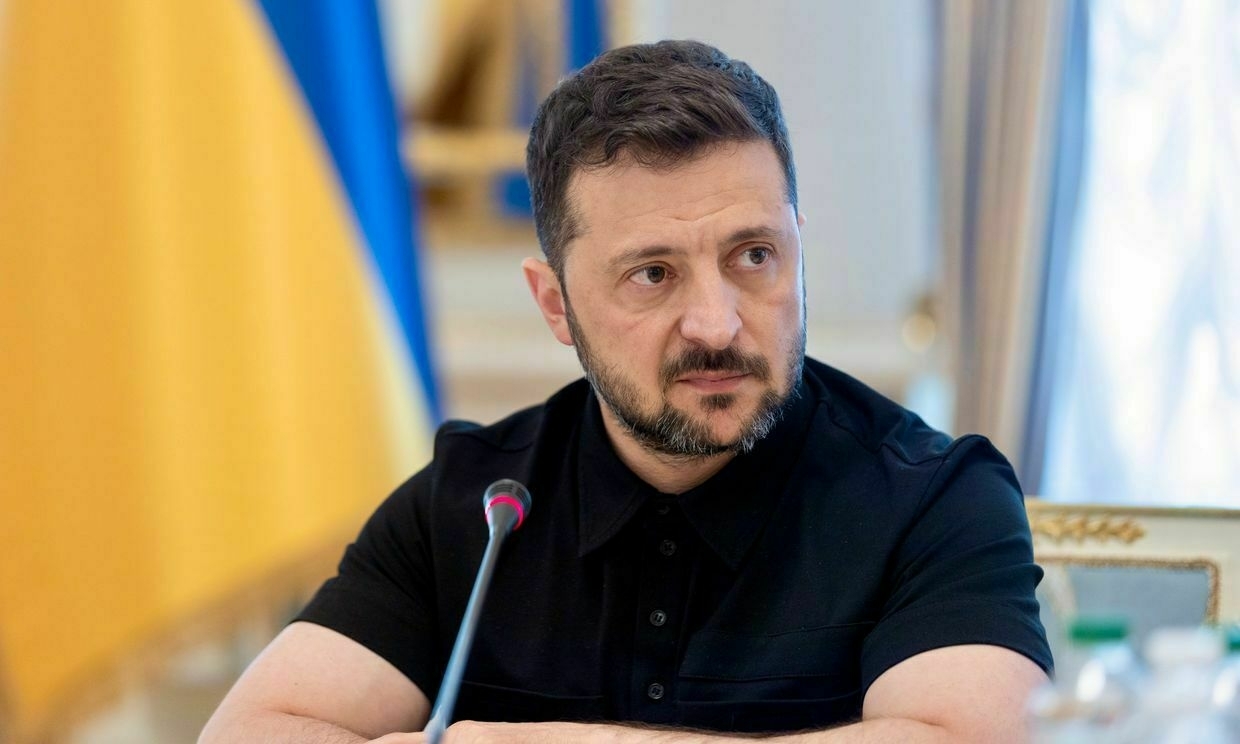
Once firm, support for Ukraine among its neighbors wavers amid a populist surge
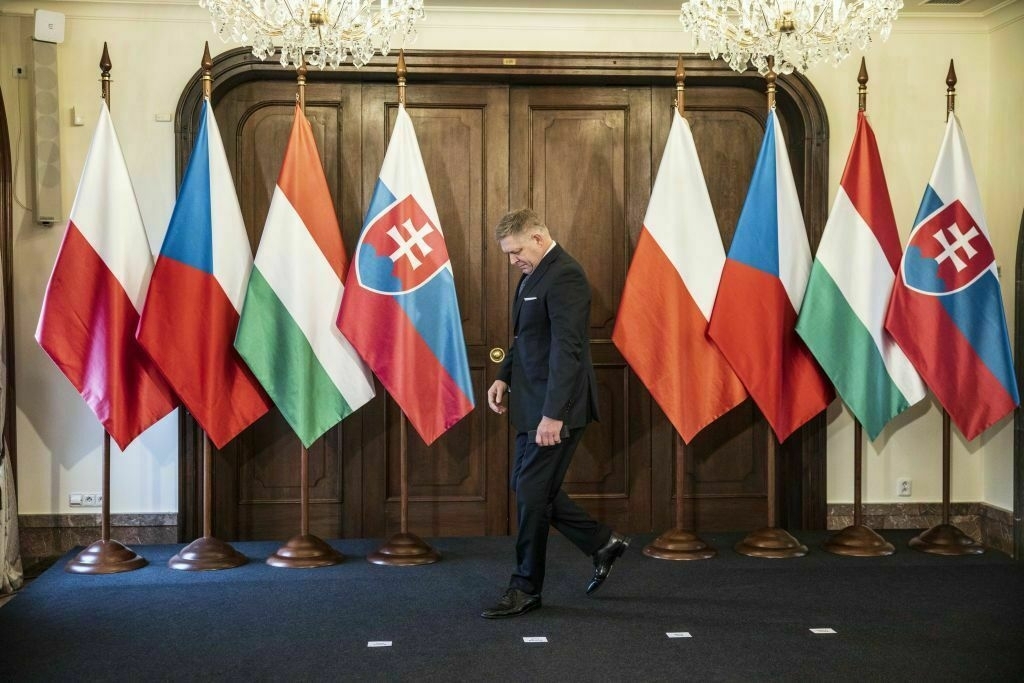
Fourth year into Russia’s full-scale war against Ukraine, the decisive support Kyiv found among its neighbors to the west is beginning to show cracks.
Once resolute Poland is seeing rising skepticism toward Ukraine, underscored by President-elect Karol Nawrocki’s election victory. Slovakia’s pro-Ukrainian government was ousted by Russian-friendly populists in the 2023 parliament elections, and Czechia may face a similar fate this year.
Pro-Western political forces have barely survived a pro-Russian takeover in Romania and Moldova, but the anti-Ukrainian parties remain powerful in both countries.
In contrast, the only actively pro-Russian government that has been in place since the start of the full-scale war, might soon lose an election of its own. Hungarian Prime Minister Viktor Orban, who has exasperated Ukraine and Brussels with his obstinately pro-Kremlin stances, faces a realistic possibility of defeat next year.
Ukraine still has allies in the neighborhood. But when compared to 2022, the trend is clear — A steady erosion of solidarity among Ukraine’s partners in Central and Eastern Europe amid war fatigue, domestic concerns, and rising populism.
Poland — from champion to cautious allyUnlike in many other countries, in Poland, a division between pro-Ukrainian and Ukraine-skeptic political forces cannot be neatly defined by party lines.
Case in point, President-elect Nawrocki is less sympathetic to Ukraine than his predecessor, Andrzej Duda, even though they both come from the same conservative camp centered around the Law and Justice (PiS) party.
The incoming Polish president is also taking a harder line on Ukraine than the centrist government led by Prime Minister Donald Tusk’s Civic Coalition. While the Tusk government has openly backed Kyiv’s NATO and EU aspirations, Nawrocki spoke out against both.
The historian-turned-president-elect has often employed historical grievances — namely, the World War II-era Volyn massacres — in his criticism, while denouncing Ukraine as “ungrateful” for Polish aid.
However, the vast majority of the Polish political spectrum, including the PiS, the current government, and Nawrocki, agrees that it is in Warsaw’s interest to continue supporting Ukraine against Russian aggression.
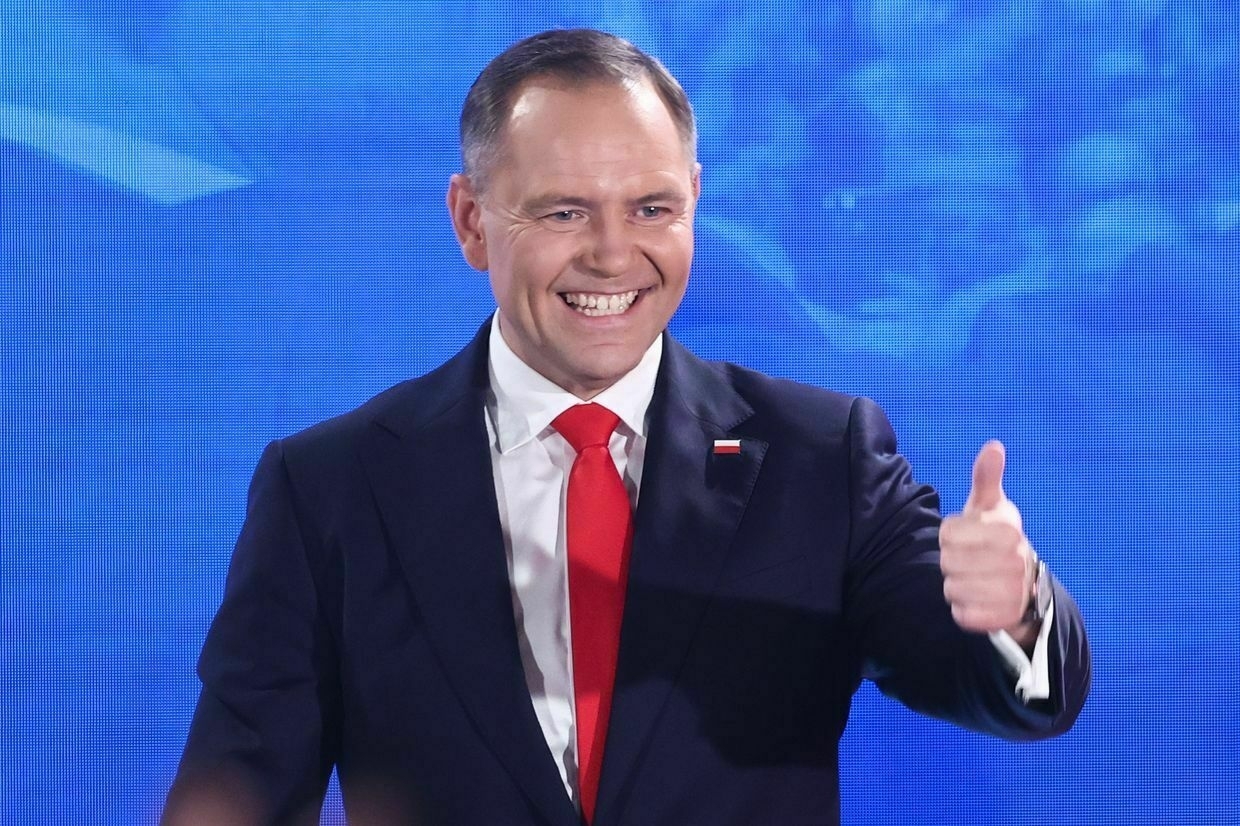
Law and Justice party–backed then-presidential candidate, now President-elect Karol Nawrocki, attends the election night event in Warsaw, Poland, on June 1, 2025. (Jakub Porzycki/NurPhoto via Getty Images) After all, it was the previous PiS government that helped millions of Ukrainian refugees fleeing the country at the start of Russia’s full-scale invasion in 2022, that sent tanks and MiG-29 fighter jets, and that turned eastern Poland into a key military aid hub for Ukraine.
The ties became strained later amid trade disputes, border blockades, and clashes over historical grievances, and did not disappear with the defeat of the PiS and Tusk’s victory in the 2023 elections.
Yet, Poland stands out — its fluctuating relationship with Ukraine doesn’t change the fact that in the country’s war with Russia, it is strongly on Kyiv’s side.
Ukraine is unlikely to lose Poland as its supporter, though Warsaw may not be the leading advocate for Ukrainian European and Euro-Atlantic aspirations it once was.
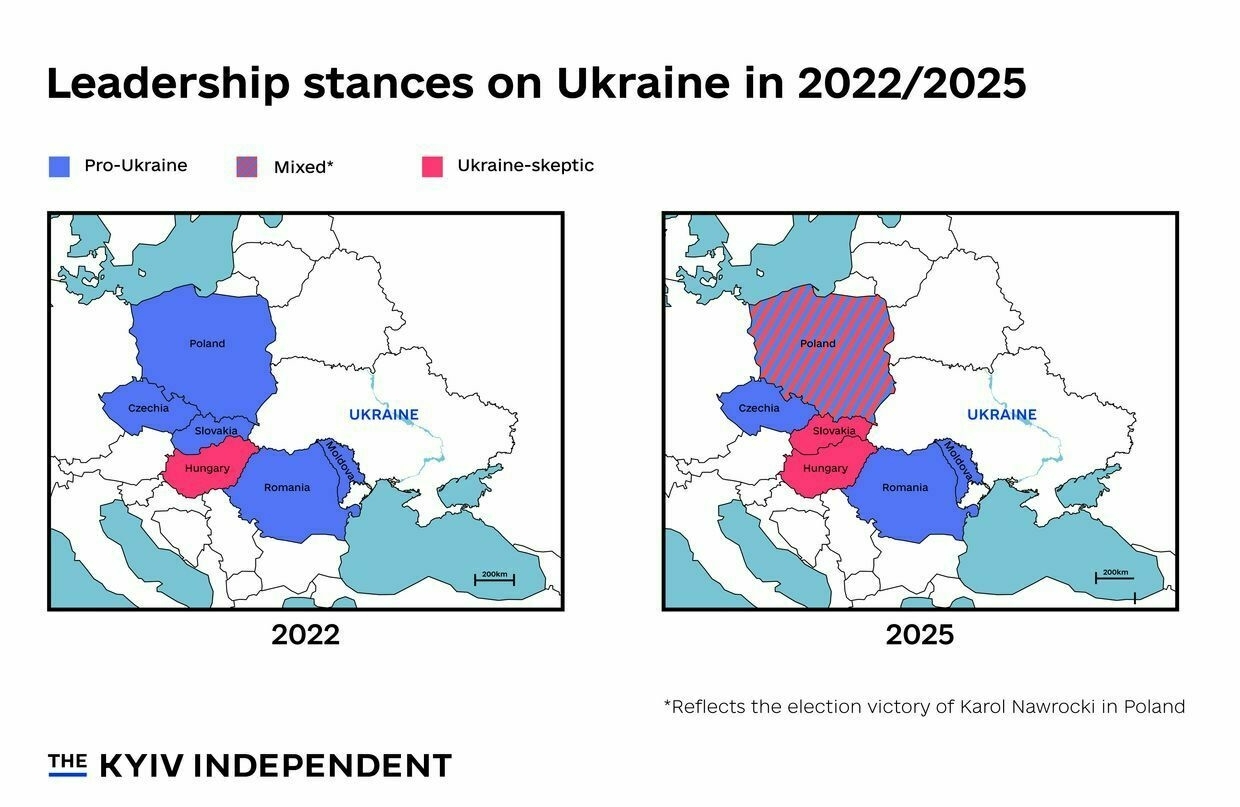
(Nizar al-Rifai/The Kyiv Independent) Can Hungary shift course?As the region is sliding deeper into nationalist populism, Hungary may yet move in the opposite direction.
Peter Magyar, a renegade from Prime Minister Viktor Orban’s Fidesz party, is taking Hungarian politics by storm. His Tisza party now leads polls, suggesting that Magyar has a good chance at dethroning Orban during the upcoming April 2026 parliamentary elections.
Orban has been in power in Hungary since 2010, with his tenure marked by clashes with the EU over human rights and the rule of law, warming relations with Russian and Chinese autocrats, and obstruction of military and political support for Kyiv.
Whether Magyar’s victory next year could bring change remains to be seen. The rising opposition leader visited Kyiv after a Russian attack on the Okhmatdyt hospital last July, but otherwise avoided making any clear commitments to Ukraine. And he has reasons to.
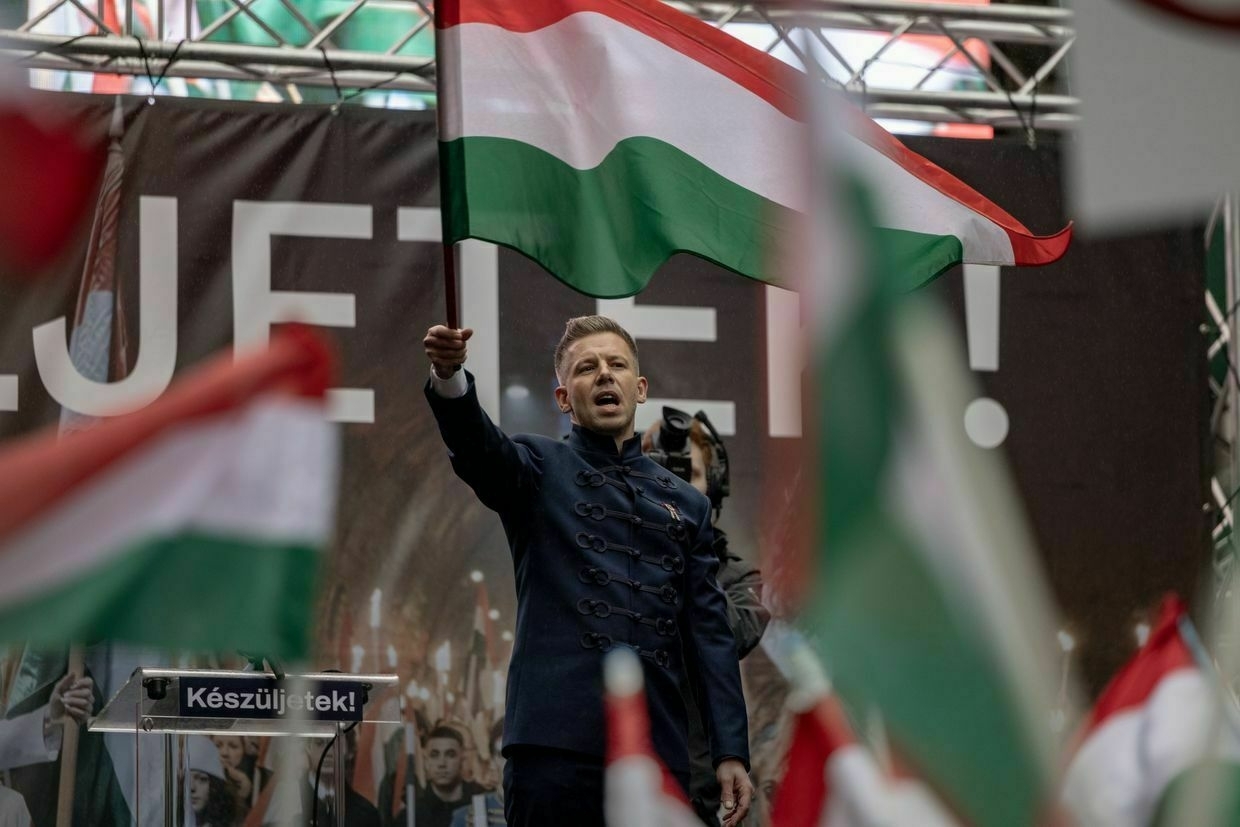
Peter Magyar holds a Hungarian flag during a protest in Budapest, Hungary, on March 15, 2025. (Janos Kummer/Getty Images) “In order to win the elections, (Tisza) needs to win over voters from Fidesz, and, after 15 years of indoctrination, this will not be possible if Tisza takes a broadly pro-Ukrainian stance,” Csilla Fedinec, senior research fellow at HUN-REN Center for Social Sciences in Budapest, told the Kyiv Independent.
“In Hungary, the elections are free but definitely not fair.”
Dorka Takacsy, a research fellow at the Center for Euro-Atlantic Integration and Democracy (CEID) and visiting fellow at the German Marshall Fund, nevertheless says that Magyar might decide to support Ukraine to position himself as Orban's "polar opposite."
Magyar's victory is far from certain, however.
"There are insane disparities with regards not only in access to the media, but also finance-wise" between the "state party" Fidesz and the Tisza newcomers, Takacsy said, adding that "in Hungary, the elections are free but definitely not fair."
Romania remains on Ukraine's side, but pro-Russian challenge growsLooking from Ukraine's perspective, Romania has avoided becoming "another Hungary" by the skin of its teeth, as numerous polls projected that anti-Ukraine and hard-right George Simion could win the presidential office this May.
Simion had strong chances, taking over the "sovereignist" banner from pro-Russian ultranationalist Calin Georgescu, who came in first in the annulled election last November but was barred from running again.
A far-right victory would have been a major upheaval for the key NATO member that was pivotal in helping Ukraine ship out its grain amid Black Sea blockades and provided a full Patriot air defense system.
Bucharest "will have a stable pro-EU, pro-NATO, and pro-Ukrainian force until the next parliamentary elections."
Bucharest Mayor Nicusor Dan, a pro-EU centrist, defied expectations when he defeated Simion by a solid margin. This ensured "that Romania will stay on the pro-Western track," Sergiu Miscoiu, a political science professor at the Babes-Bolyai University in Cluj-Napoca, told the Kyiv Independent.
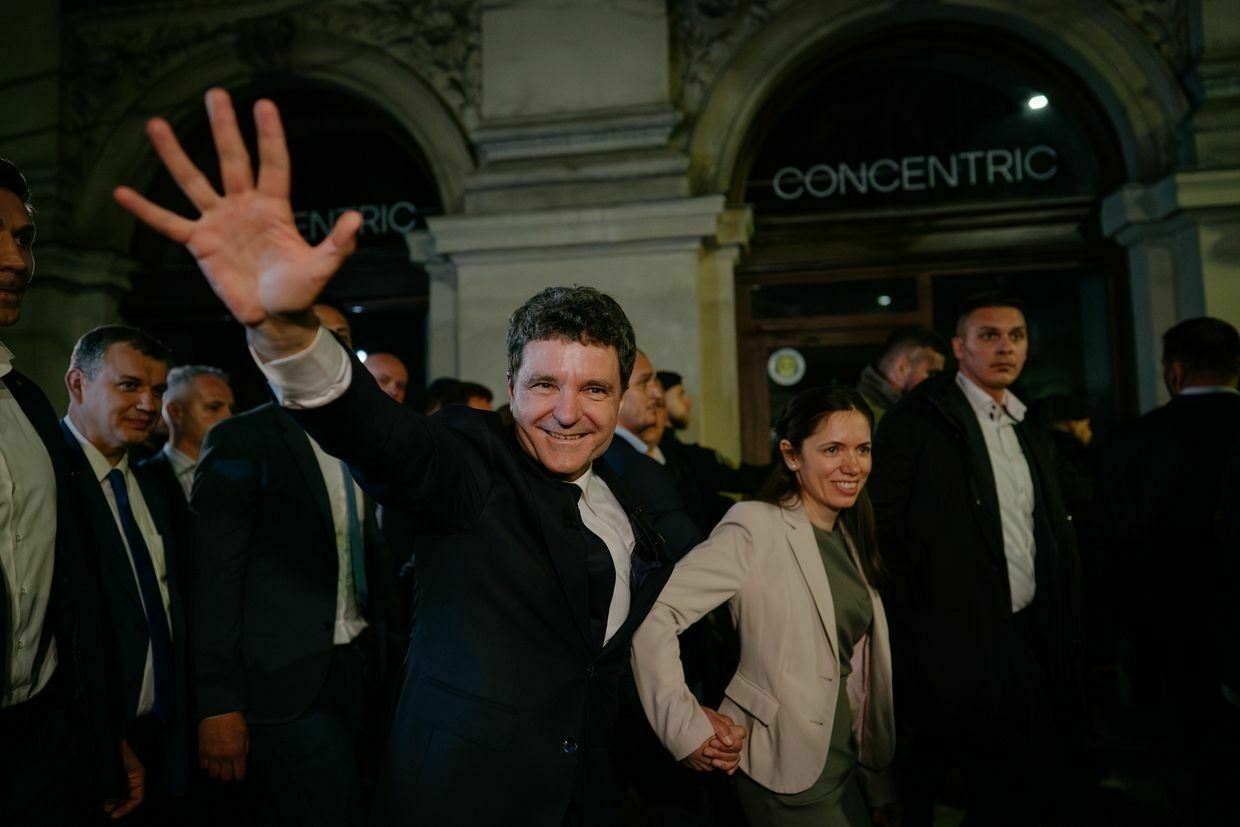
Then-presidential candidate, now Romanian President Nicusor Dan and his partner Mirabela Gradinaru greet supporters after the first exit poll results on the day of the presidential election in Bucharest, Romania, on May 19, 2025. (Andrei Pungovschi/Getty Images) Romania's political woes are far from over, as Dan must now help broker a new government among pro-EU parties. Prime Minister Marcel Ciolacu's pro-Ukrainian cabinet resigned after its candidate failed to advance past the first round of the presidential election.
If these negotiations are successful, "which is highly probable," Bucharest "will have a stable pro-EU, pro-NATO, and pro-Ukrainian force until the next parliamentary elections," Miscoiu added.
The specter of the massive right-wing, anti-establishment surge among Romanians persists, however.
Simion's party, the Alliance for the Union of Romanians (AUR), went from 9% support in 2020 to 18% during last year's parliamentary vote, becoming the leading opposition force and the second-biggest party in the parliament. Its support only continues to surge, now hitting 38% in some surveys.
Such broad backing for a party whose leader has been banned entry to Ukraine due to what the Security Service of Ukraine (SBU) called "systematic anti-Ukrainian activities" and who openly opposed military aid for Ukraine should be a worrying signal for Kyiv.
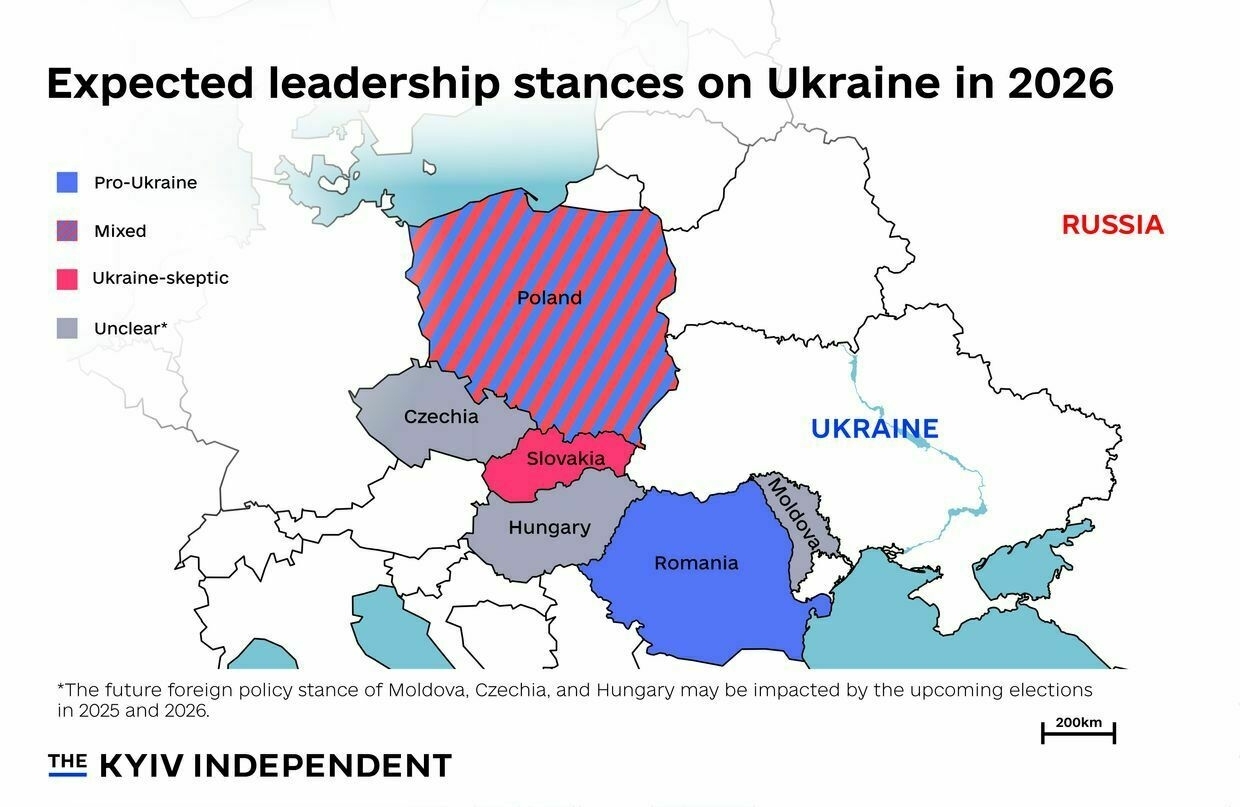
(Nizar al-Rifai/The Kyiv Independent) Moldova's pro-EU path faces second challengeJust like in Romania, Moldova's pro-EU and pro-Ukrainian leadership has evaded defeat by Moscow-friendly opposition — but their fight is not over.
Moldova's small population, modest military, and limited economic capacity restrict its ability to play a major military role in the pro-Kyiv coalition. In spite of this, Chisinau has stood by Ukraine since the onset of Russia's full-scale invasion and has become its partner on the path toward EU accession.
Pro-European President Maia Sandu won reelection in November 2024 by defeating Alexandr Stoianoglo, a former prosecutor endorsed by pro-Russian ex-President Igor Dodon.
However, the simultaneous non-binding referendum on Moldova's EU aspirations showed only a razor-thin margin in support of the accession. Sandu cried foul, accusing Russia of an "unprecedented" interference in its favor.
Now, pro-Russian forces within the country are gearing up for another attempt to grab power, this time during the September parliamentary elections — a vote with potentially major ramifications in the semi-parliamentary republic.
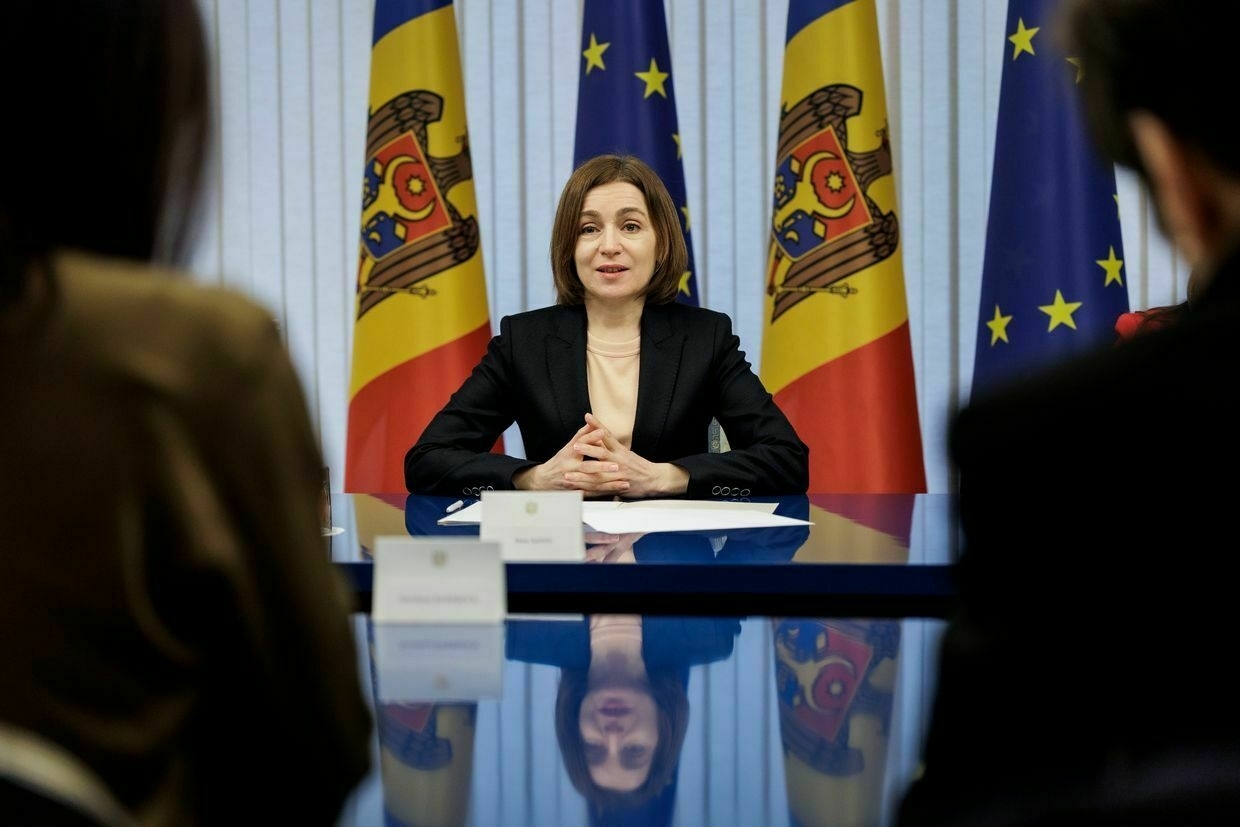
Moldovan President Maia Sandu is pictured in Chisinau, Moldova, on April 2, 2025. (Kira Hofmann/Photothek for the German Federal Foreign Office via Getty Images) Sandu's party, the Party of Action and Solidarity (PAS), currently holds the majority, but faces a challenge from Dodon's Bloc of Communists and Socialists (BCS) and the Alternative, a political bloc co-founded by Stoianoglo.
"If Sandu's party loses majority in the parliament, Maia Sandu will be forced to cohabit with a parliament that is more powerful in terms" of approving the prime minister and the government, Miscoiu said.
In such a situation, Chisinau would not turn openly pro-Russian, the expert says. However, it would shift toward a "neutral" status that would allow the activation of various pro-Russian elements, some of which are currently banned in Moldova, and compromise the country's EU hopes, he added.
Slovakia's U-turn under Fico, and what comes nextFew European countries have seen such a radical foreign policy shift in recent years as Slovakia after the electoral victory of the populist, left-nationalist Robert Fico in the fall of 2023.
The nation that was one of the first to provide Ukraine with fighter jets — not to mention an S-300 air defense system, artillery, and more — now ranks alongside Orban's Hungary as the most Moscow-friendly government in the EU and NATO.
Fico's role as a disruptor has largely been about theatrics, from his meeting with Putin in Moscow last year to his appearance on Russian propagandist Olga Skabeyeva's channel and his presence at the Moscow Victory Day parades on May 9 — an event even Orban avoided.
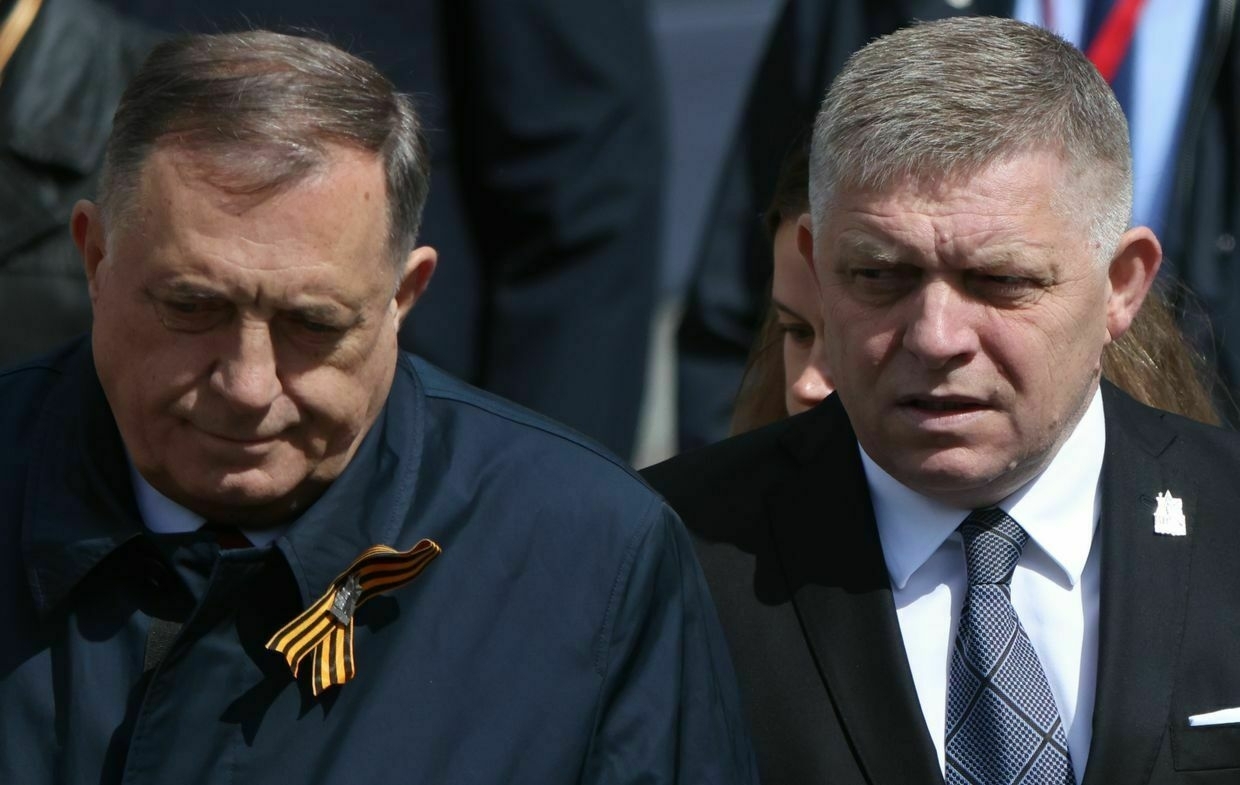
Slovak Prime Minister Robert Fico (R) and President of Republika Srpska Milorad Dodik (L) arrive for a wreath-laying ceremony at the Tomb of the Unknown Soldier in Moscow, Russia, on May 9, 2025. (Contributor/Getty Images) The Slovak leader has also clashed with Ukraine over the transit of Russian gas, halted military aid from (largely emptied out) Slovak military arsenals, and threatened to block the upcoming package of EU sanctions.
However, mass protests against Bratislava's pro-Moscow orientation and the dropping public support for coalition parties show that Fico's hold on power is far from secure.
Fico's foreign policy turn has also sparked criticism within the coalition. Slovak President Peter Pellegrini, Fico's ally and founder of the co-ruling Hlas party, has rebuked the government for moving away from its Western partners and announced his visit to Kyiv.
Should Fico's grip on power continue to weaken, Slovakia's geopolitical course could change yet again.
Czechia slipping away from UkraineWhile not directly sharing borders with Ukraine, Czechia — lying less than 300 kilometers from the warring country — has been a significant player in both military and humanitarian assistance for Kyiv.
Since 2022, Czechia has provided shelter to some 400,000 Ukrainian refugees. Prague was also behind the international ammunition initiative, which provided Ukraine with 1.5 million high-caliber rounds in 2024 and an additional 400,000 as of the spring of 2025.
But the parties that oversaw these policies seem to have a slim chance of retaining the parliamentary majority in the upcoming October elections.
The populist ANO movement of billionaire and ex-Prime Minister Andrej Babis is leading Spolu — the center-right coalition that is the main force in the government — by some 10 percentage points, meaning Babis is very likely to return to power by the end of this year.
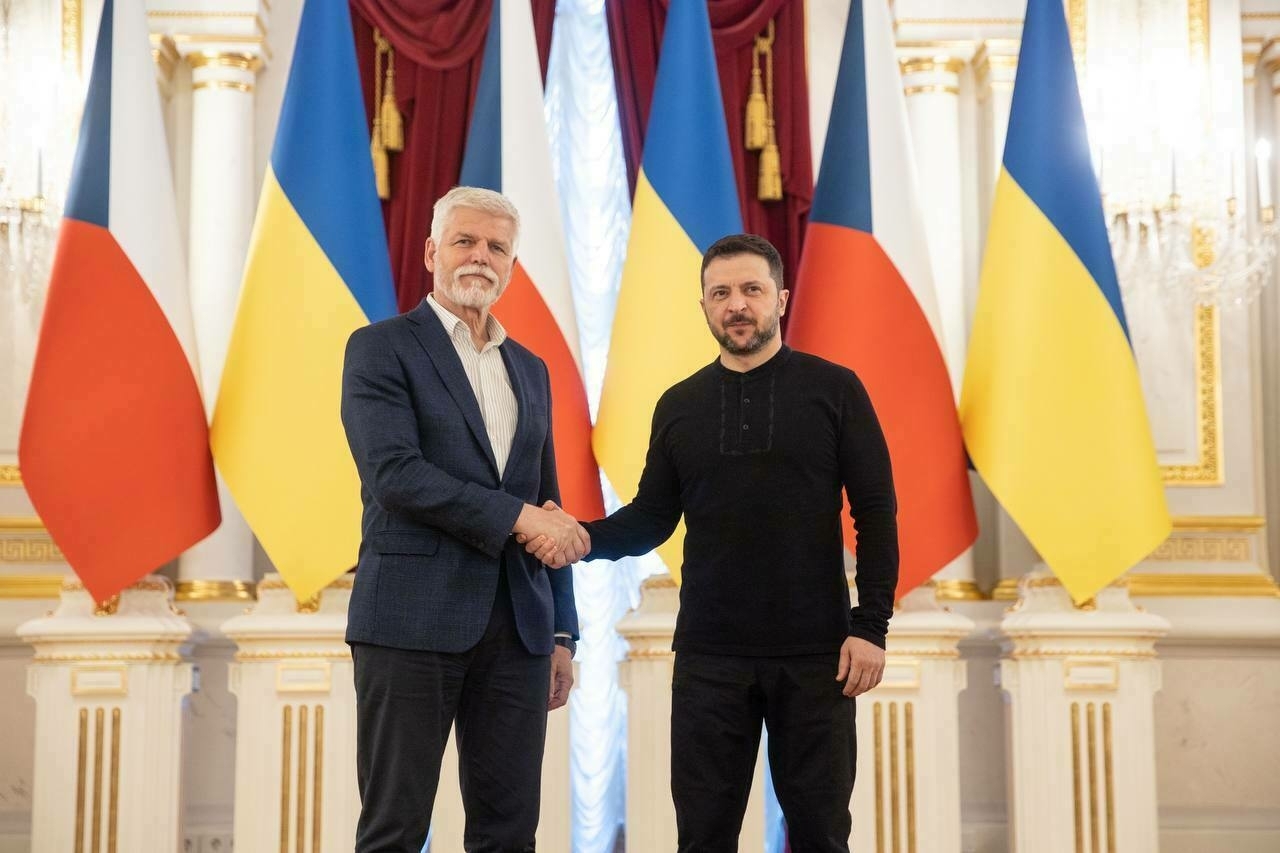
President Volodymyr Zelensky (R) meets with Czech President Petr Pavel (L) in Kyiv, Ukraine, on March 21, 2025. (The President’s Office) In the runup to the vote, Babis has increasingly lambasted the government's support for Ukrainian refugees, arguing that it comes at the expense of Czech families. Babis's right-hand man, Karel Havlicek, even declared earlier this year that ANO would kill the ammunition initiative for Ukraine, though the party later muted this statement.
While ANO has largely tried to avoid the topic of Ukraine as a major topic, this now seems to change as Babis is fishing "in the anti-systemic waters," likely to counter the rise of the more radical and anti-Ukrainian SPD party, Pavel Havlicek (no relation), a research fellow at the Association for International Affairs in Prague, told the Kyiv Independent.
Paradoxically, the far-right SPD and the communist-led Stacilo! (Enough!) bloc appear to be ANO's most likely coalition partners. These radical groups "come with a very clear agenda undermining the course of Czech foreign policy," Havlicek said.
"At the same time, ANO has a weaker and less articulated position on most matters, which might further empower the smaller political actor(s) to take matters into their own hands, including taking over the Czech Foreign Ministry," he adds.
No matter the result of the parliamentary elections, Ukraine will continue to have a vocal advocate in President Petr Pavel – though presidential powers in Czechia are limited.
By mid-2025, support for Ukraine is showing signs of strain in Central and Eastern Europe. Yet, pro-Ukrainian forces have managed to score some surprising wins, showing that victory against the rising wave of pro-Russian populism is possible.
Ukraine war latest: 'Do me a favor Vladimir, mediate Russia first' — Trump roasts Putin over Israel, Iran offer
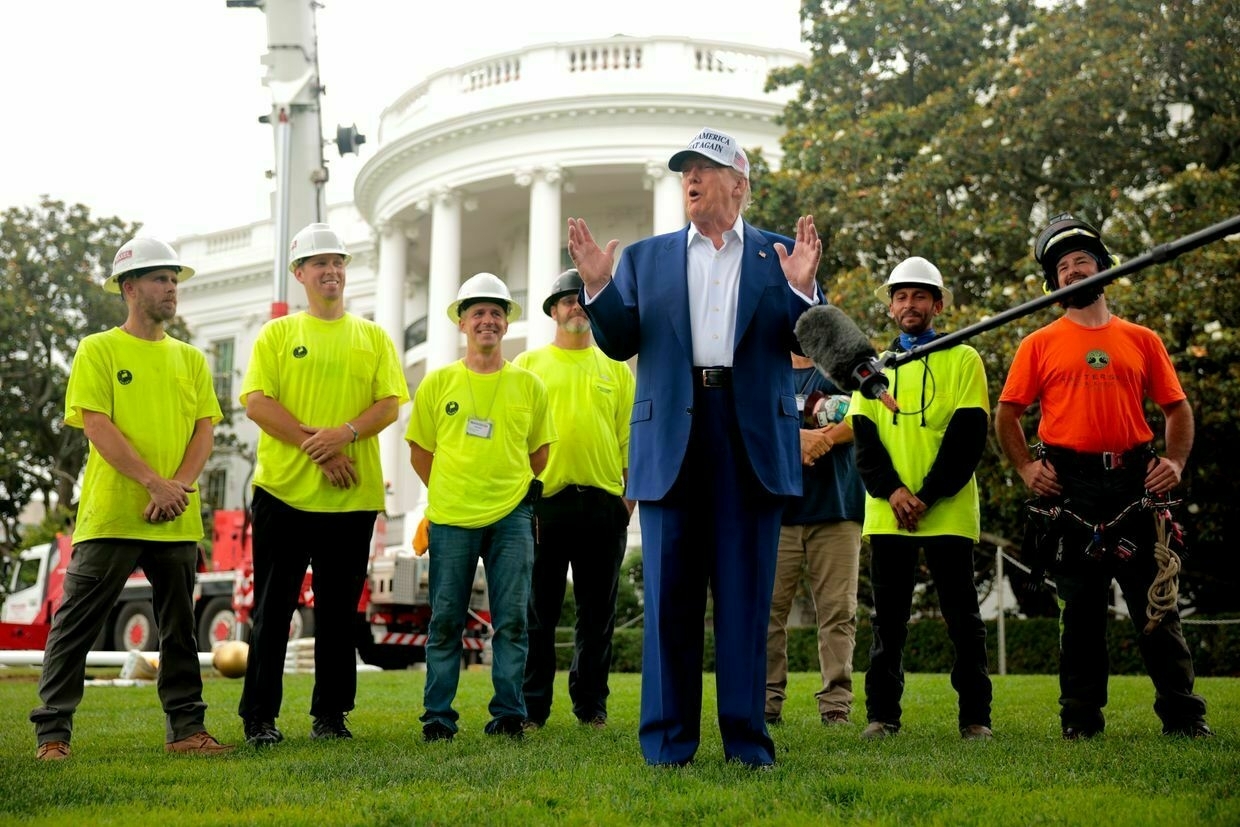
Key developments on June 18:
- ‘Do me a favor Vladimir, mediate Russia first’ — Trump roasts Putin over Israel, Iran offer
- Ukraine kills collaborator tied to POW torture in occupied Berdiansk, intelligence source claims
- Zelensky may reportedly skip NATO summit over uncertainty about Trump’s attendance
- Ukraine dismisses Russia’s ‘absurd’ ceasefire condition for dismantling Western arms
- Kellogg to meet Lukashenko in highest-ranking US visit to Belarus in years, Reuters reports
U.S. President Donald Trump said on June 18 that he had turned down Russian President Vladimir Putin’s offer to mediate the escalating conflict between Israel and Iran.
“I spoke to him yesterday, and, you know, he actually offered to help mediate. I said, do me a favor. Mediate your own,” Trump told reporters. “Let’s mediate Russia first, okay? I said, Vladimir, let’s mediate Russia first. You can worry about this later."
Shortly after Trump’s statement, Kremlin spokesperson Dmitry Peskov said the U.S. president was speaking “figuratively” when referring to a conversation with Putin, according to the Russian state news agency TASS.
“Life is so eventful these days that a retrospective covering several days is like looking back at yesterday,” Peskov added, implying there had been no such conversation on June 17.
Trump’s comments come just days after he had said he was “open” to the idea of Putin serving as a mediator between Israel and Iran, sparking criticism from U.S. allies. On June 15, Trump claimed Putin was “ready” and had discussed the possibility at length in a recent phone call.
Putin, whose country has been deepening military cooperation with Tehran, spoke separately with Israeli Prime Minister Benjamin Netanyahu and Iranian President Masoud Pezeshkian on June 13. He condemned Israel’s air strikes on Iran and offered Russian mediation.
Those strikes, described by Israel as “preemptive,” involved 200 warplanes and 330 munitions targeting Iranian nuclear and military sites. Iran responded with missile attacks on Israeli cities, including Tel Aviv, that killed at least five Ukrainian citizens on June 14.
Trump says Putin offered to mediate in the war between Israel and Iran.
— Brian Lilley (@brianlilley) June 18, 2025
Trump: “Do me a favor. Mediate your own. Let’s mediate Russia first. I said, Vladimir, let’s mediate Russia first. You can worry about this later.”
pic.twitter.com/2JOL6noPX3Putin's offer of mediation has been dismissed by several Western leaders.
French President Emmanuel Macron said Russia "cannot be a mediator," given its war against Ukraine. EU foreign policy chief Kaja Kallas echoed that sentiment, saying on June 17 that Putin "cannot be trusted to mediate peace" while continuing to wage war on Ukrainian civilians.
Kremlin spokesperson Dmitry Peskov said on June 17 that Israel appeared unwilling to accept Moscow's mediation. Israel has not publicly commented on the offer.
Ukraine, which has been targeted by thousands of Iranian-made Shahed drones and missiles supplied to Russia, warned that Tehran is a "source of problems" both regionally and globally.
Despite Trump's latest rebuke of Putin's mediation ambitions, the U.S. president has continued to avoid placing additional sanctions on Moscow, even as the Kremlin refuses to agree to a ceasefire in its war against Ukraine.
For the first time, Australia sanctions Russian shadow fleet oil tankers“Russia uses these vessels to circumvent international sanctions and sustain its illegal and immoral war against Ukraine,” Australia’s Foreign Ministry said in a statement.The Kyiv IndependentAnna Fratsyvir
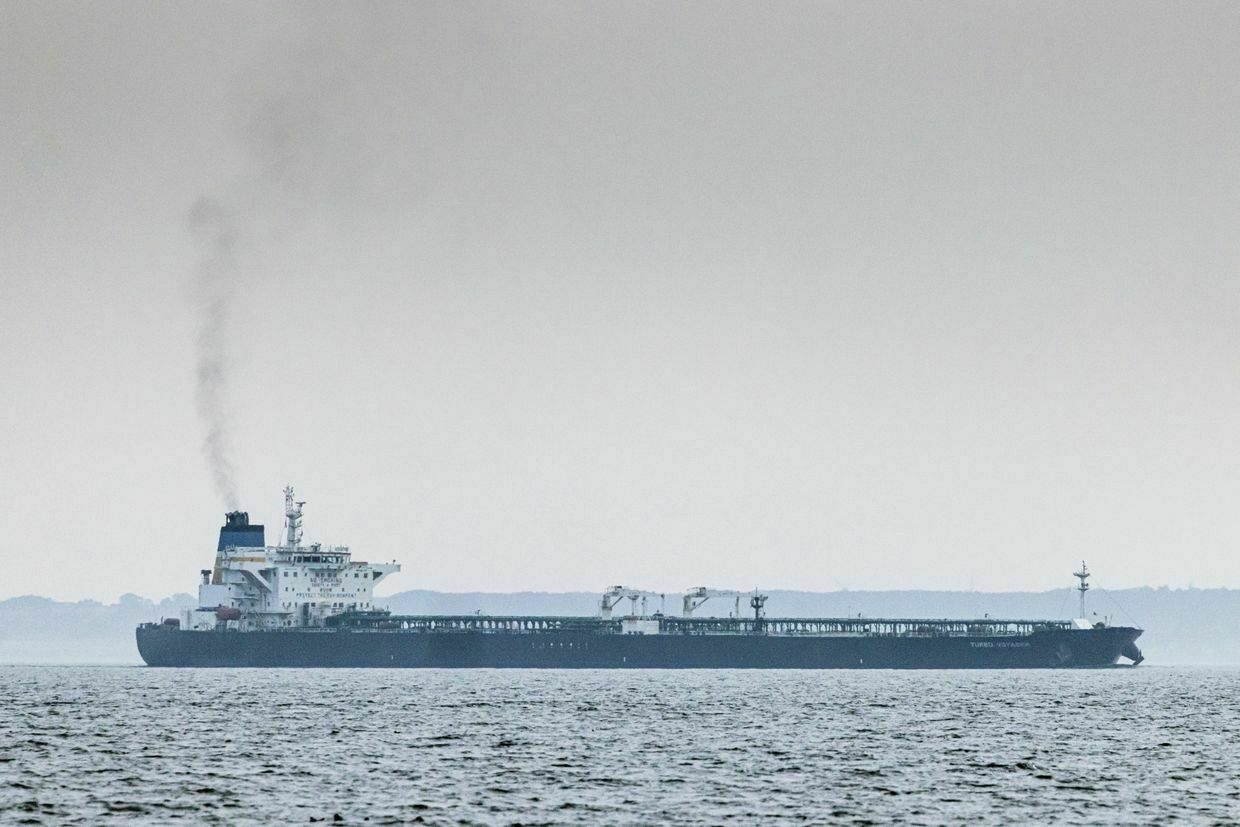
Ukraine kills collaborator tied to POW torture in occupied Berdiansk, intelligence source claimsDuring a targeted operation, Ukraine's military intelligence (HUR) killed Mykhailo Hrytsai, a senior collaborator with Russian occupation authorities in Berdiansk, Zaporizhzhia Oblast, a HUR source told the Kyiv Independent on June 18.
According to the source, Hrytsai was directly involved in organizing repressions against the local Ukrainian population and establishing torture chambers for prisoners of war.
The collaborator was shot dead in the city using a silenced PM pistol, the source said.
Hrytsai served as the Russian-installed deputy mayor responsible for infrastructure, housing, utilities, and the energy sector. The source also said he facilitated the illegal seizure of municipal and state property in Berdiansk.
"There are still plenty of such targets — collaborators, accomplices of the enemy — in the occupied territories of Ukraine," the source said.
"We will definitely get to each and every one of them and put an end to their criminal activities by any means necessary: with or without a silencer, quietly or loudly, but always effectively."
A native of Poltava Oblast, Hrytsai had previously participated in Ukrainian political life. He was an assistant to a member of parliament and headed the Berdiansk branch of the Socialist Ukraine party before siding with Russian occupation forces.
Berdiansk, a port city on the Azov Sea, has been under Russian control since the early days of the full-scale invasion in 2022. It remains a critical logistics hub for Russian forces, facilitating the transport of looted Ukrainian grain and other resources.
On Feb. 20, another targeted strike in Berdiansk killed Yevgeny Bogdanov, the deputy head of the Russian-installed administration, according to Ukrainian military intelligence.
‘Beyond cynical’ – Russian doctor carved ‘Glory to Russia’ scar on POW during operation, Ukraine saysAfter more than three years of Russia’s full-scale invasion, each new revelation of cruel treatment of Ukrainians in Russian captivity hardly surprises anyone. But when a photo recently emerged online, showing a “Glory to Russia” scar on the body of a Ukrainian prisoner of war (POW), it sent shockwavesThe Kyiv IndependentDaria Shulzhenko

Zelensky may reportedly skip NATO summit over uncertainty about Trump's attendancePresident Volodymyr Zelensky may reconsider attending the NATO summit in The Hague, as questions remain over U.S. President Donald Trump's participation, the Guardian reported on June 17, citing unnamed Ukrainian officials.
According to the Guardian, some in Kyiv are unsure if Zelensky's presence at the June 24-25 summit would be worthwhile without a confirmed meeting with Trump, whom they had hoped to engage directly in efforts to pressure Russian President Vladimir Putin into accepting a ceasefire.
Earlier, Zelensky had traveled to the G7 summit in Canada, hoping to meet one-on-one with Trump and push for stronger sanctions against Russia. Trump left the summit early, citing the crisis in the Middle East, and no bilateral meeting or joint G7 statement took place.
One official told the Guardian that Ukraine is in a "permanent hazard" of becoming a victim of "Trump's short attention span," adding that Russia has exploited this uncertainty by fresh aerial attacks. The source added that there had been "all sorts of promises for this summit," including U.S. arms.
The Russian attack on Ukraine that occurred during the G7 summit killed at least 24 civilians and injured 134 in Kyiv. Trump has not responded to the attack as of the day after.
German Chancellor Friedrich Merz has reportedly said Trump had previously promised to attend the NATO gathering, though no official confirmation has been issued from Washington.
Despite the setback, Zelensky said the G7 meeting had concrete results for Ukraine. In a Telegram post on June 17, he thanked partners for increased military aid, new sanctions on Russia, and the decision to allocate frozen Russian assets for Ukraine’s reconstruction.
"It is important that our partners are ready not only to support our defense now, but also to rebuild Ukraine together after the war ends," he said.
Canadian Prime Minister Mark Carney announced a support package that includes 2 billion Canadian dollars ($1.5 billion) in military assistance and another $1.6 billion in reconstruction loans. The aid includes drones, armored vehicles, ammunition, and sanctions to disrupt Russia's energy revenues.
U.K. Prime Minister Keir Starmer also unveiled new sanctions targeting Russia's military-industrial complex and 20 oil tankers from Russia's "shadow fleet."
Zelensky later told G7 leaders that "diplomacy is now in a state of crisis" and called on allies to press Trump to "use his real influence" to help end the war.
Ukraine has been invited to the NATO summit, and Zelensky previously called the invitation "important" during a June 2 press briefing. At the time, he did not confirm whether he would attend in person.
Ukraine won’t receive NATO invitation at The Hague summit, Lithuanian FM says“This issue is certainly not on the NATO agenda and nobody has formulated an expectation that there will be an invitation in The Hague, nor have we heard that from the Ukrainians themselves,” Lithuanian Foreign Minister Kestutis Budrys said in comments quoted by the LRT broadcaster.The Kyiv IndependentMartin Fornusek
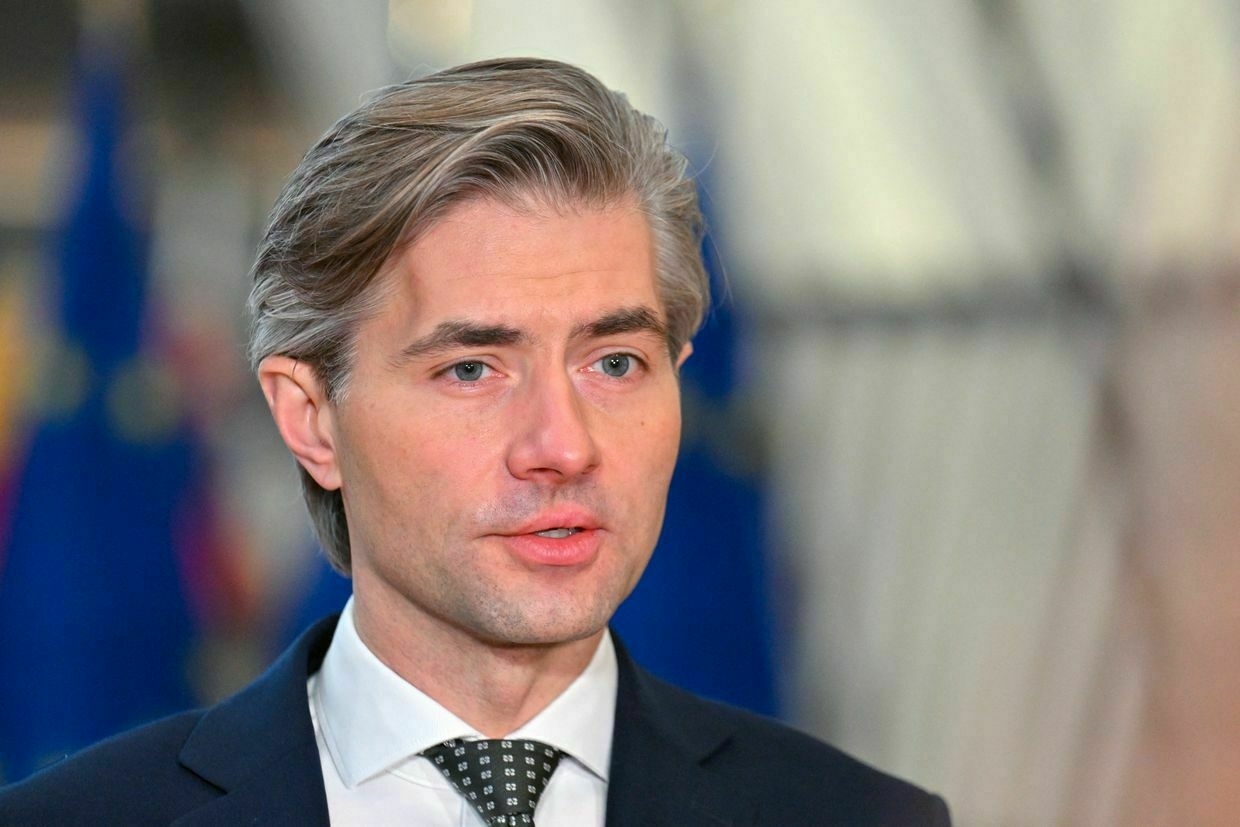
Ukraine dismisses Russia's 'absurd' ceasefire condition for dismantling Western armsUkraine's Foreign Ministry on June 18 brushed off Moscow's demands for Kyiv to destroy or dismantle Western-supplied weapons as a condition for a ceasefire, saying it shows disregard for U.S. peace efforts.
"Russian officials make new absurd demands almost every day. Total inadequacy," Ukrainian Foreign Ministry spokesperson Heorhii Tykhyi said on X.
"Moscow shows complete disregard for the United States' efforts to end the war."
Russian Deputy Foreign Minister Alexander Grushko raised the demand in an interview with the state-run newspaper Izvestia earlier this week.
"All these surpluses must be destroyed. All international algorithms are known. They must be reduced, disposed of, and guaranteed," Grushko said.
The Kremlin has previously demanded a complete halt on Western military aid to Ukraine as a key condition for a truce. Kyiv and its European partners have rejected this, instead urging increased military assistance to the war-torn country.
The demand reflects Moscow's growing list of maximalist conditions presented in its so-called "peace memorandum" during negotiations with Ukraine in Istanbul on June 2.
While the recent peace talks ended with an agreement on major prisoner exchanges and repatriation of fallen soldiers, they have failed to achieve a breakthrough in the peace talks.
U.S. President Donald Trump, who initially pledged to broker peace in Ukraine within 24 hours of taking office, has become increasingly disengaged in the effort. He has also been reluctant to apply pressure on Moscow to push it to a ceasefire deal despite repeatedly threatening additional sanctions.
‘He said he wasn’t going anywhere’ — Survivors search for missing following Russia’s deadliest attack on Kyiv this yearSitting a few meters from the rubble of what used to be a nondescript nine-story residential building in Kyiv, Lilia rises to her feet every time another pile of debris is cleared from the site targeted by Russia during a mass overnight attack on June 17. “We are waiting (asThe Kyiv IndependentKateryna Denisova
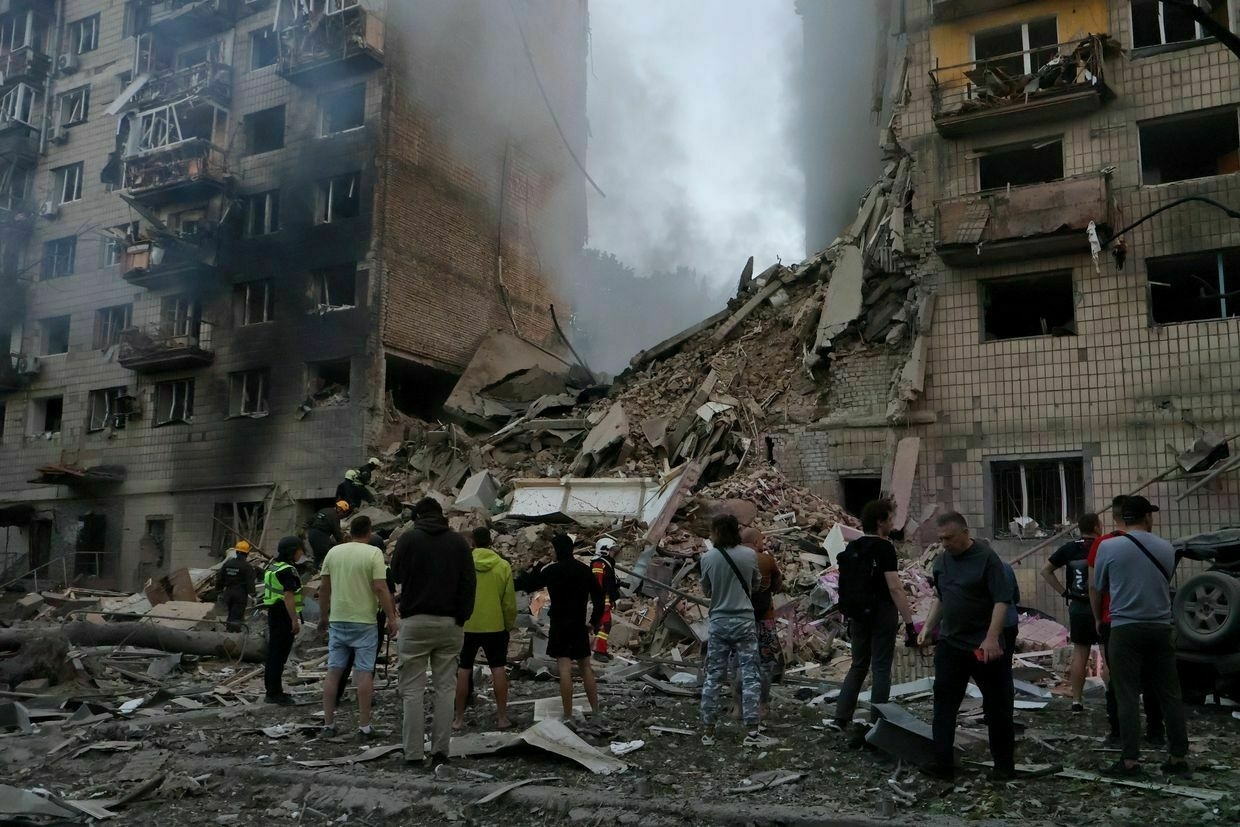
Kellogg to meet Lukashenko in highest-ranking US visit to Belarus in years, Reuters reportsU.S. Special Envoy for Ukraine Keith Kellogg will meet Belarusian President Alexander Lukashenko in the coming days, Reuters reported on June 17, citing four sources familiar with the matter.
Kellogg will meet Lukashenko in a visit to Belarus as peace talks to bring an end to Russia's war against Ukraine remain inconclusive, Reuters reported.
In February, U.S. Deputy Assistant State Secretary Christopher W. Smith visited Belarus alongside two other U.S. officials to conduct a prisoner swap in a similar unannounced visit.
Lukashenko has been in power since 1994 and has been accused of staging fraudulent elections in Belarus. The leader declared a seventh consecutive presidential election victory in January.
Kellogg has given the impression that the meeting could help reinitiate largely unsuccessful peace talks between Ukraine and Russia, two sources told Reuters.
Lukashenko is seen as a key ally of Russian President Vladimir Putin as Russia faces isolation in response to its full-scale war against Ukraine.
The White House has discussed ways to weaken Russia's influence on Minsk and bring Belarus closer to the United States, one of the sources said.
On Feb. 12, Smith drove to Belarus from Lithuania following a phone call with Lukashenko. The small U.S. delegation visited a border town where three political prisoners were transferred, including one U.S. citizen and two Belarusian citizens, the New York Times reported.
Lukashenko assured he was ready to decrease repression in Belarus, Smith said, adding that the U.S. wants Belarus to be less reliant on Russia.
Belarus has faced Western sanctions following a presidential election in 2020 that international observers condemned as fraudulent. The sham election garnered mass protests that rejected the results.
Minsk refused to invite a mission from the Organization for Security and Cooperation in Europe (OSCE) to observe the country's Jan. 26 presidential election.
Belarus further isolated itself from the West as it supports Russia in its ongoing war against Ukraine.
Note from the author:
Ukraine War Latest is put together by the Kyiv Independent news desk team, who keep you informed 24 hours a day, seven days a week. If you value our work and want to ensure we have the resources to continue, join the Kyiv Independent community.
Kellogg to meet Lukashenko in highest-ranking US visit to Belarus in years, Reuters reports
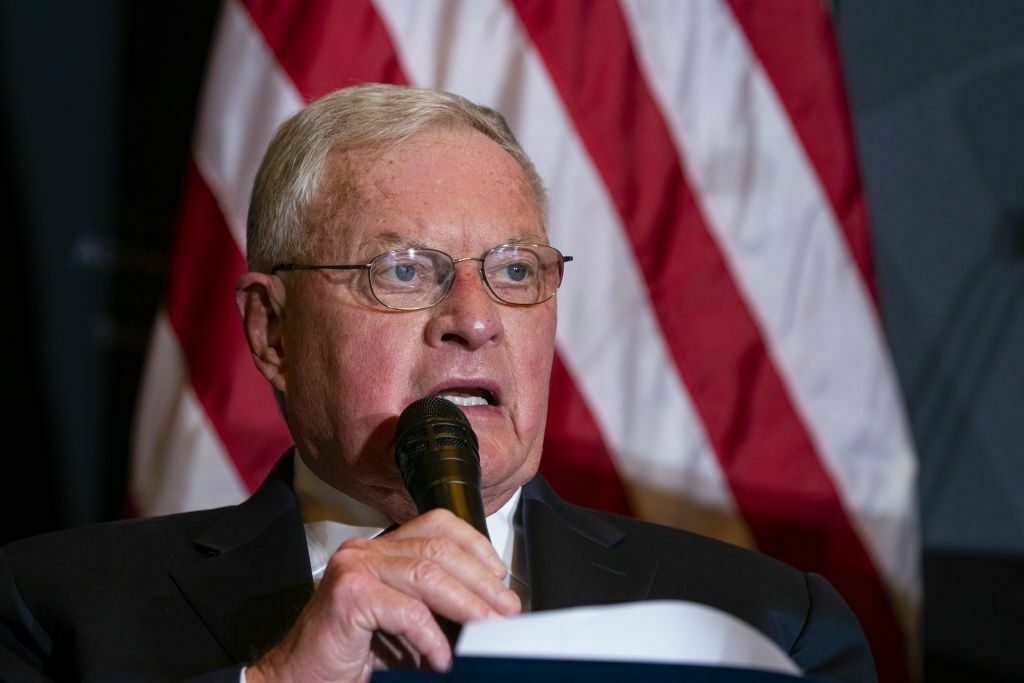
U.S. Special Envoy for Ukraine Keith Kellogg will meet Belarusian President Alexander Lukashenko in the coming days, Reuters reported on June 17, citing four sources familiar with the matter.
Kellogg will meet Lukashenko in a visit to Belarus as peace talks to bring an end to Russia’s war against Ukraine remain inconclusive, Reuters reported.
In February, U.S. Deputy Assistant State Secretary Christopher W. Smith visited Belarus alongside two other U.S. officials to conduct a prisoner swap in a similar unannounced visit.
Lukashenko has been in power since 1994 and has been accused of staging fraudulent elections in Belarus. The leader declared a seventh consecutive presidential election victory in January.
Kellogg has given the impression that the meeting could help reinitiate largely unsuccessful peace talks between Ukraine and Russia, two sources told Reuters.
Lukashenko is seen as a key ally of Russian President Vladimir Putin as Russia faces isolation in response to its full-scale war against Ukraine.
The White House has discussed ways to weaken Russia’s influence on Minsk and bring Belarus closer to the United States, one of the sources said.
On Feb. 12, Smith drove to Belarus from Lithuania following a phone call with Lukashenko. The small U.S. delegation visited a border town where three political prisoners were transferred, including one U.S. citizen and two Belarusian citizens, the New York Times reported.
Lukashenko assured he was ready to decrease repression in Belarus, Smith said, adding that the U.S. wants Belarus to be less reliant on Russia.
Belarus has faced Western sanctions following a presidential election in 2020 that international observers condemned as fraudulent. The sham election garnered mass protests that rejected the results.
Minsk refused to invite a mission from the Organization for Security and Cooperation in Europe (OSCE) to observe the country’s Jan. 26 presidential election.
Belarus further isolated itself from the West as it supports Russia in its ongoing war against Ukraine.
‘He said he wasn’t going anywhere’ — Survivors search for missing following Russia’s deadliest attack on Kyiv this yearSitting a few meters from the rubble of what used to be a nondescript nine-story residential building in Kyiv, Lilia rises to her feet every time another pile of debris is cleared from the site targeted by Russia during a mass overnight attack on June 17. “We are waiting (asThe Kyiv IndependentKateryna Denisova
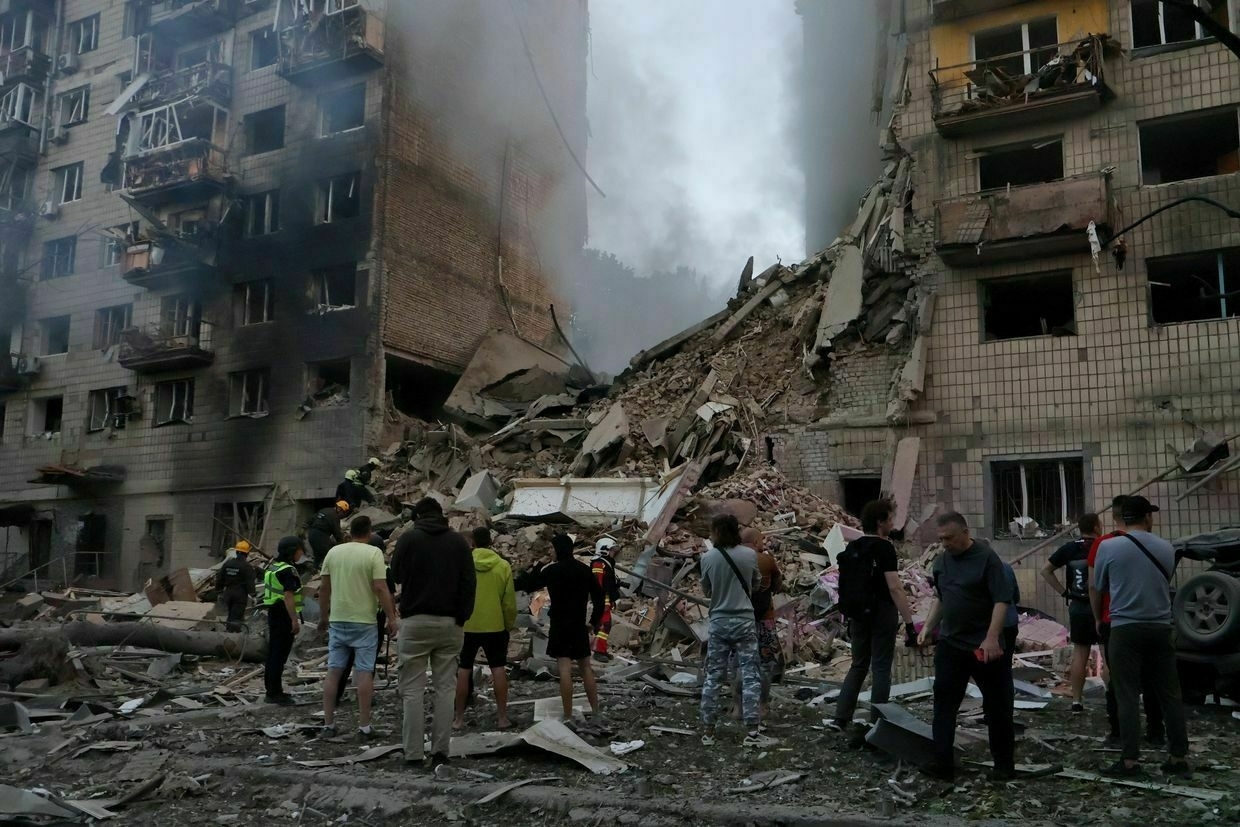
Kyiv Pride march takes place, gathers international representatives, faces counterprotesters
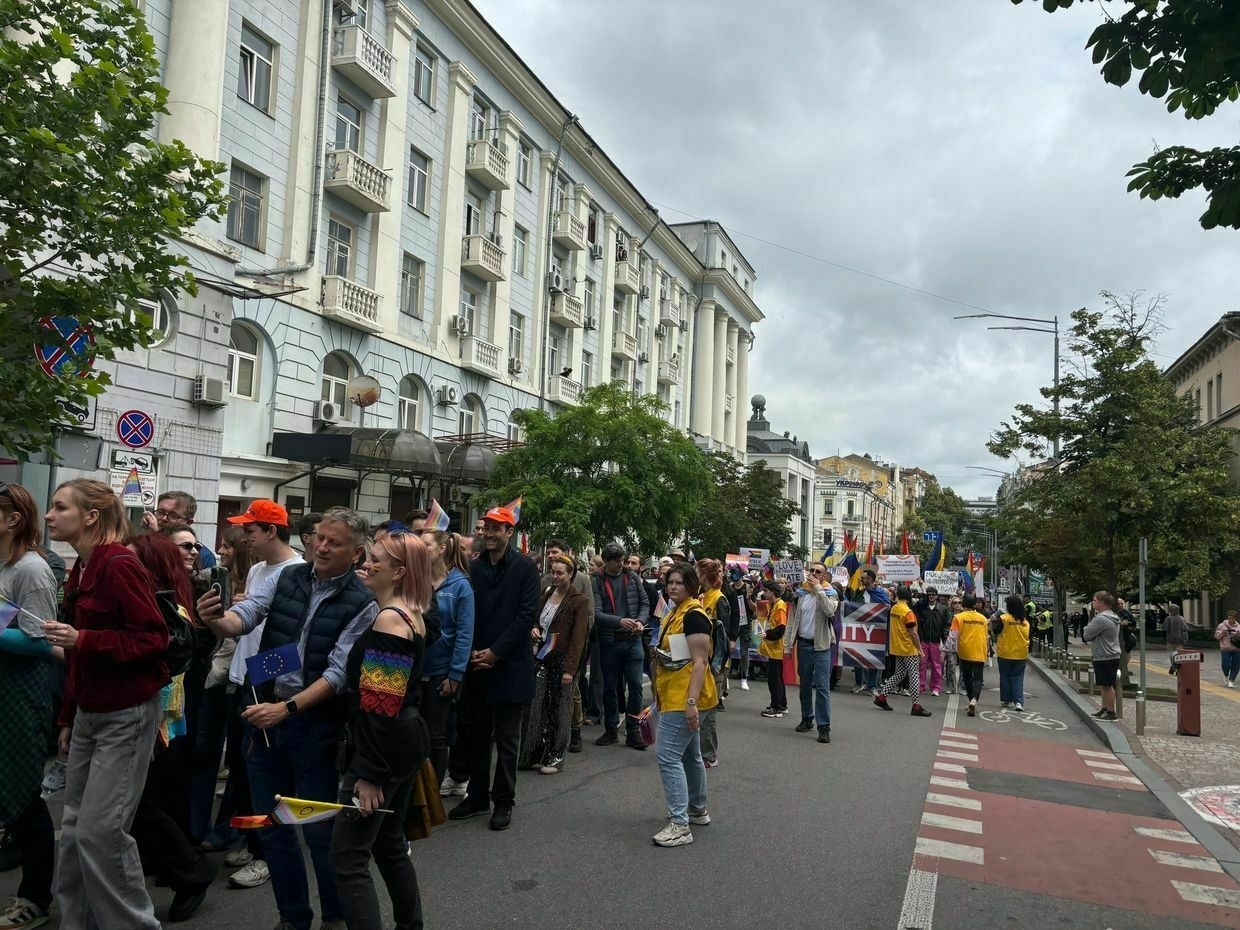
Kyiv Pride held a parade with over 1,500 participants in the Ukrainian capital on June 14, which was met with counterprotests.
“Other Ukrainian Prides also participated — including Kharkiv Pride and Ukraine Pride. Kyiv’s student community was represented, among others, by the Student Parliament of Taras Shevchenko National University of Kyiv and Ukraine Global Scholars,” Kyiv Pride said in a post to Facebook.
On June 7, a drone charity event for Kyiv Pride took place outside the Foreign Ministry building and was met with a nearby counterprotest.
The march was joined by representatives from the EU, Canada, the U.K., and various other countries, including France, Germany, and Spain.
The march was joined by the LGBT+ Military non-governmental organization (NGO) as Russia’s war against Ukraine continues.
“Among the marchers was veteran Viktor Pylypenko, head of the NGO LGBT+ Military for Equal Rights. He drew public attention to the growing loss of military personnel and veterans who are dying at war — while their families remain unrecognized by law,” Kyiv Pride said in its statement.
The march raised 20,000 hryvnia for the Serhiy Sternenko Foundation to purchase drones for the military.
Representatives, including Canada’s ambassador to Ukraine, Natalka Cmoc, joined the event.
“Ambassadors, the Canadian embassy team, along with many diplomats, joined (the) Kyiv Pride march this morning,” Cmoc said.
The Kyiv Pride event was met with a nearby counterprotest.
“With regret, we must note that those who incite violence still have broader access to public space and freely walk through the central streets, while participants of Kyiv Pride March are surrounded by police and restricted in their route. We continue to witness the spread of hate speech,” Kyiv Pride said.
Kyiv Pride held a march in June 2024 for the first time since Russia began its full-scale war against Ukraine in February 2022.
‘Europe hasn’t decided what to do if US steps back’ — key takeaways from Zelensky’s closed-door briefing“Both teams are working to ensure we meet,” President Volodymyr Zelensky said.The Kyiv IndependentAnna Fratsyvir

As Russian losses in Ukraine hit 1 million, Putin faces an economic time bomb
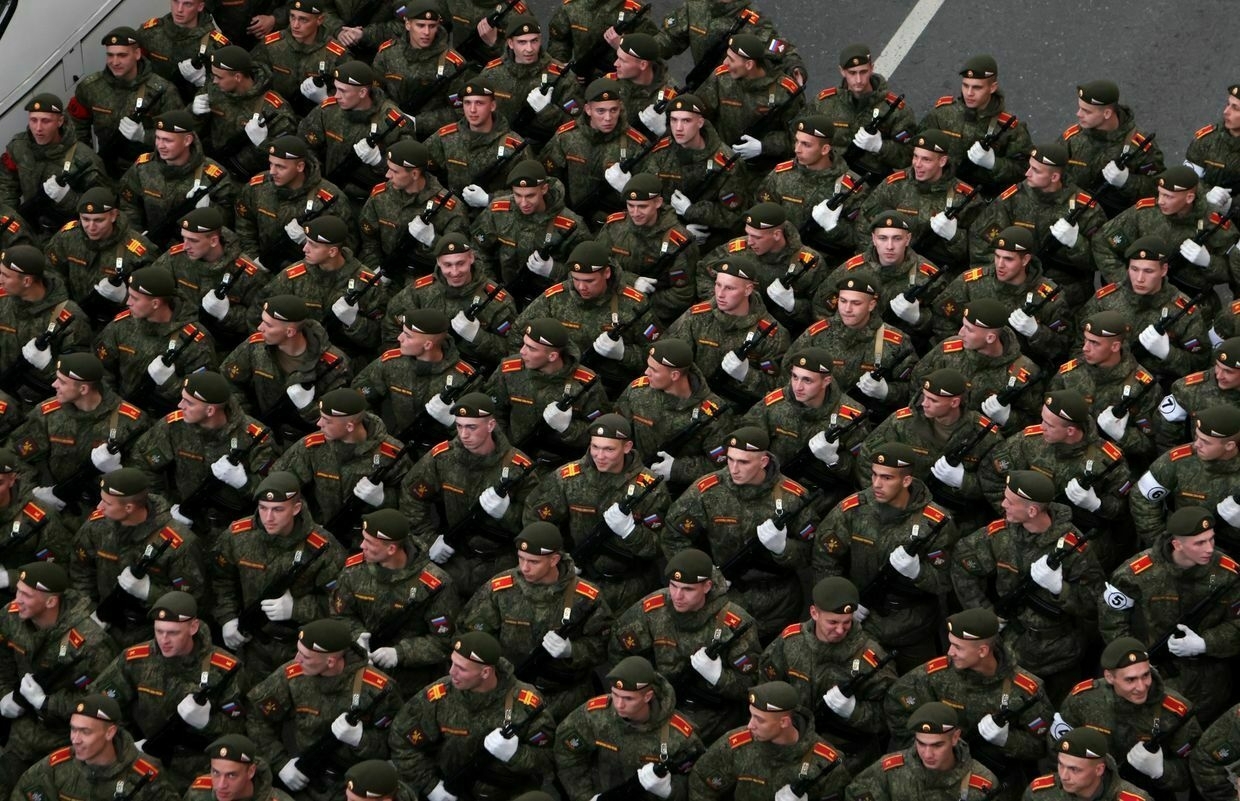
Russian losses in Ukraine hit a massive, and grim milestone on June 12 — 1 million Russian soldiers killed or wounded during the 39-month-long full-scale war, according to figures from Kyiv.
Although hugely symbolic, the number is unlikely to prompt a change in tactics from Moscow as it gears up for more offensives this summer, and escalates drone and missile attacks on Ukrainian civilians.
But behind the figure lies an economic time bomb that the Kremlin will find impossible to ignore.
"(Russian President) Vladimir Putin made a fundamental strategic mistake in deciding how to resource this war," George Barros, Russia team lead at the Institute for the Study of War (ISW), told the Kyiv Independent.
“What Vladimir Putin has done is he has created a system in which he doesn’t use the monopoly of violence of the Russian state to coerce Russians to go fight and die in Ukraine, as the Soviet Union might have. What Putin has done is he’s created an alternative social contract where he pays you to go fight in Ukraine.
“That strategy can work if you’re planning on running a short war. It does not work if you are running a multi-year protracted war."
Russia’s two armiesRussia effectively has two armies — a conscript army, and a contract army.
Russia’s conscript army is the country’s standing armed forces that are required to defend Russia itself.
To maintain this force, the Kremlin conducts conscription twice a year, in spring and fall, requiring eligible men to serve for one year.
In the latest draft, Putin signed a decree on March 31 ordering the spring conscription of 160,000 men.
But crucially, conscripts by law are not allowed to be sent abroad to fight wars in foreign countries, something which is not only a legal contract, but a social contract that is deeply embedded in Russian society — civil society groups consisting of the mothers of conscripts are perhaps the only group of Russian citizens that Putin is still forced to respect and listen to.
This is where Russia’s contract army comes in.
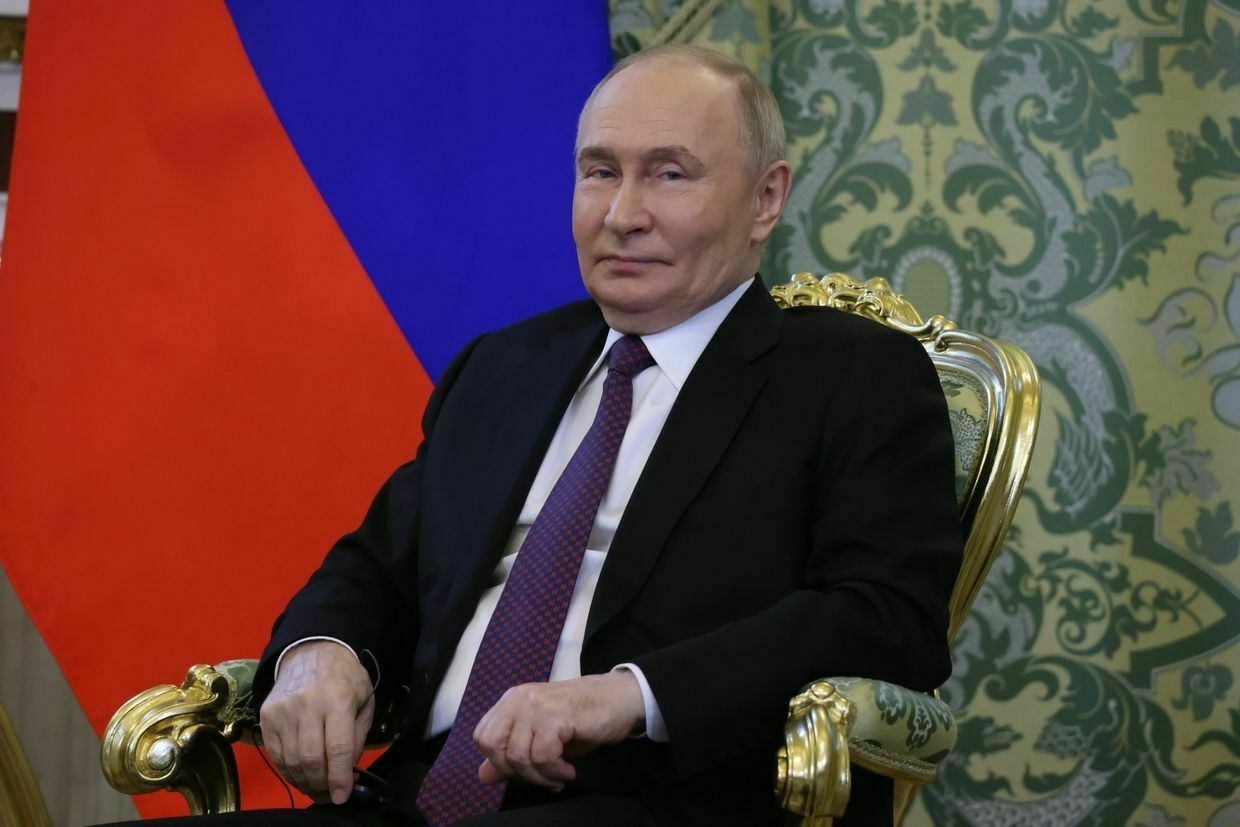
Russian President Vladimir Putin in Moscow, Russia, on May 28, 2025. (Contributor / Getty Images) “When the full-scale invasion started, the Russians attacked Ukraine with what they call the contract servicemen, the professional military who have some experience, and (voluntarily) sign contracts for a fixed period of time,” Kateryna Stepanenko, Russia deputy team lead and analyst at the Institute for the Study of War (ISW), told the Kyiv Independent.
But Russia soon ran into a problem — the Armed Forces of Ukraine.
The Kremlin had envisioned a swift and easy victory over Ukraine, and the capture of Kyiv within a matter of days. This proved to be a disastrous miscalculation and instead, many of Russia’s most elite troops and modern equipment were obliterated by Ukrainian resistance.
As the war dragged on, and Russia’s losses mounted, Moscow needed to replenish its forces without drawing upon its conscript army and announcing a full mobilization to avoid unrest.
A partial mobilization announced in September 2022 led to the only widespread protests against the war inside Russia during the entire full-scale invasion, making clear to Putin that announcing anything more would cause him serious problems.
“The Russians realized that they were in a challenging political situation,” Stepanenko said.
The solution? Pay people to fight.
“It is the only way of recruitment for the war now because ideologically motivated recruits ended in spring-summer 2022 and partial mobilization of the fall 2022 created domestic political tensions and risks which were considered as unacceptable for the Kremlin in those circumstances,” Pavel Luzin, senior fellow with the Democratic Resilience Program at the Center for European Policy Analysis (CEPA), told the Kyiv Independent.
The contract soldier’s priceRussia’s mounting losses throughout the war created a double-edged problem — more and more replacements were needed, but attracting them to what was clearly such a high-risk endeavour necessitated increasing rewards.
The solution? Keep offering more and more money.
Sign up bonuses for joining the Russian army have ballooned over the course of the war. In July 2024, Putin ordered a doubling of the lump-sum payment offered to recruits in September 2022 to 400,000 rubles (over $5,000).
But this was just the base level payment — the Kremlin has placed recruitment quotas on Russian oblasts, meaning some have had to offer many times more than this in order to reach them.
“There are some oblasts in central Russia that are offering up to $40,000, 3 million rubles plus, just for a one-time sign-up bonus,” Barros said.
For context, the average Russian monthly wage in 2024 was $980, so a one-time sign up bonus of $40,000 is nearly four times higher than what the average worker can expect to make in a whole year.
But with such huge losses in Ukraine, the bill for the Kremlin is huge.
“They lose and recruit somewhere in the ballpark of 35,000 to 45,000 people per month, and perhaps they recruit a little bit north of that number,” Barros said.
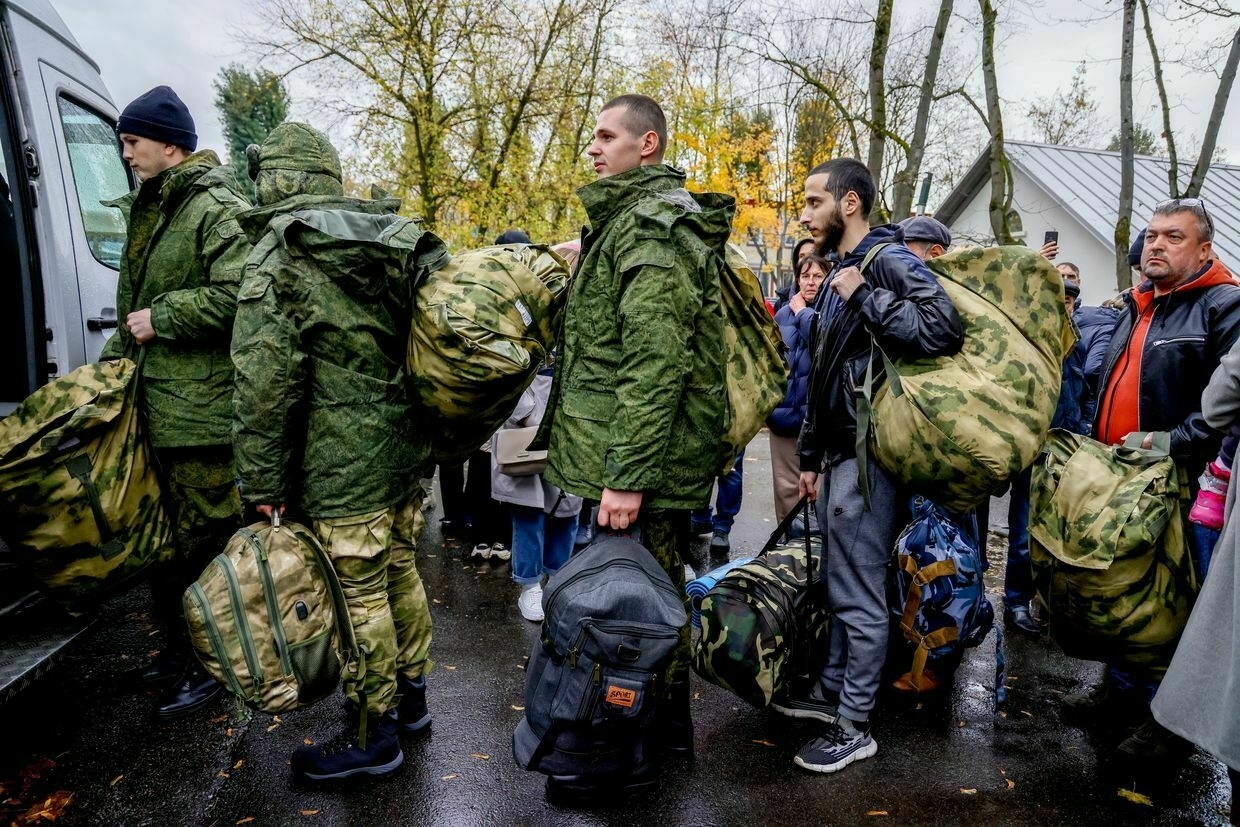
More than 200,000 people have reported for service under partial mobilization in Moscow, Russia, on Oct. 4, 2022. (Sefa Karacan / Anadolu Agency via Getty Images) 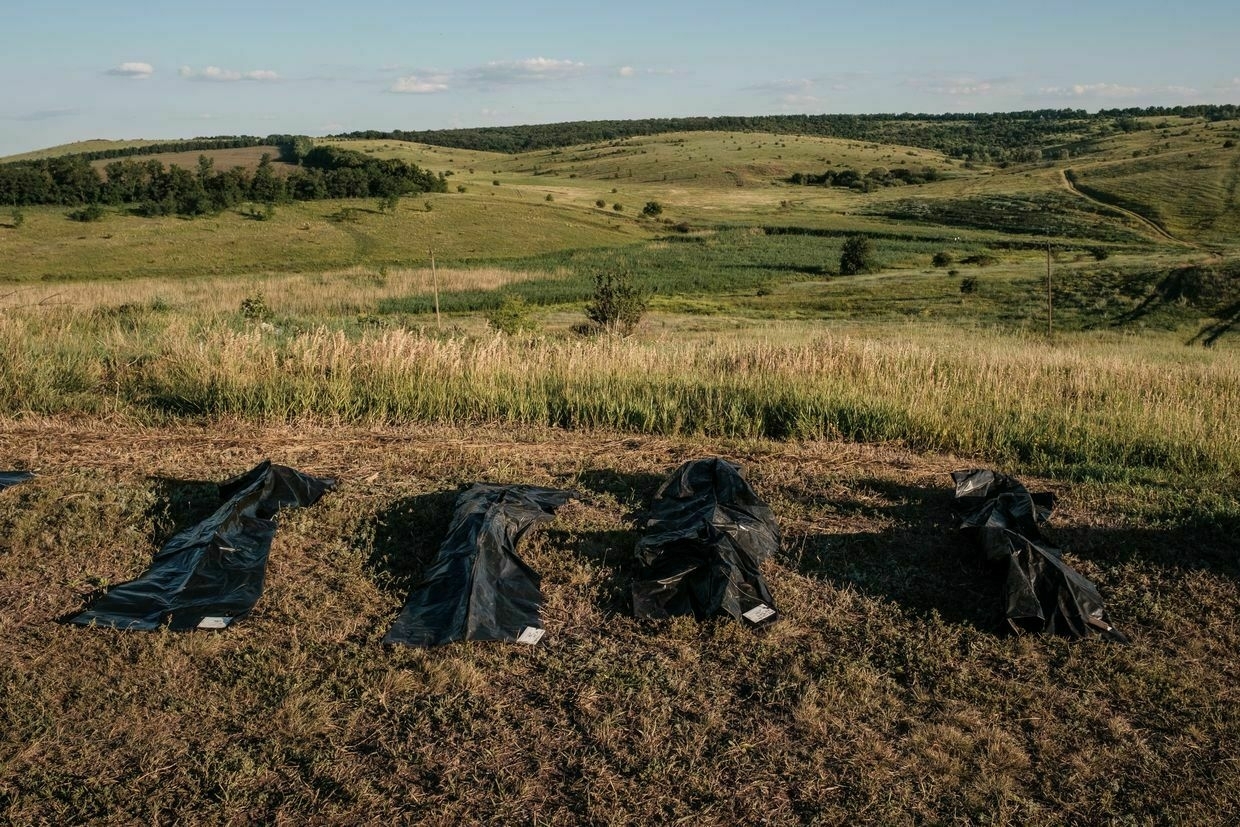
Remains of Russian soldiers found in the Bakhmut battle zone, in Sloviansk, Donetsk Oblast, Ukraine, on June 29, 2024. (Pablo Miranzo / Anadolu via Getty Images) “At $40,000 a head just for the sign-up bonus, let alone salaries and other benefits and remittances if you’re killed or wounded, this is a very fast way to not be sustainable."
According to an analysis by economist Janis Kluge, Russia’s daily bill just for sign-up bonuses is $24 million.
The ballooning bills come at a time when Russia’s economy is already under huge strain from Western sanctions and falling oil and gas revenues.
“The implications for Russia are grave,” energy security analyst Wojciech Jakóbik wrote in an op-ed for the Kyiv Independent this week.
“Military spending has ballooned to 6.3% of GDP — its highest level since the Cold War — while the budget deficit continues to rise,” he added.
“To fund its war, the Kremlin is raiding reserves, raising taxes, and cutting social programs. Absent war spending, Russia might already be in recession."
Could Russia’s economy collapse?Predictions about the imminent collapse of Russia’s economy have been made throughout its full-scale invasion of Ukraine, yet so far it hasn’t crashed and burned as some expected.
But three years of sanctions are eroding the country’s fiscal stability, despite Moscow claiming otherwise.
Russian GDP growth has dropped precipitously this year as sanctions hamper its main sources of income — oil and gas revenue — and curb imports of components needed for its military-industrial complex.
According to Barros, making any predictions about whether or not the Russian economy is going to collapse is “supremely difficult to do,” but the signs for the Kremlin “don’t bode well."
“If you look at the current Russian economic indicators, for example their inflation rate, their overnight lending interest rates, Russian monetary constraints… government spending is out of control — it’s a very loose fiscal policy and so the economy is at risk of overheating,” he said.
“I don’t know to what extent the economy can continue to last."
Barros said one major thing to keep an eye on are the Russian banks that are taking on “tremendous amounts of debt” in order to finance the Russian economy and the Kremlin’s war machine in Ukraine.
“I suspect what will happen one day at the current rate is a Russian bank will have to default on its debt and that will trigger some sort of financial meltdown,” he said.
“I can’t name the time or the hour or the place, but it seems very much like Vladimir Putin today is writing checks that Vladimir Putin a year or two years from now will not be able to cash."
Keeping up the pressure on the Russian economyCurrently, Western sanctions against Russia are still in place and the EU has just announced its 18th package.
In the U.S., a bipartisan sanctions bill, introduced on April 1 by Republican Senator Lindsey Graham and Senate Democrat Richard Blumenthal, seeks to impose a 500% tariff on imports from countries that continue purchasing Russian oil and raw materials.
This would deal another major blow to the Kremlin and its ability to wage war but U.S. President Donald Trump seems in little rush to hurry it through.
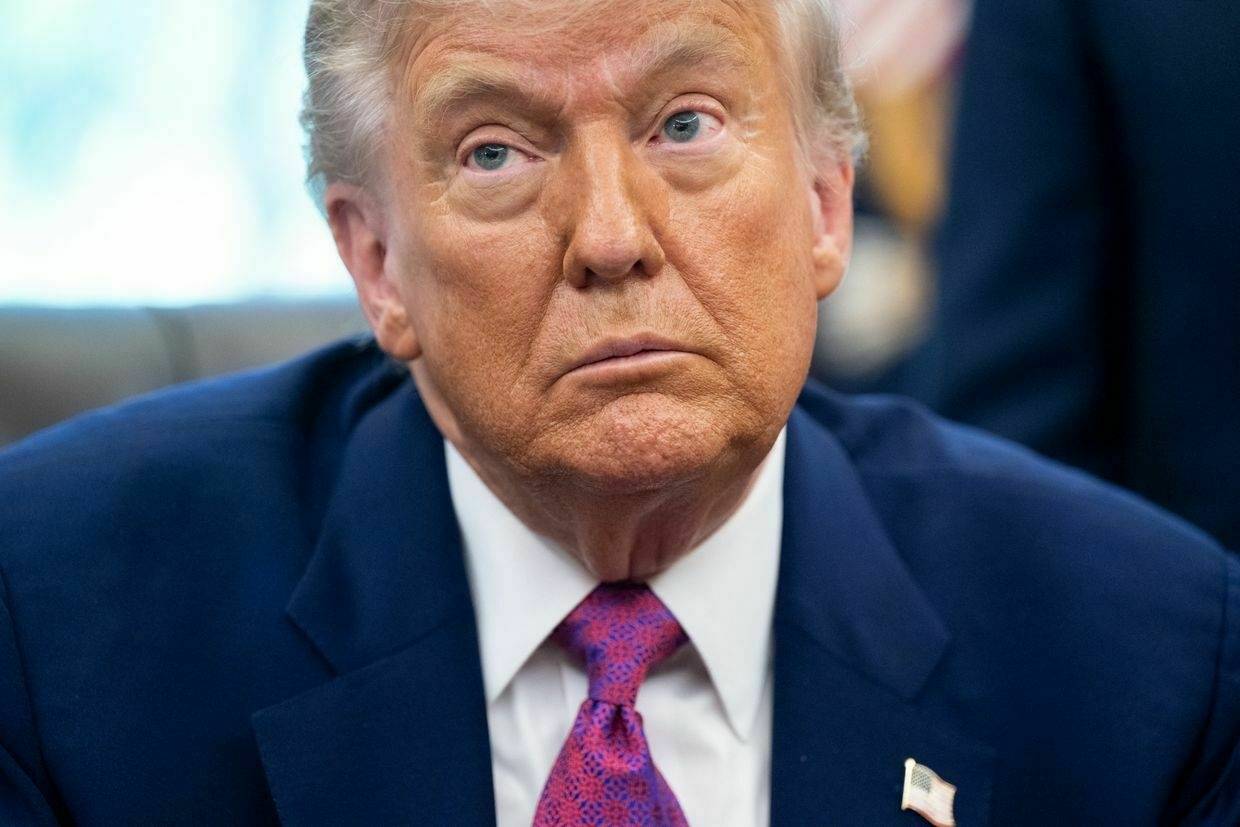
US President Donald Trump in Washington, DC, on June 10, 2025. (Saul Loeb / AFP via Getty Images) But the biggest factor in bringing down the Russian economy remains in the hands of Ukraine.
“We have to keep reminding ourselves that the key driver, the engine of Russia’s economic woes, is in fact its casualty rate and its losses on the battlefield in Ukraine,” Barros said.
“That is what is driving the need to recruit and replace 45,000 soldiers a month. That is what is destroying all the main battle tanks. That is what is actively destroying the Russians.
“And the minute the Ukrainians become less lethal, the minute that the Ukrainians do not impose those heavy losses on Russia at the same scale, then the economic picture becomes much better for the Kremlin."
Putin’s suspected daughter found working in anti-war galleries in ParisNastya Rodionova, a Russian writer and artist who has been based in Paris since 2022, had only met gallery manager Luiza Rozova in passing at events before she learned who the 22-year-old’s parents were. Described by a number of people as a “very nice and well-mannered girl,” Rozova isThe Kyiv IndependentKate Tsurkan

'Ukrainians have been stripped of illusion of control' — Filmmaker Kateryna Gornostai on Russia's war, cinema and reclaiming the narrative

When Russia launched its full-scale invasion of Ukraine, film director Kateryna Gornostai found herself questioning whether she would continue working.
“I had this feeling that life — at least professionally — had come to an end,” she says. “Who needed directors or screenwriters, then? At most, volunteers were needed, but hardly anyone involved in filmmaking."
The urgency of documenting the war soon became clear, but emotionally picking up a camera didn’t come easily. The 36-year-old filmmaker struggled with fear and doubt, knowing any shot she filmed could be her last.
“It felt scary that you’re filming, and these could be your last shots because now a missile will hit here. And that’s all that will be left of you."
Yet, she did return. In 2023, Gornostai began working on her first film following the start of the full-scale war.
Her latest documentary “Timestamp,” was screened at the 75th Berlin International Film Festival — making her the first Ukrainian director in nearly three decades to compete for the Golden Bear. The last was Kira Muratova’s “Three Stories” in 1997.
Gornostai attended the Berlinale only briefly, arriving just for the film’s screening on Feb. 20, days after giving birth to her son.
“Timestamp” follows students and teachers across different parts of Ukraine, including cities regularly pounded with Russian missiles and drones, showing what everyday school life looks like in the war-torn country.
The film is both intimate and unflinching, offering a glimpse into how kids endure the hardship of growing up under constant bombardment.
Gornostai dedicated the film to her younger brother Maksym, killed in action in 2023 while she was still filming.
On June 11, the movie premiered in Ukraine.
“It should be both fun and sad at the same time,” she told the Kyiv Independent days before the screening. “That’s what we hope for."
Author Yuri Andrukhovych on Ukrainian dissident art in Soviet timesIn Soviet times, being a pro-Ukrainian artist was dangerous. The Soviet secret police were particularly brutal in Ukraine, given that it was a country with a long history of resistance to Russian rule. Still, new generations of artists remained committed to their culture in the face of widespread Russification. AmongThe Kyiv IndependentKate Tsurkan
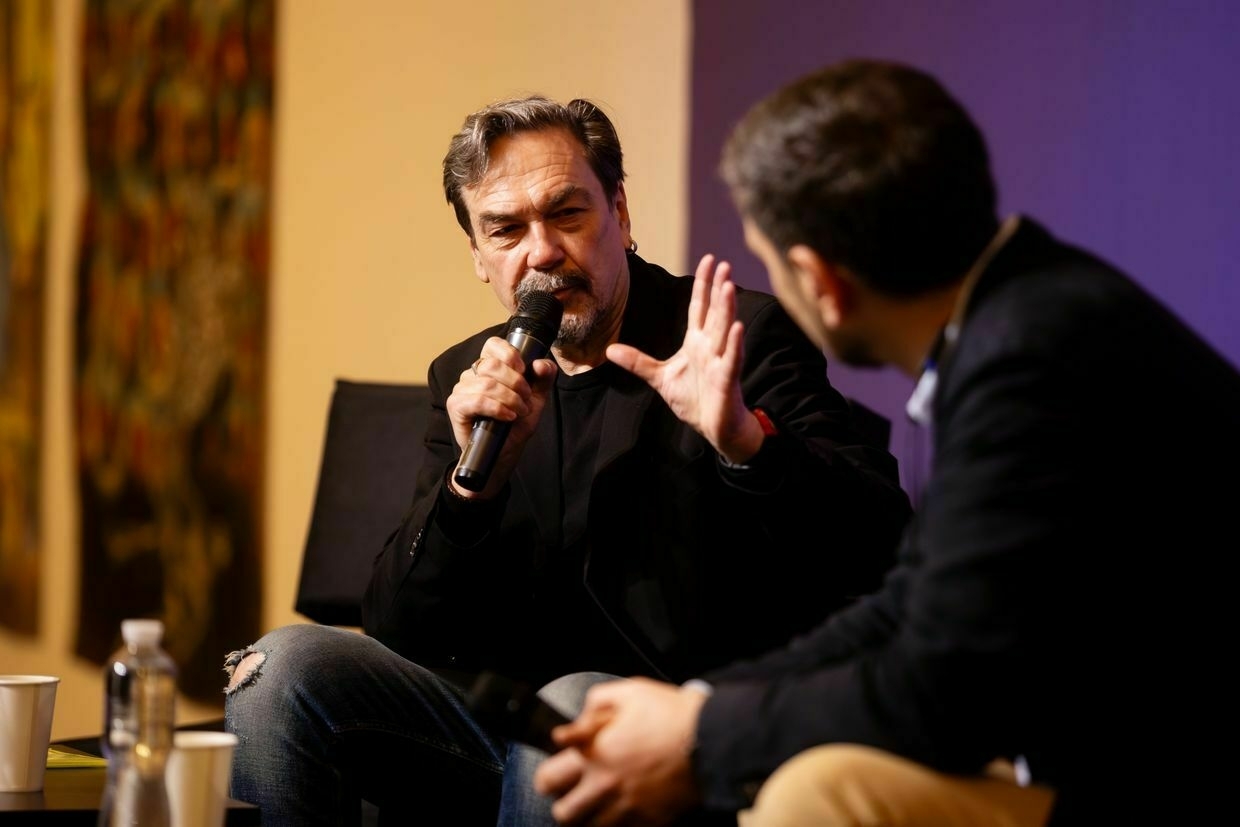
Childhood and warThemes of school and adolescence are in the spotlight of Gornostai’s work, with autobiographical and personal elements running through it.
Just over a month before Russia launched its all-out invasion, Gornostai’s debut feature film “Stop-Zemlia” premiered in Ukraine in January 2022. The movie earned recognition both at home and abroad, winning the Crystal Bear in the Berlinale Generation 14plus section, a category for movies that explore the life of children and teenagers.
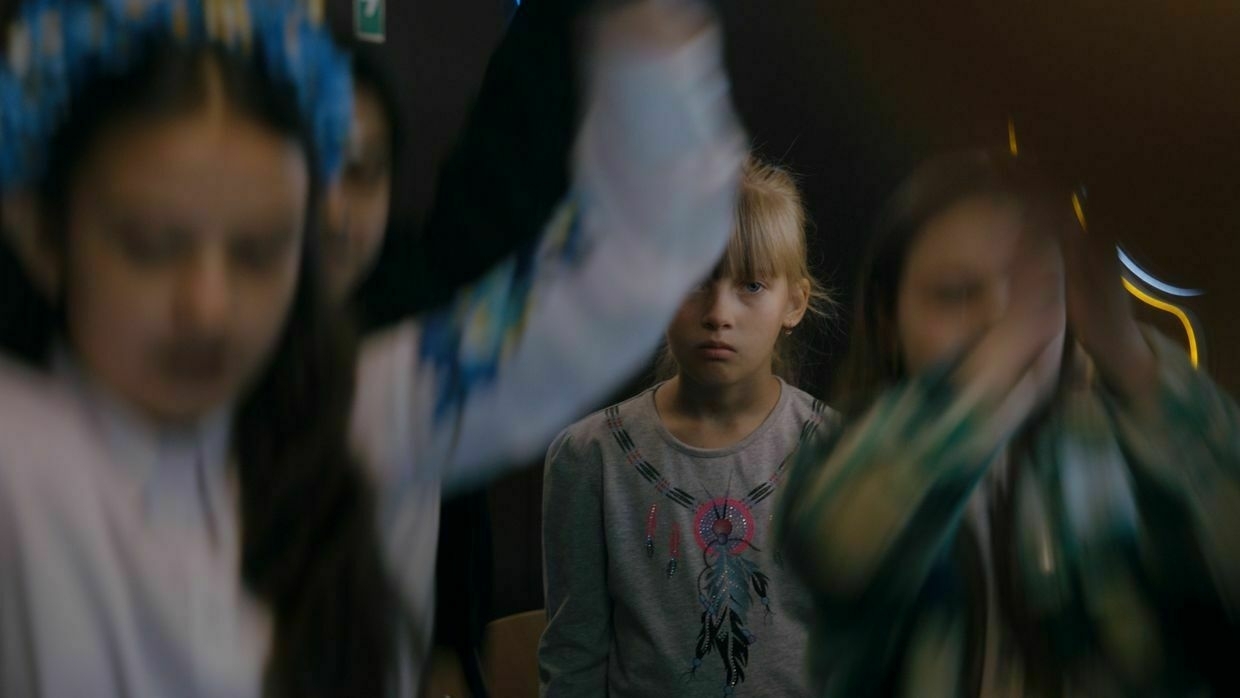
A screenshot from “Timestamp” documentary, Gornostai’s latest film, that was screened at the 75th Berlin International Film Festival. (Timestamp) “Timestamp” has the same focus, yet different story, showing a new reality that Ukrainian education is facing — remote learning, damaged infrastructure, constant air raids, studying in the subway, and the psychological trauma of kids at war.
One of the most important scenes in the film for Gornostai is the funeral of the school principal in the town of Romny, Sumy Oblast, killed in a Russian drone strike on the local school in August 2023.
It’s the only moment in the film where Russia is directly accused of aggression against Ukraine, the phrase spoken by a priest.
“Because already, so much pain has touched nearly every person. Everyone has experienced some kind of loss — from their homes to their loved ones. Many have lost the most precious thing of all: life itself.”
"This school didn't live to see its hundredth anniversary, which would've been next year. It survived World War II, but it didn't survive this war," Gornostai says.
Since the full-scale invasion of Ukraine, around 3,500 educational institutions have been damaged, and around 400 completely destroyed, Deputy Education Minister Yevhen Kudriavets said in late February of 2024.
Turning pointThe Euromaidan Revolution was a turning point for Ukraine — and for a new generation of filmmakers, including Kateryna Gornostai.
She was studying in Moscow at the time of the Maidan protests in 2013 but returned to Kyiv to document the unfolding events.
"We all started making documentaries that explored civil society," she says. "It was a moment of growth — personal and professional. You're filming real events but also thinking about how they'll come together as a story."
She made two documentaries during that time — "Maidan is everywhere" and "Euromaidan." Rough Cut, of which she was a co-author. While many turned their cameras toward the front lines of Russia's war in Ukraine's east that followed, Gornostai chose a different path.
"I'm very scared," she admits. "Even on Maidan, I couldn't stand between the Berkut (riot police) and the protesters like some of our colleagues. I stayed in the rear, and I remember thinking — there are stories here, too."
More than a decade later, she sees that moment as the foundation of a powerful wave of Ukrainian cinema.
"(The Euromaidan Revolution became) a separation from that post-Soviet, Eastern European blend — because it used to feel like our cinema was perceived as part of Russian cinema prior.
Russian propagandaDuring the interview, Gornostai's tone sharpens when the conversation turns to Russia's cultural influence.
For decades, Moscow cast a long shadow over Ukrainian cinema. Even after Ukraine's independence, Russian money and distribution networks kept a grip on the country's film industry.
That influence didn't vanish with the invasion — it just evolved. Since the start of the war шт 2014 against Ukraine, Russia's film industry has shifted to propaganda.

A portrait of Kateryna Gornostai after the interview in Sens bookstore in Kyiv, Ukraine on June 2, 2025 (Elena Kalinichenko/The Kyiv Independent) Yet, Russian films still screen at major international festivals, and Russian actors who support the war against Ukraine continue to win awards.
"Movies are just one small part of a much bigger (Russian) cultural push," Gornostai says.
"In fact, there is a huge campaign that has lasted for many, many decades, involving enormous financial resources, all aimed at creating an image (abroad). This is something that we (in Ukraine) have not done. And what we are trying to do now is to build some kind of postcolonial lens through which Ukraine should now be seen."
“Most of the films that have been screened somewhere weren’t made thanks to the circumstances in Ukraine, but rather in spite of them.”
Abroad, she says, fascination with Russian culture persists, while the understanding of Ukraine still lags behind.
"The fact that there are signs of genocide committed by Russia and that the Holodomor could have already been recognized as a genocide a century back — very few people know that abroad. But they do know the great Russian ballet, literature — all those things that were deliberately built up, promoted, and became part of a certain stereotype."
According to Gornostai, for a long time, there was a prevailing belief in Ukraine that the answer to Russian propaganda should be counter-propaganda. But she thinks that Ukraine should be creating high-quality cinema, not propaganda of its own.
"We simply need something completely different that will make us stand out and represent ourselves on the international stage. I think quality is very important now in this world," she adds.
Gornostai believes that the current crisis in Ukrainian cinema stems more from domestic policy than the war itself. Even before Russia’s full-scale invasion, government inaction had weakened the industry.
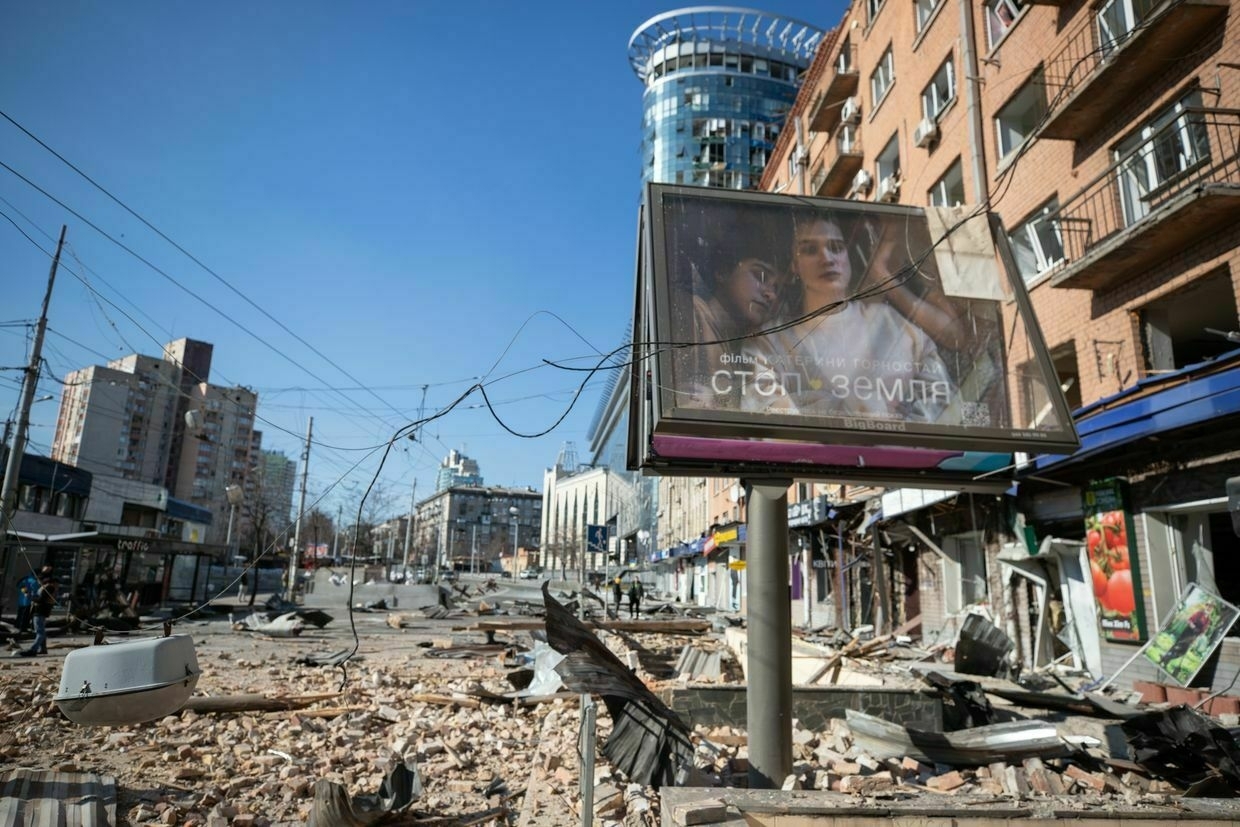
Debris from damaged buildings lies in the street and a destroyed billboard with Gornostai's movie "Stop-Zemlia" after shelling near Lukianivska metro station in Kyiv, Ukraine, on March 14, 2022. (Oleksii Samsonov / Global Images Ukraine via Getty Images) Following the invasion, funding for the State Film Agency was slashed. In 2025, only Hr 204.1 million ($4.9 million) is allocated, nearly 70% less than in 2024.
“Most of the films that have been screened somewhere weren’t made thanks to the circumstances in Ukraine, but rather in spite of them,” says Gornostai. “They were funded either by private money, individual initiatives, or through international grants, producers, or festival pitching awards that made production possible. Documentary filmmaking can survive in this way.”
A standout example is “20 Days in Mariupol” by director Mstyslav Chernov, which documented the Russian siege of the city in 2022 and won Ukraine’s first Oscar in 2024 for Best Documentary.
“This is a huge victory for the truth itself. It preserves and engraves the history of Mariupol and no one will be able to distort it anymore,” Gornostai says.
Post-war scriptGornostai's new feature film, "Antonivka," is expected to be released in 2027. Set in the aftermath of Ukraine's victory in the war, the film explores death.
"Even when this war ends, it won't truly be over," says Gornostai. "Because already, so much pain has touched nearly every person. Everyone has experienced some kind of loss — from their homes to their loved ones. Many have lost the most precious thing of all: life itself."
She believes that once the war ends, there will be a difficult period of collective reckoning — a time when people begin to process their grief. Her film, she says, is an attempt to open that conversation.
"There's this ephemeral law that time heals. It works very strangely. It doesn't really heal. That's not the whole phrase," Gornostai says. "Time simply passes, and it's as if layers of new experiences start to build up after that very significant moment in your life — for example, the death of someone close to you. These layers grow, and it's as if they gradually distance you from that moment."
"That's the subject I'm grappling with now — and it's a subject many others are facing too," she continues. "How do we grieve that kind of loss? How do we reflect on it? The film deals with many kinds of deaths, but at its core, one of its central elements is the acceptance of your own death — the one that awaits you."
One of the central figures in the film is an elderly man who lived through famine and war. As Gornostai speaks, she recalls her two grandfathers who passed away.
"Ukrainians have now been stripped of the illusion of control," the filmmaker says. "But still, I'd like to have the privilege of dying at a time when I know that my family will remain here, that people speaking the Ukrainian language will remain here, and that there is peace and life on this land. And that I am leaving it behind. Not dying in a moment of total turbulence and uncertainty about what will happen tomorrow — as if I'm leaving everyone in the middle of that."
"So this is another privilege: a privilege to die in a free country. And this is one of the motivations for making this film."
Wondering where to start with Dostoevsky? Try his Ukrainian contemporaries insteadSince the start of Russia’s full-scale invasion of Ukraine in 2022, a growing debate has emerged over the cultural and political legacy of Russian literature — particularly the global reverence for classic Russian authors, which critics argue has long served to promote the imperial narratives embedded in their work. AsThe Kyiv IndependentKate Tsurkan
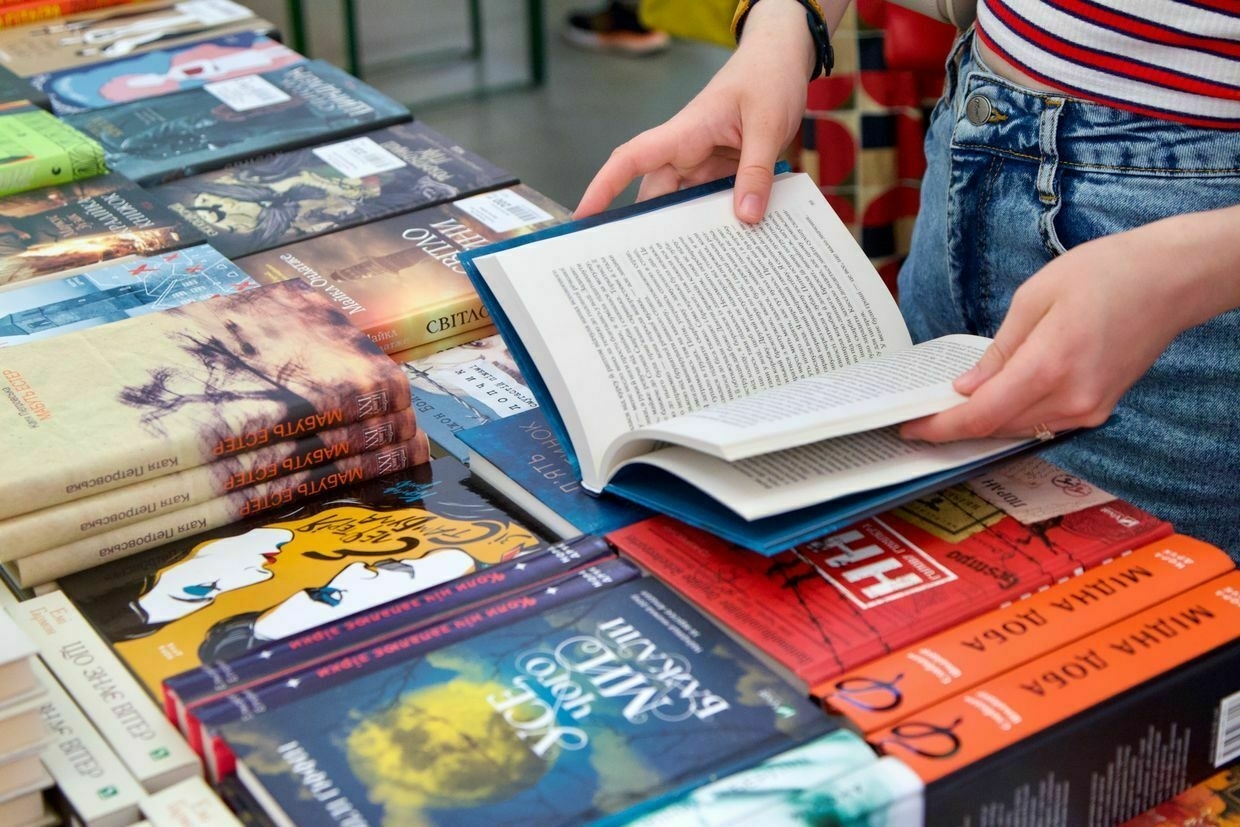
Note from the author:
Hello there! This is Kateryna Denisova, the author of this piece. As Russia’s war against Ukraine grinds on, Ukrainian filmmakers like Kateryna Gornostai are capturing stories that reveal the reality on the ground.
I hope many people will watch these films and learn more about Ukrainian cinema and its directors through interviews like this one.
Your support helps make this work possible. Please consider contributing to sustain our reporting.
Kyiv Pride drone charity event takes place, faces counterprotest
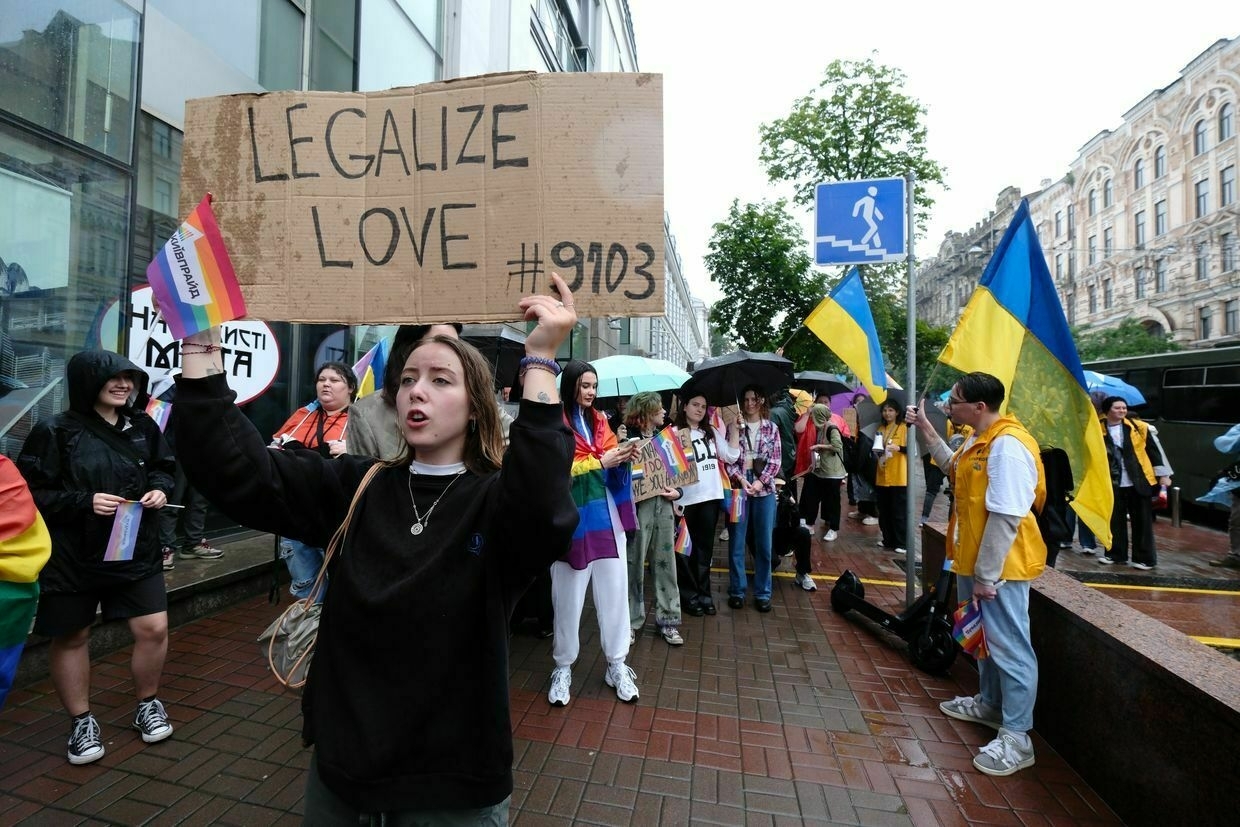
A charity event for Kyiv Pride took place on June 7 outside the Foreign Ministry and was met with nearby counterprotests.
The event collected donations, with proceeds going toward FPV drones for Ukraine’s Armed Forces provided by the Serhiy Sternenko Foundation.
On April 19, a clash broke out between police and far-right protesters outside the Zhovten cinema in Kyiv, where the Sunny Bunny LGBTQ+ film festival took place.
“This is a cultural and educational charity event. Today we will have several educational lectures, during which we will collect money for drones,” Kyiv Pride organizers told local media.
Counterprotesters stood nearby, chanting anti-LGBTQ+ slogans as the Kyiv Pride charity event took place outside the Foreign Ministry building.
Kyiv Pride’s previously planned event was cancelled amid police pressure on the National Expo Center of Ukraine (VDNG), the event organizers said.
“This year, the police did everything they could to cancel our event. They even intimidated the management of VDNG — the National Expo Center of Ukraine… Unfortunately, under such pressure, VDNG made the decision to cancel our event,” Kyiv Pride said in a post to Facebook on June 6.
Public support for LGBTQ+ rights in Ukraine has grown in recent years, but the community continues to face frequent threats and violence, particularly from far-right groups. Events such as Pride marches and queer cultural festivals are often targeted by the far right.
A 2023 poll by the Kyiv International Institute of Sociology found that over 70% of Ukrainians believe LGBTQ+ people should have the same rights as others.
Kyiv Pride held a march in June 2024 for the first time since Russia began its full-scale war against Ukraine in February 2022.
Wondering where to start with Dostoevsky? Try his Ukrainian contemporaries insteadSince the start of Russia’s full-scale invasion of Ukraine in 2022, a growing debate has emerged over the cultural and political legacy of Russian literature — particularly the global reverence for classic Russian authors, which critics argue has long served to promote the imperial narratives embedded in their work. AsThe Kyiv IndependentKate Tsurkan
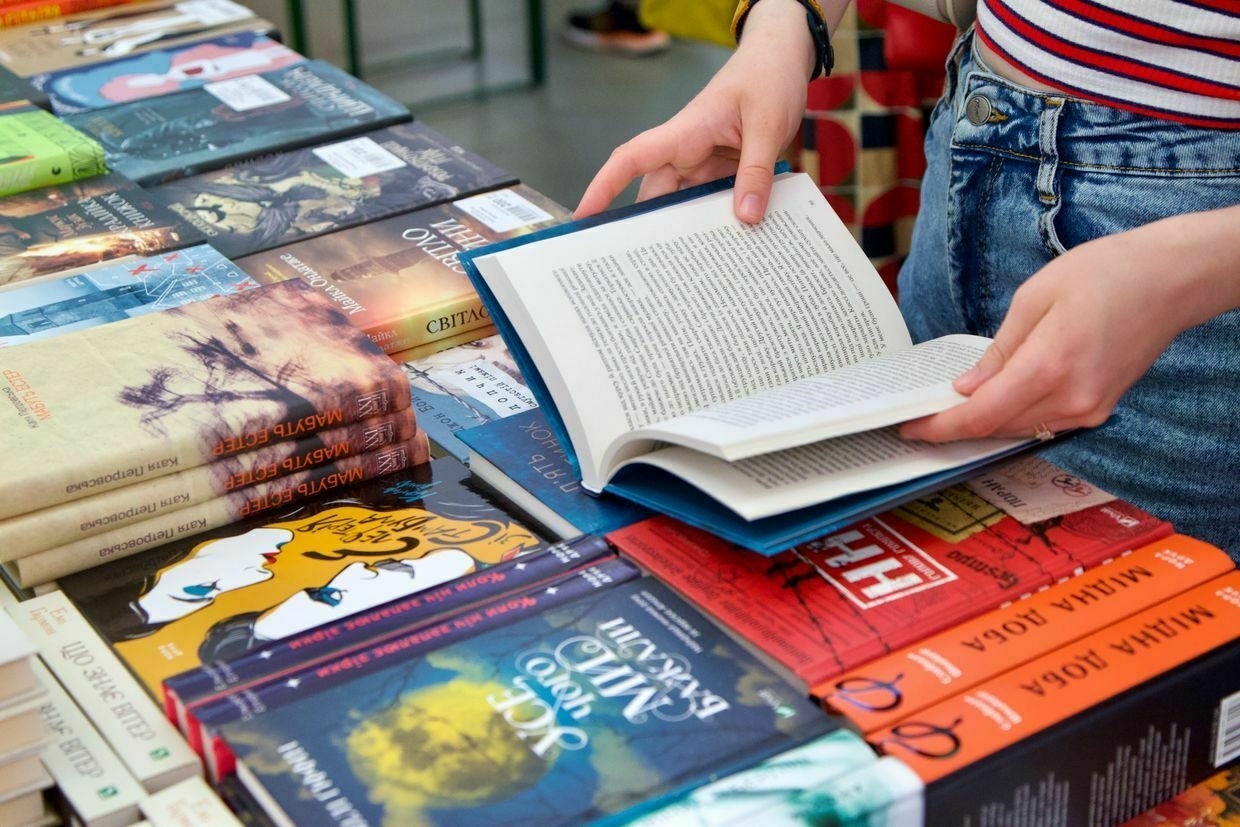
EU tariffs on Ukrainian goods return after 3 years of war, complicating Kyiv's path to European integration
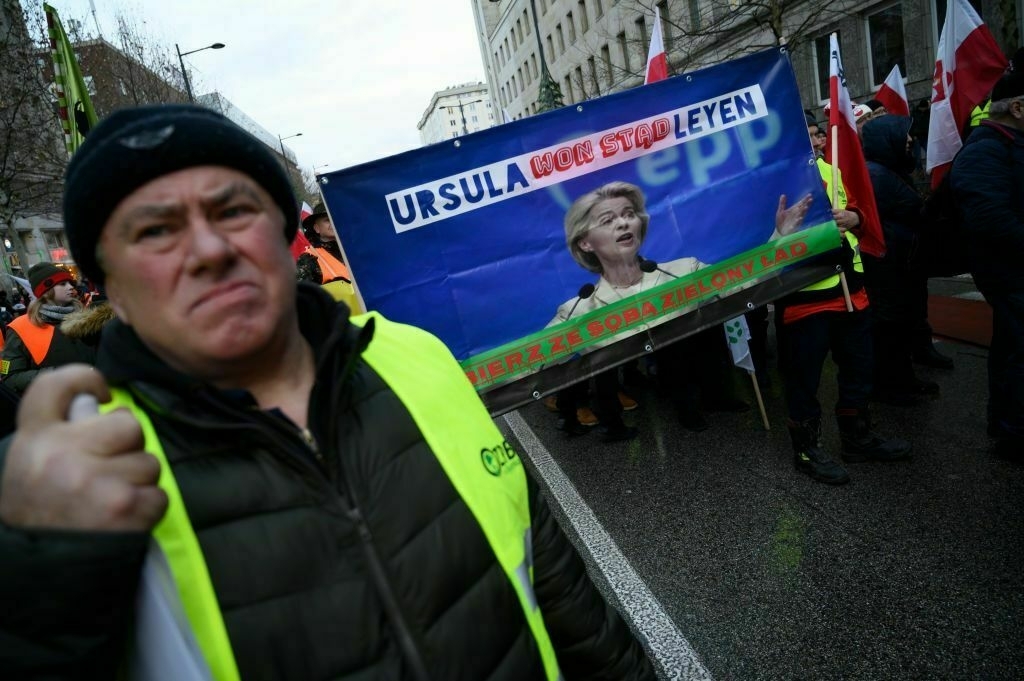
The European Union is set to reinstate tariffs on Ukrainian agricultural exports on June 6.
This is the first time since Russia’s full-scale invasion that the EU will not renew an agreement suspending trade barriers between Ukraine and Europe.
The end of tariff-free trade comes amid mounting opposition to Ukrainian exports — and Ukraine’s EU accession — from eastern European bloc members, including Poland and Hungary.
While a transitional agreement will govern trade to the end of 2025, negotiations between Brussels and Ukraine for a more favorable long-term agreement began on June 2, according to European Pravda.
The temporary arrangement from June 6 allows for more liberal trade than established under earlier rules. But tariffs will return in full starting in 2026 — unless talks in Brussels succeed in updating the pre-war framework.
The talks will test the EU’s ability to balance concerns from member states with Ukraine’s closer integration into the trading bloc.
Who is Nawrocki, Poland’s new president, and what could his narrow victory mean for Polish-Ukrainian relations?In a closely contested presidential runoff, conservative historian Karol Nawrocki has been declared the winner of Poland’s 2025 presidential election, securing 50.89% of the vote against liberal Warsaw Mayor Rafał Trzaskowski’s 49.11%. The result marks a significant shift in Polish politics, with consequences for both the domestic andThe Kyiv IndependentAleksander Palikot
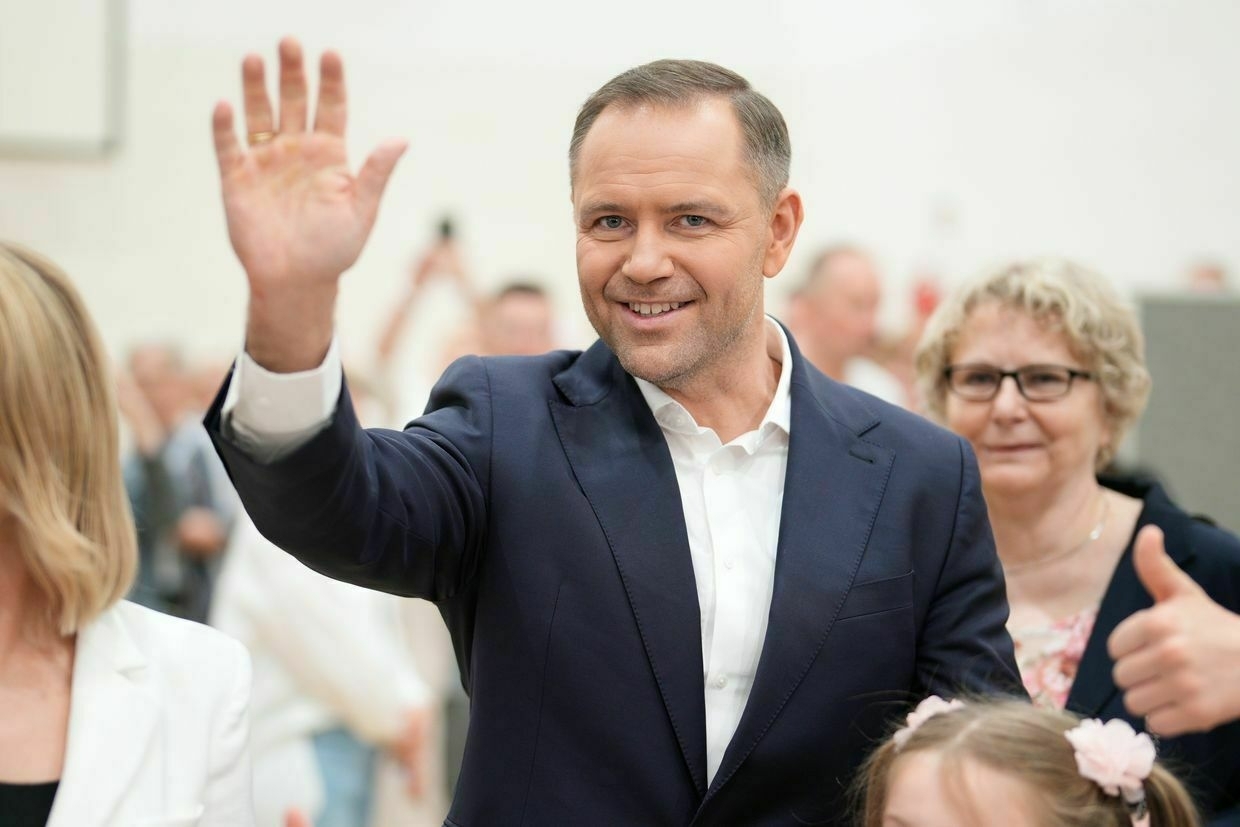
How wartime trade relief for Ukraine impacted EU statesThe so-called Autonomous Trade Measures (ATMs) were introduced in June 2022 shortly after Russia’s full-scale invasion of Ukraine. They removed tariffs that applied to some Ukrainian agricultural goods under a 2016 trade agreement, including sugar, honey, wheat, and poultry.
Along with “solidarity lanes," which established alternative logistics routes, the 2022 trade measures facilitated the export of Ukrainian agricultural goods by land, bypassing Ukrainian ports blockaded by Russia in the Black Sea.
With maritime exports paralyzed, overland shipments to EU neighbors — especially to Poland, Romania, and Hungary — surged, provoking protests from local farmers who claimed Ukrainian goods were overwhelming markets and lowering prices.
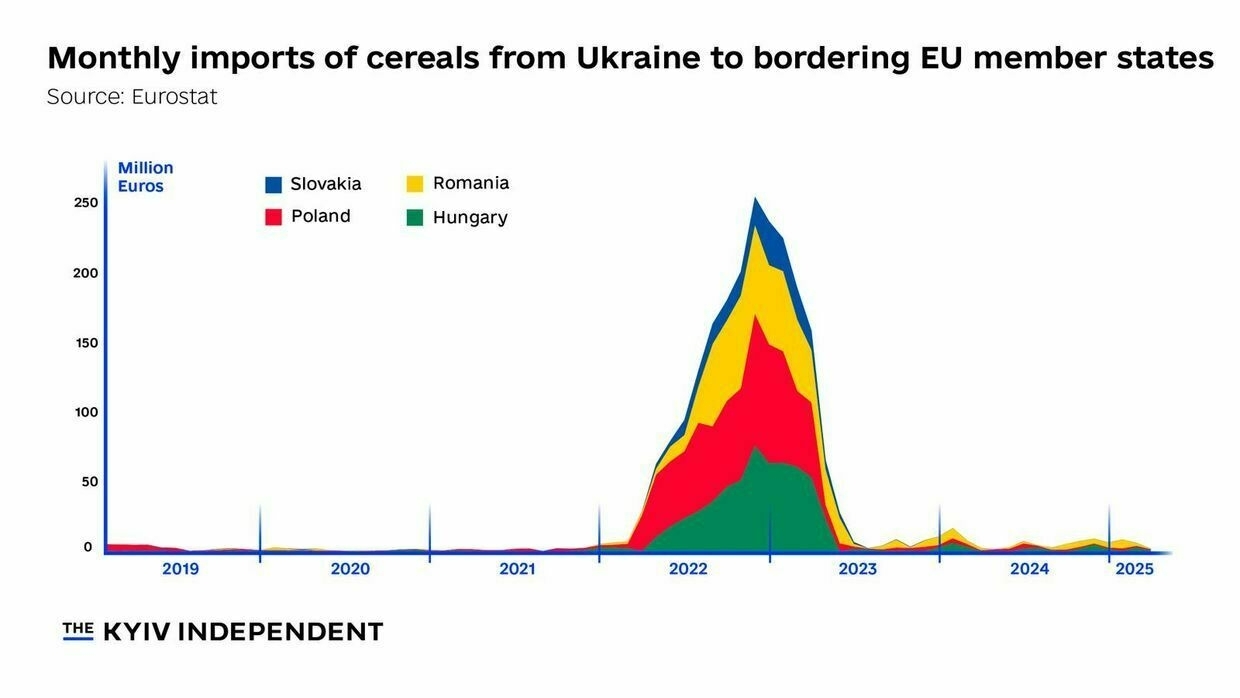
Although Brussels initially intervened to curb Ukrainian imports, Slovakia, Poland and Hungary applied unilateral bans on some Ukrainian goods in September 2023, citing national security issues but defying EU trade rules.
The influx following the trade measures set to expire on June 6 has been touted as a sign of Ukraine’s incompatibility with the EU. The issue was on the campaign agenda in the recent Polish presidential election, with both candidates voicing concerns over Ukrainian agricultural imports.
According to Svitlana Taran, policy analyst at the Brussels-based European Policy Centre, the 2022 trade measures were not the main driver of the surge.
“Politicians have accused ATMs as the primary reason for this situation, which is not the case,” she told the Kyiv Independent.
“This was an exceptional situation caused by the sudden collapse of Ukraine’s main export routes. The influx was not caused by the removal of tariffs, but by Russia’s invasion and blockade, and insufficient transport capacities. The suspension of tariffs was just one of the factors, and after Ukraine unblocked Black Sea channels, this situation was eased."
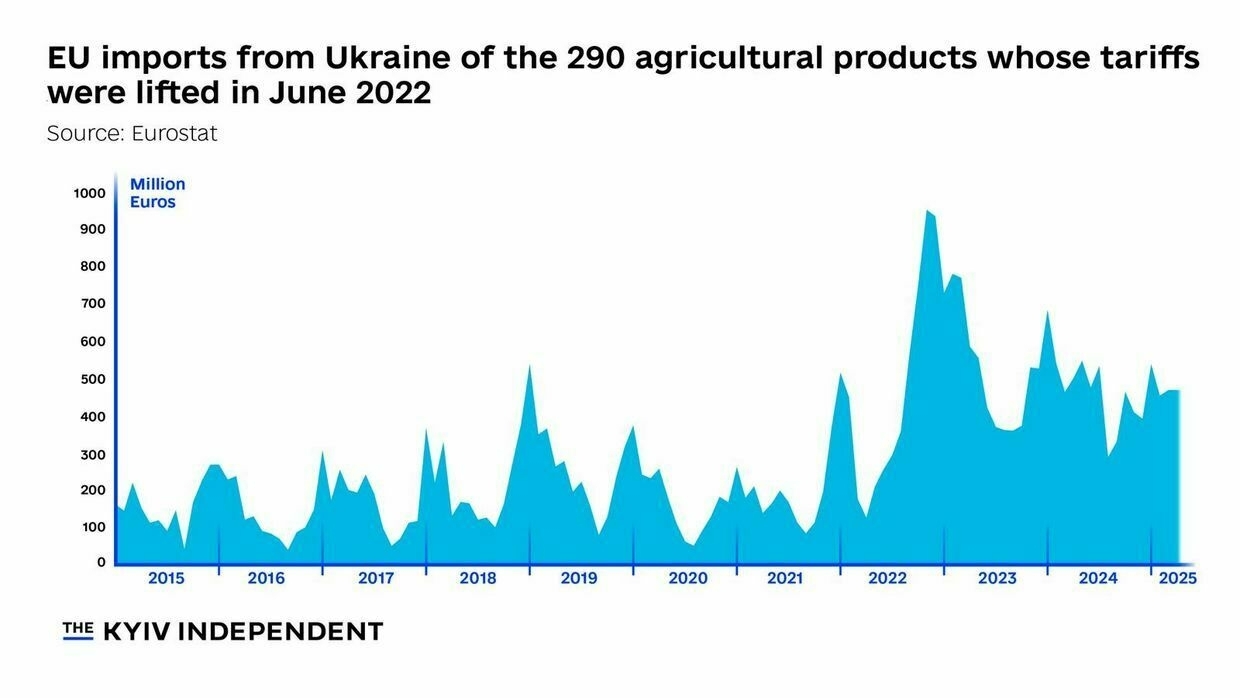
European imports of Ukrainian products whose tariffs were lifted did initially spike to an unprecedented level of over 900 million euros, but then quickly declined. Imports of these goods are now generally higher than they were before the full-scale invasion, but not at unprecedented levels.
“This example cannot be used to frighten EU farmers that it would be a normal situation if they open their markets to Ukrainian agriculture,” Taran added.
There is also little evidence that Ukrainian products affected prices in bordering countries.
“We looked at (prices) for sugar and found no evidence,” Stephan Cramon-Taubadel, chair of Agricultural Policy at the University of Gottingen, told the Kyiv Independent.
“I currently have some preliminary results that show slightly depressed local prices for wheat in eastern Polish regions bordering Ukraine in parts of 2023 and 2024, but it’s much less than it’s made out to be, and something that the EU could easily compensate."
Nevertheless, Brussels will not renew the ATMs following longstanding pressure from eastern European countries looking to appease the farmers' lobby.
In wartime Ukraine, a university grows — and reclaims a space once reserved for the corruptOnce the playground of disgraced Ukrainian politicians, a golf club in Kyiv’s Soviet-era Obolon neighborhood is now set to become the new campus of the Kyiv School of Economics, which last month bought the site for $18 million as part of a $40 million investment — the largest private investmentThe Kyiv IndependentLiliane Bivings
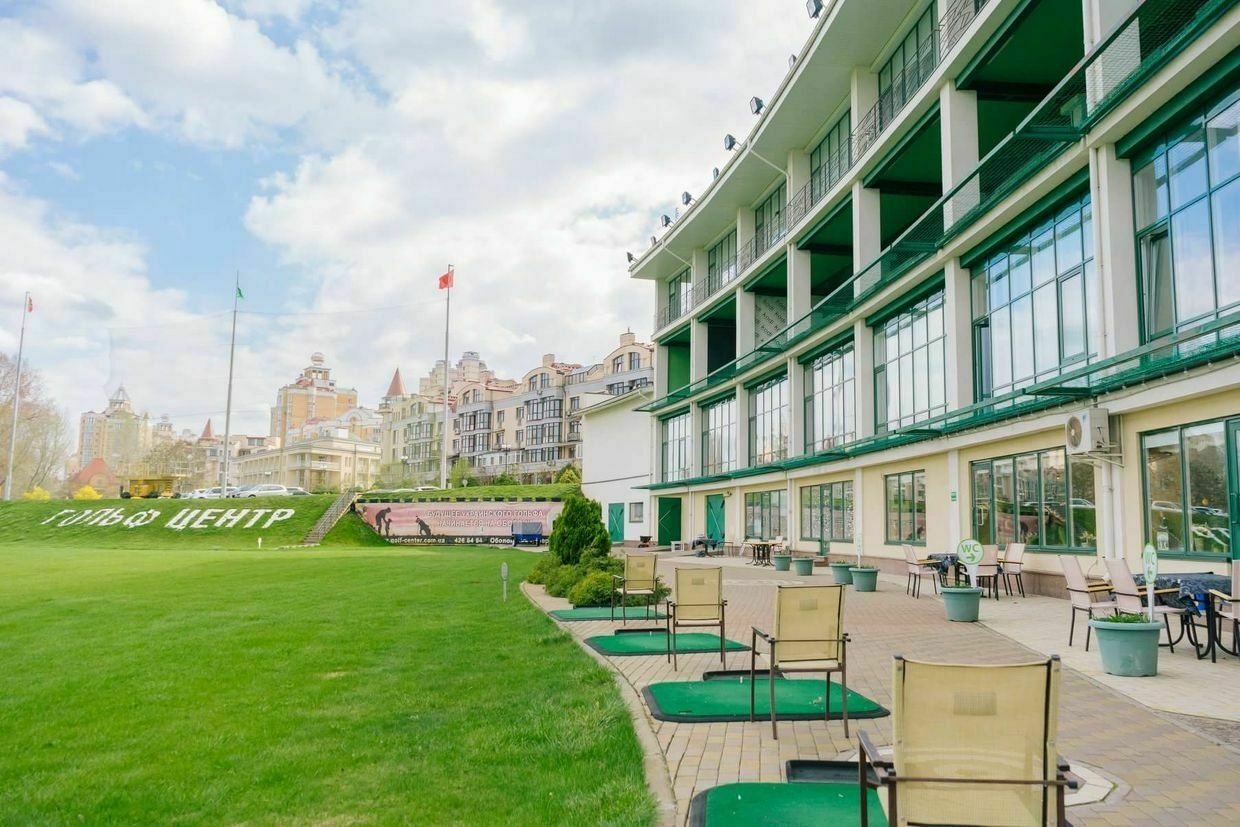
More roadblocks on Ukraine’s European pathThe reversion to pre-war rules is a step back for Ukraine’s exporters.
The EU has become a closer trading partner for Ukraine since the full-scale invasion began. Over 60% of Ukraine’s exports now go to the EU, relative to about 40% before the war.
Reverting to the pre-war rules may pose challenges to Ukrainian exporters, who have adapted to trade with fewer tariffs.
“It’s a challenge, because it’s not something businesses were fully prepared for,” Veronika Movchan, academic director at the Institute for Economic Research and Policy Consulting, told the Kyiv Independent.
“Many hoped that the measures would continue, at least to some extent. I expect that some businesses made decisions based on the existing regime."
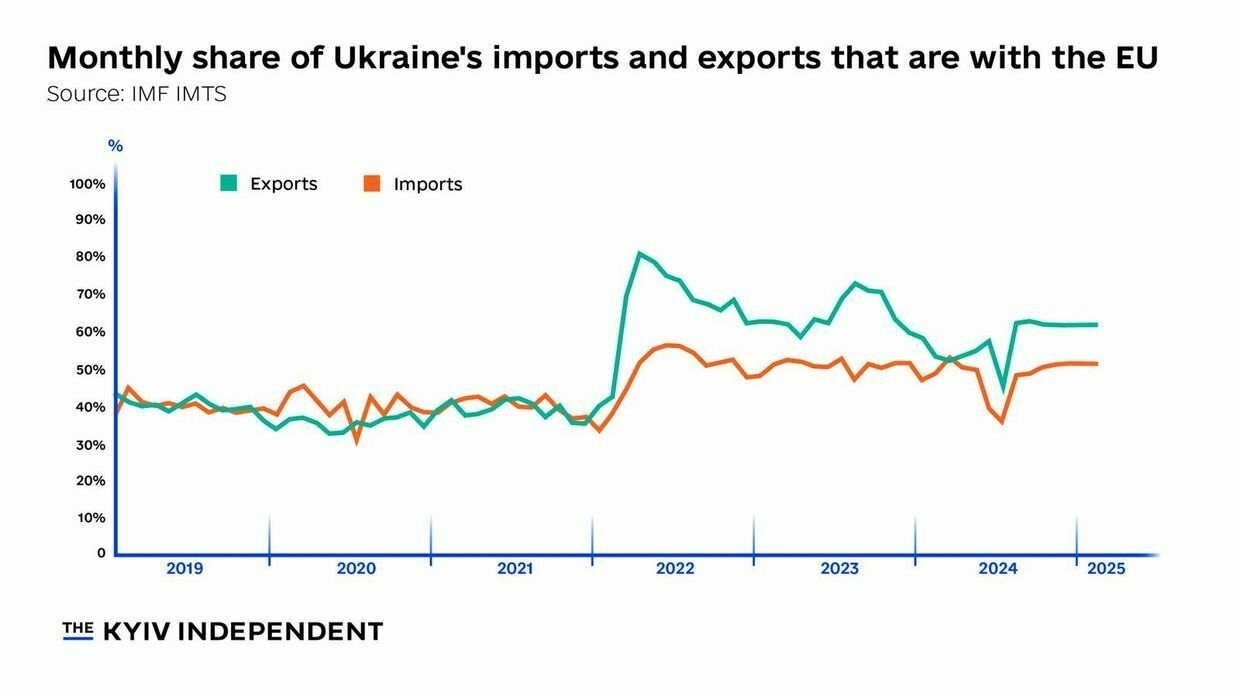
The Ukrainian Agribusiness Club estimates that, in 2025, Ukraine will lose up to 1.1 billion euros ($1.2 billion) in foreign exchange earnings under the temporary measures, and 3.3 billion euros ($3.7 billion) next year if no agreement is reached.
But there may even be barriers to reverting back to the 2016 trading rules, given the fraught politics surrounding the bans currently imposed by Poland, Hungary and Slovakia.
“It’s not even apparent that, when the free trade measures expire on Friday, these countries will lift the bans,” said Movchan.
“Some member states even imposed bans on goods that didn’t have any barriers before the war, such as sunflower seeds and rapeseed."
The episode highlights the potential for domestic politics within the EU and bilateral disputes to impede closer trade relations with Ukraine.
It also demonstrates the opportunities for Russia to attempt to derail this process.
“One thing we shouldn’t underestimate is presumably largely Russian propaganda,"
Cramon-Taubadel said.“If we look at the channels from which some farmers are getting their information, there is much unsubstantiated fear-mongering claiming that imports from Ukraine are depressing prices."
Controversial Russian literature prize sparks debate on separating culture from war crimesLaunched to promote Russian literature on the global stage during Russia’s full-scale invasion of Ukraine, the new Dar (“Gift”) literary prize is already mired in controversy — and not just for its troubling timing. After Ukrainian author Maria Galina declined the award for her wartime chronicle of Odesa, attention shiftedThe Kyiv IndependentKate Tsurkan
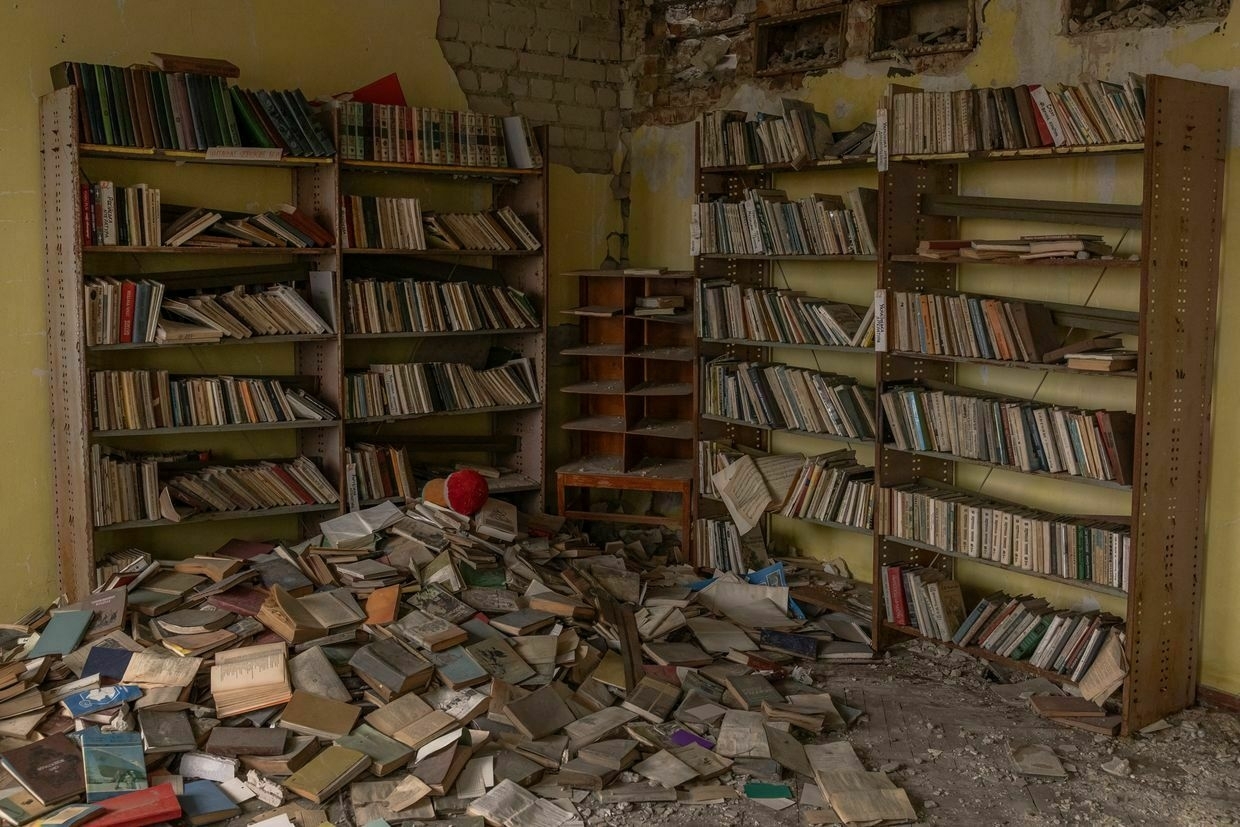
Slovak parliament urges government to oppose new Russia sanctions
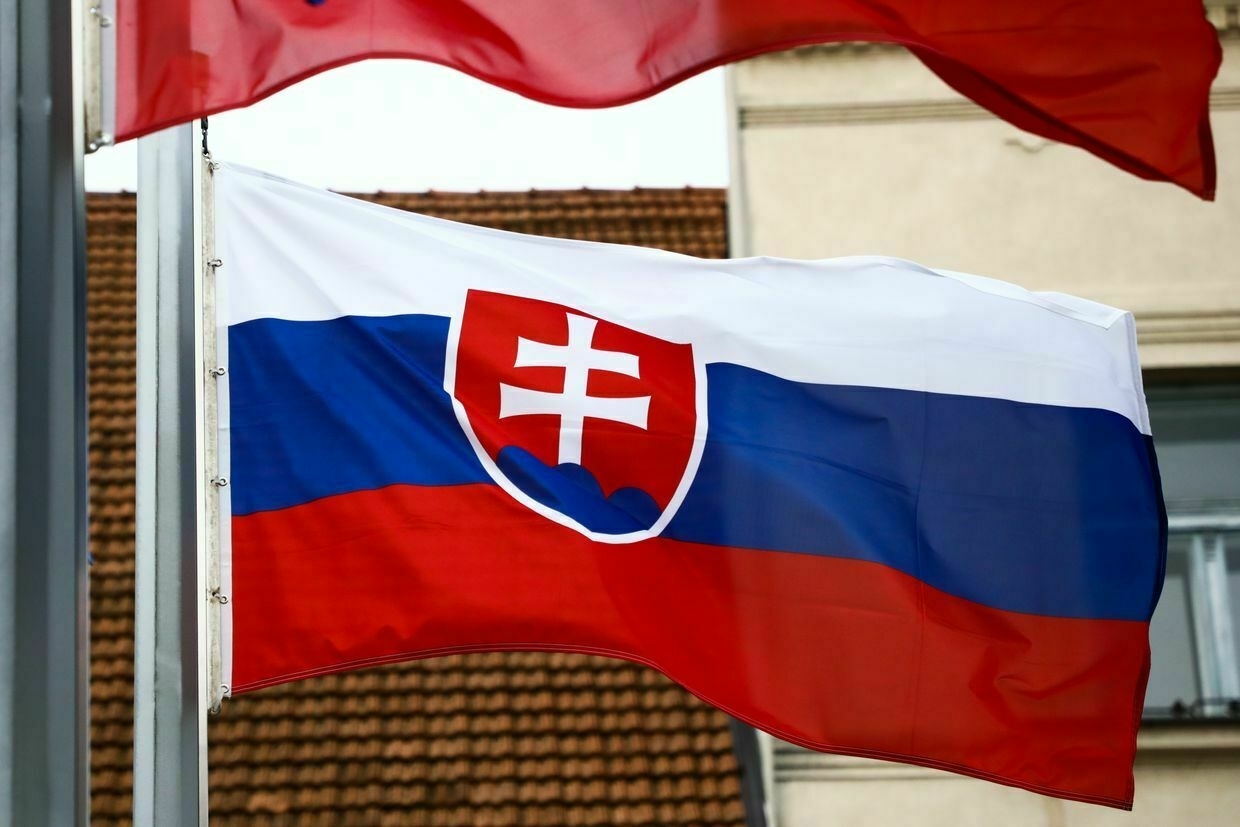
Slovakia’s parliament passed a resolution on June 5 urging the government to oppose any new international sanctions or trade restrictions against Russia, citing alleged negative economic impacts, Slovak news outlet Noviny reported.
The non-binding resolution argues that the sanctions imposed in response to Russia’s full-scale invasion of Ukraine have driven up energy prices, disrupted supply chains, and harmed Slovak industry.
The resolution calls on government ministers to “defend national economic interests” in international forums and resist further punitive measures targeting Moscow.
The motion was introduced by the far-right Slovak National Party (SNS) and passed with the support of 51 of the 76 lawmakers present.
All SNS deputies backed the measure, along with most members of Prime Minister Robert Fico’s left-wing Smer-SD party, several from the coalition partner Hlas-SD, and some independents.
Only one Hlas-SD lawmaker, Jan Ferencak, voted against the resolution; 23 others from the same party abstained. Opposition lawmakers boycotted the vote entirely.
While Fico’s Smer party has drawn criticism for its increasingly pro-Russian rhetoric, the SNS promotes a “pan-Slavic brotherhood” narrative that aligns closely with Kremlin talking points.
The resolution does not carry legal force but sends a political signal that could complicate Brussels' efforts to maintain consensus on sanctions.
EU foreign policy decisions, including sanctions, require unanimous approval by all member states. A Slovak veto could force concessions or delay enforcement in future rounds.
Since taking office in 2023, Fico has reversed Slovakia’s previous pro-Ukraine policy, ending military aid to Kyiv and questioning the value of EU sanctions on Russia.
The EU’s sanctions regime currently targets over 2,400 Russian individuals and entities involved in the war, as well as key sectors of the Russian economy, including energy, finance, defense, and technology.
Hiding in plain sight — how Russia’s cultural centers continue to operate in US, Europe despite espionage claimsIn the video, Russian activist Anna Kiryakova reads from a book of poetry that glorifies her country’s war against Ukraine. The anthology’s title — “Poetry of the Russian Winter” — is written with the Latin Z in place of its Russian analog. The inclusion of that one letter aligns theThe Kyiv IndependentLinda Hourani
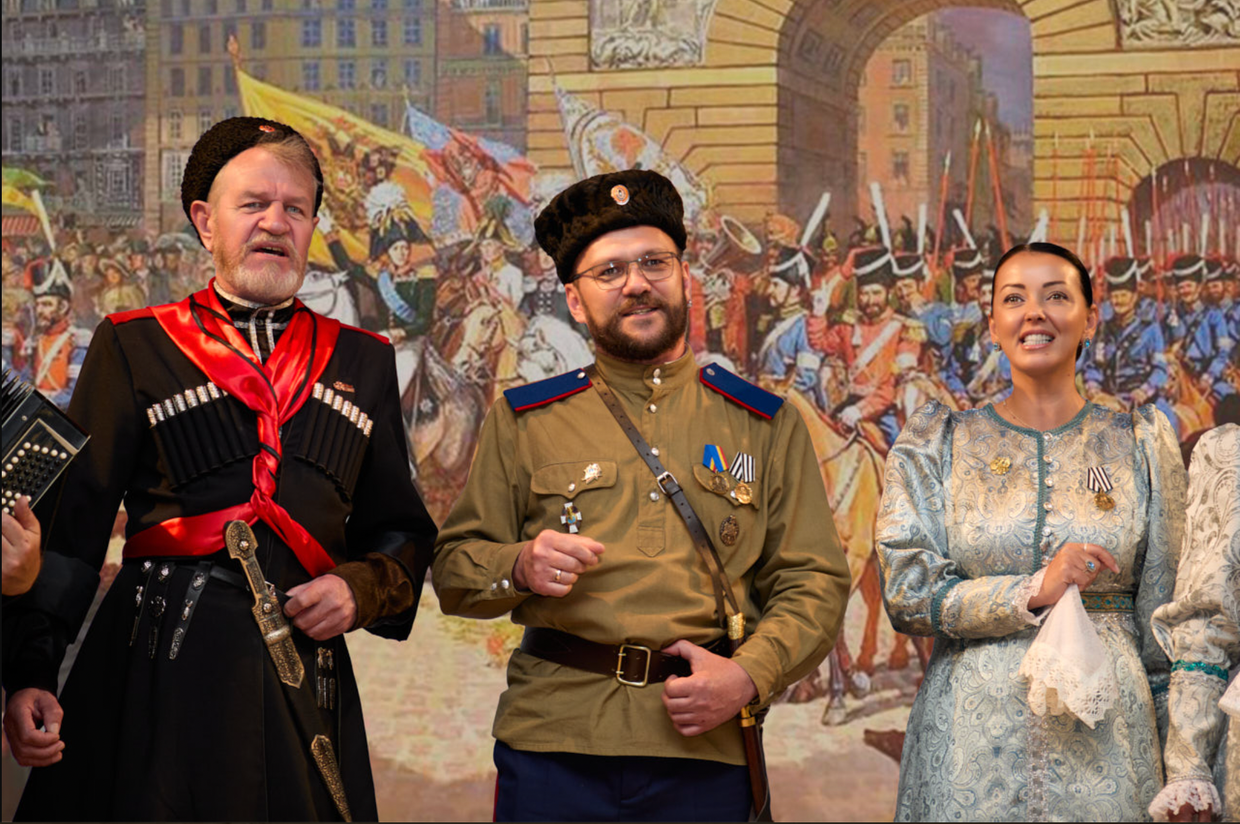
'Serious setback' for democracy — EU condemns Russia-style foreign agents law in Georgia
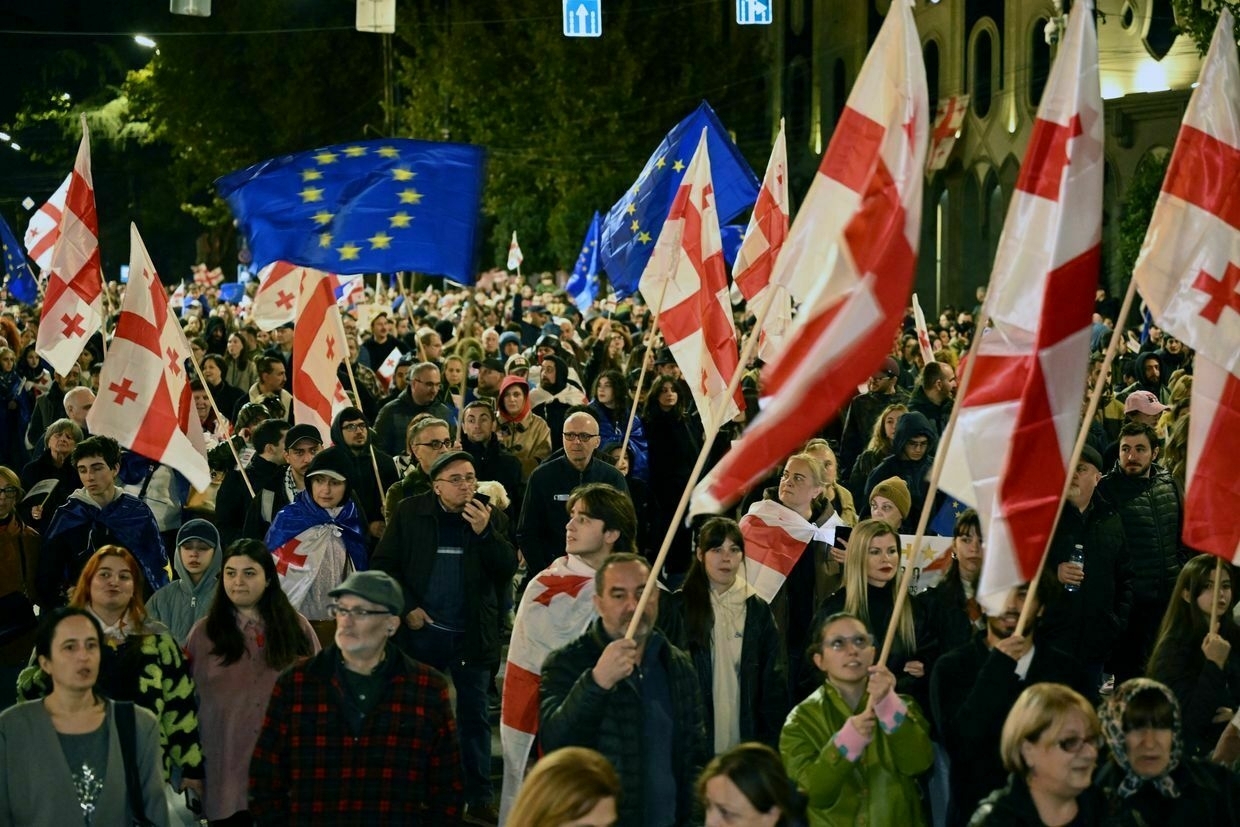
The European Union has condemned Georgia’s Foreign Agents Registration Act, characterizing it as a setback for the country’s democratic development and calling on Georgian authorities to reverse democratic backsliding.
In a joint statement published on May 31, top EU officials Kaja Kallas and Marta Kos criticized the Georgian foreign agents law, which requires civil society organizations that receive international funding to register as “foreign agents.” The law officially came into effect on May 31.
The EU called the law a “serious setback for the country’s democracy” that “represents another aggressive action by the Georgian authorities to suppress dissent, restrict freedoms, and further shrink the space for activists, civil society, and independent media."
The ruling Georgian Dream party, which currently holds a parliamentary majority, passed the contentious law earlier in April 2025, alongside other “repressive measures [that] threaten the very survival of Georgia’s democratic foundations and the future of its citizens in a free and open society."
The statement also noted that Georgia’s “accession process has been de facto halted.” Georgia first received EU candidate status in December 2023, but its accession process has been hampered by growing authoritarianism in the country.
The EU reiterated its call for Georgian authorities to heeds their citizens' demands for democracy and a European future and urged the “release all unjustly detained journalists, activists, protesters, and political leaders."
“The EU is ready to consider the return of Georgia to the EU accession path if the authorities take credible steps to reverse democratic backsliding,” the statement emphasized. “The responsibility lies solely with the Georgian authorities."
Mass protests erupted in Georgia following the contentious parliamentary elections in October 2024, in which Georgian Dream maintained its majority amidst reports of ballot stuffing, intimidation, and other electoral irregularities. Protestors have also cited the foreign agents law as a source of discontent.Georgia’s foreign agents law closely mirrors a similar law that was passed in Russia and weaponized by the Kremlin to clamp down on civil society. First introduced in 2012 and significantly expanded in 2022, Russia’s foreign agents law is yet another one of Moscow’s primary tools for suppressing criticism.
NATO officials reject Russian demand to halt expansion, media reportsAccording to NATO sources cited by Radio Liberty, the written pledge Moscow demands is unrealistic. “It’s not something they (Russia) can just get,” one diplomat said.The Kyiv IndependentAnna Fratsyvir
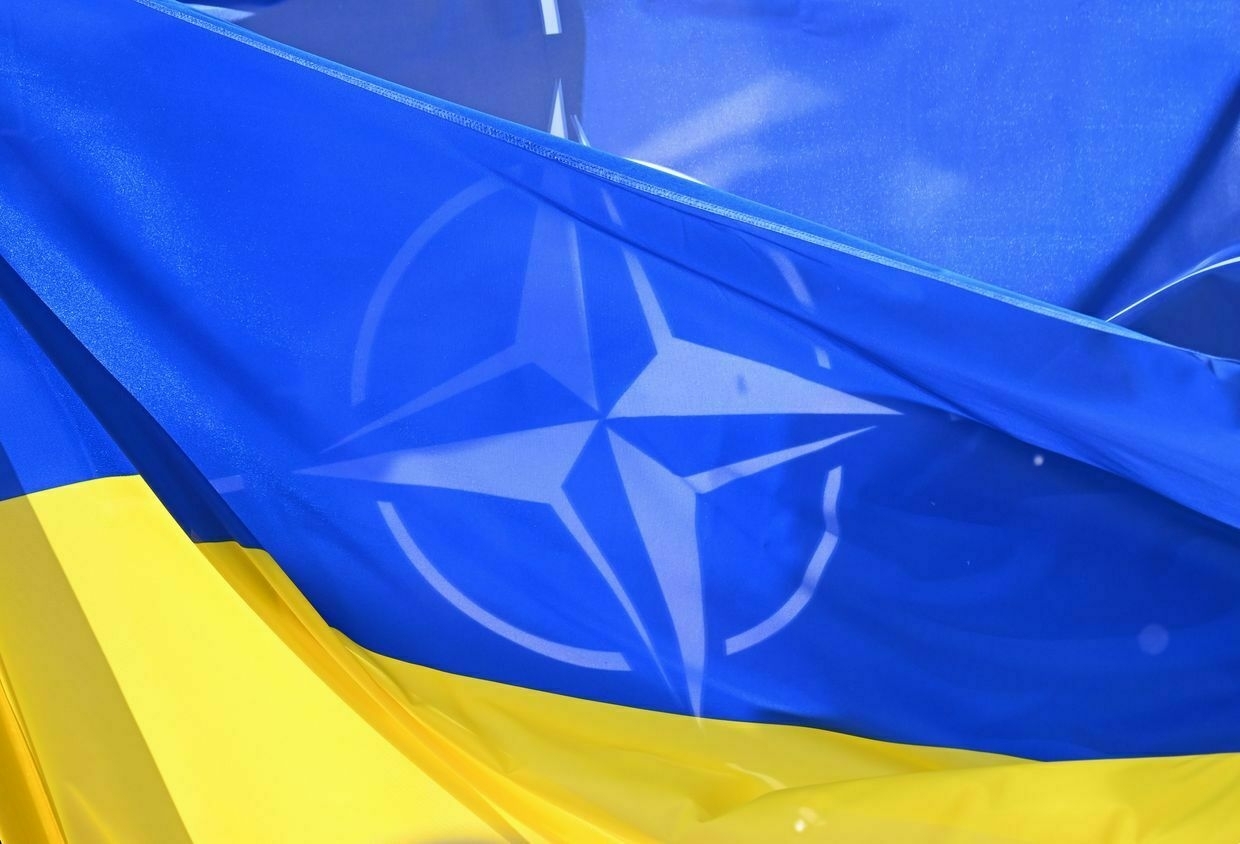
'He was kidnapped' — Georgian opposition leader detained as ruling party continues crackdown on dissent
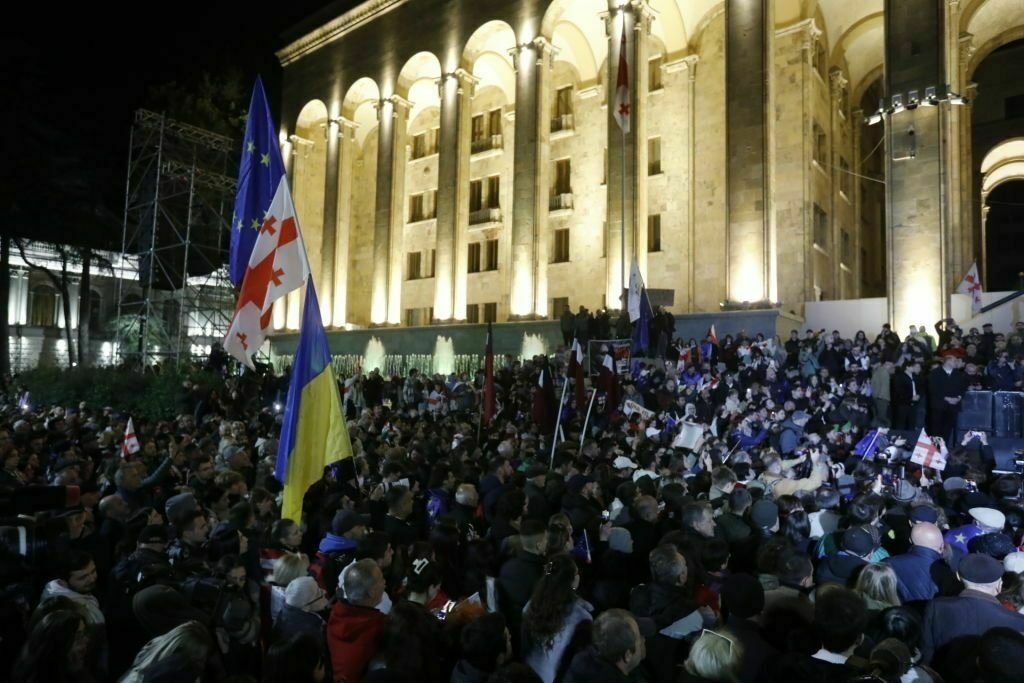
Leader of the Georgian opposition party “Coalition for Change,” Nika Melia, was detained by authorities on May 29, NewsGeorgia reported, citing Melia’s associates.
Melia is being investigated for refusing to testify before a parliamentary committee probing former President Mikheil Saakashvili’s time in power.
The opposition leader was arrested just before he was scheduled to appear on a television show, Melia’s associates said.
“I do not know what his detention was connected with. In fact, he was kidnapped. They acted aggressively and without explanation,” Melia’s lawyer, Georgy Kondakhashvili, claimed.
The ruling “Georgian Dream” party has tightened its grip on power, passing a foreign agents law similar to Russia’s. Mass protests erupted in Georgia in 2023 and 2024 in response to moves by authorities, which have isolated the country from the West.
Many opposition figures have not recognized Georgia’s ruling party, following disputed parliamentary elections in December 2024.
Melia’s commission hearing was postponed from May 29 to May 30, he has refused to attend the proceeding thus far.
Kondakhashvili claims there are no legal grounds for Melia’s arrest and says the charges were likely fabricated to forcibly bring the opposition leader to the hearing he has boycotted.
Melia does not view the parliament and commission led by the “Georgian Dream” party as legitimate, and in late April, refused to pay a bail of 50,000 lari ($18,200), NewsGeorgia reported.
Georgia’s accession to the EU has been suspended due to the actions of the ruling authorities since the spring of 2024, the European Commission said in October.
Georgia applied for EU candidate status in March 2022, following Ukraine, which applied in February 2022.
‘No one has seen it yet’ — Zelensky slams Russia for stalling on ceasefire memorandum ahead of Istanbul talks“The so-called memorandum they promised and claimed to be preparing for more than a week — no one has seen it,” President Volodymyr Zelensky said.The Kyiv IndependentAnna Fratsyvir
